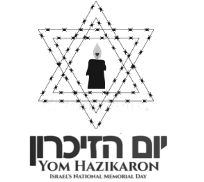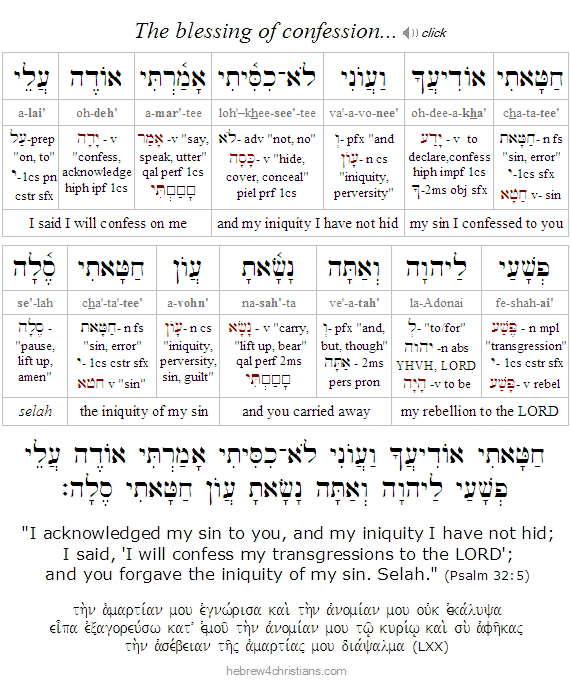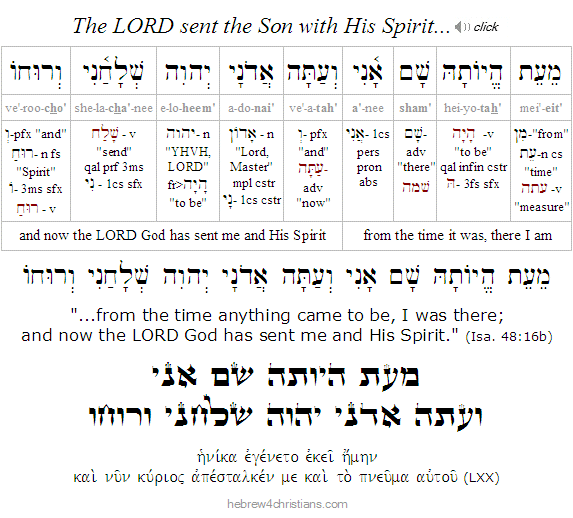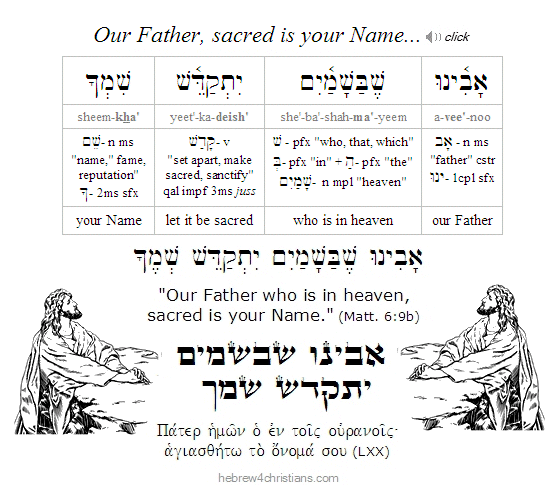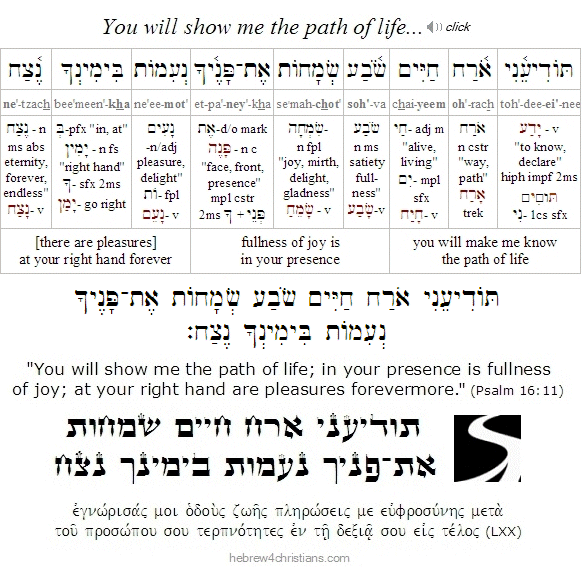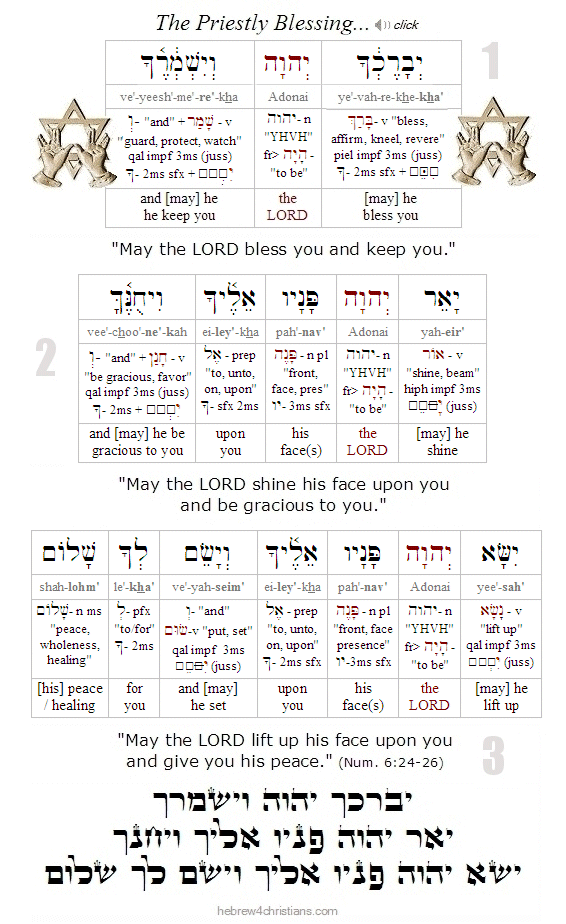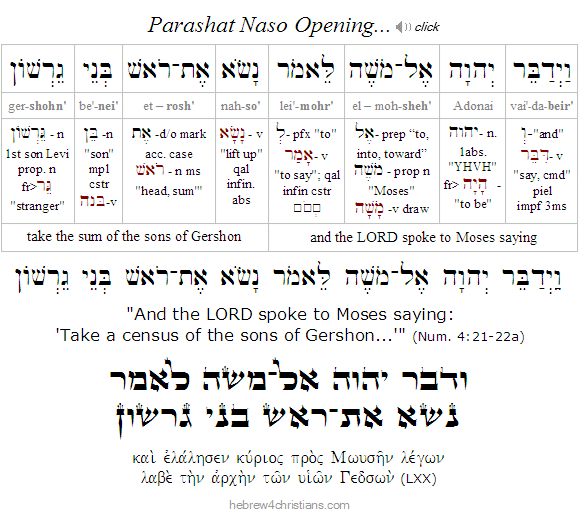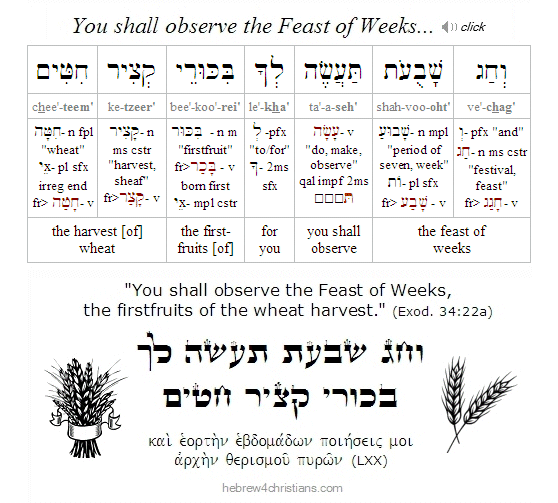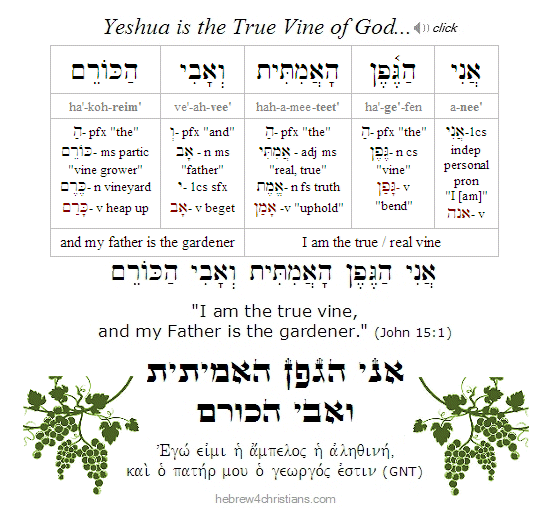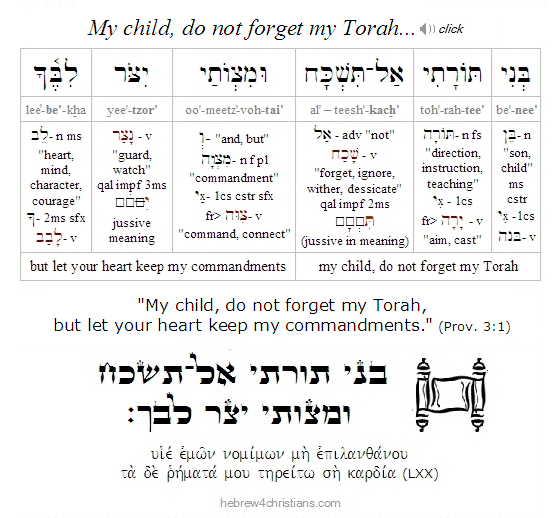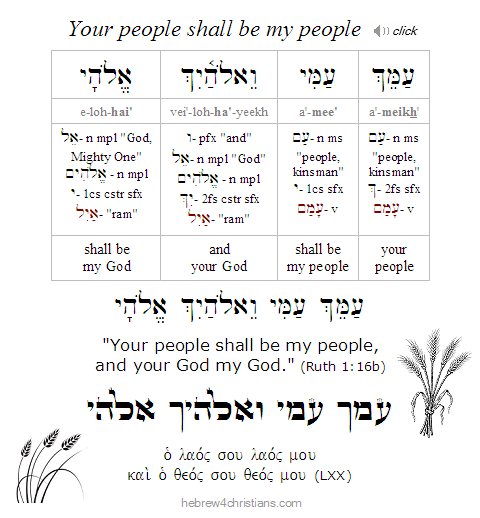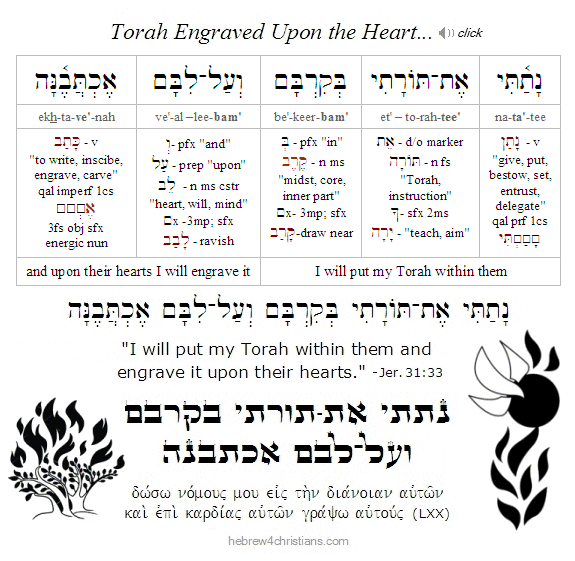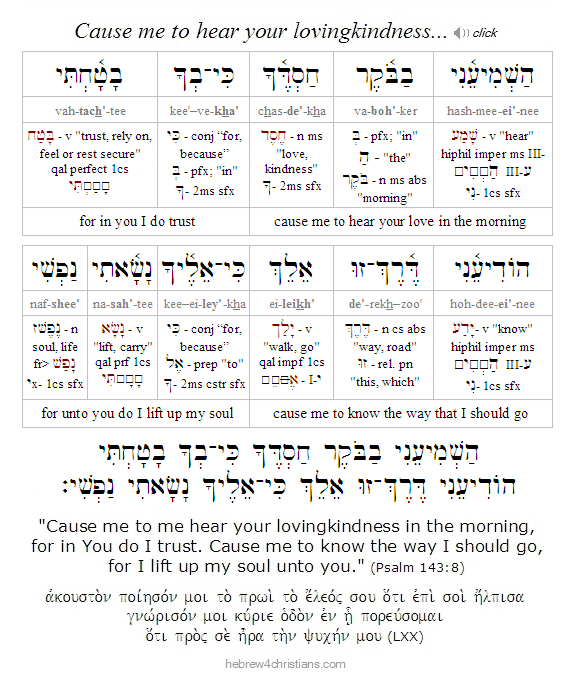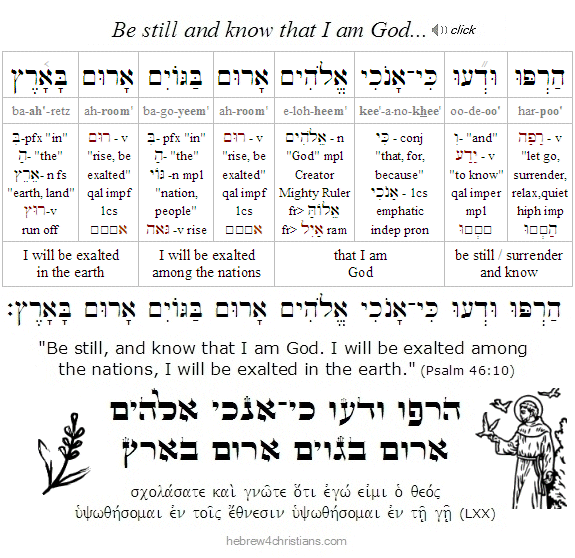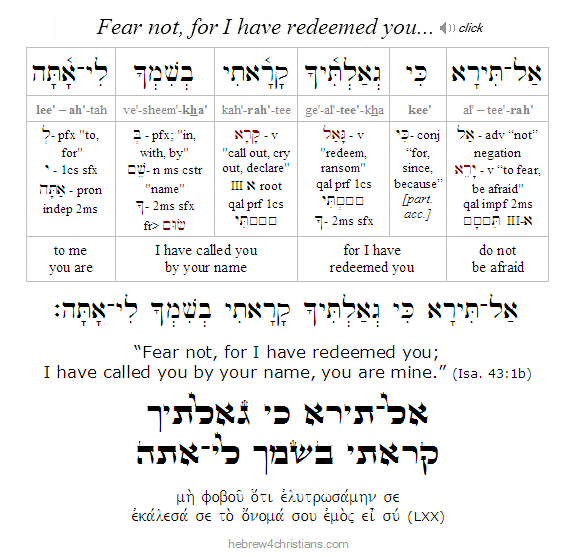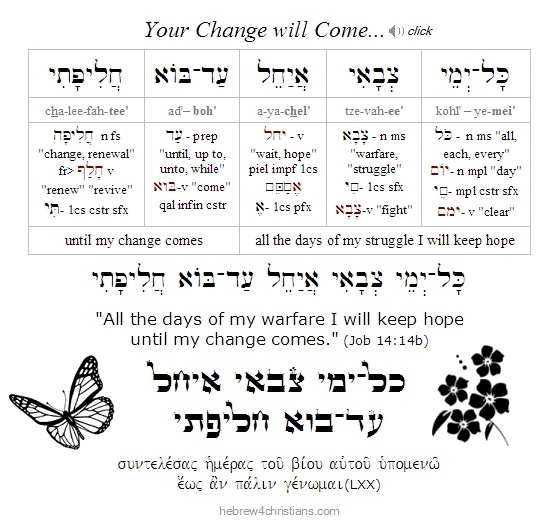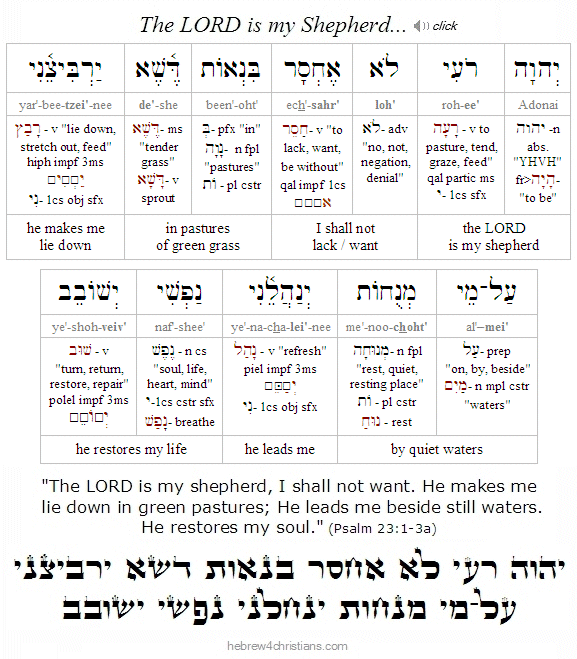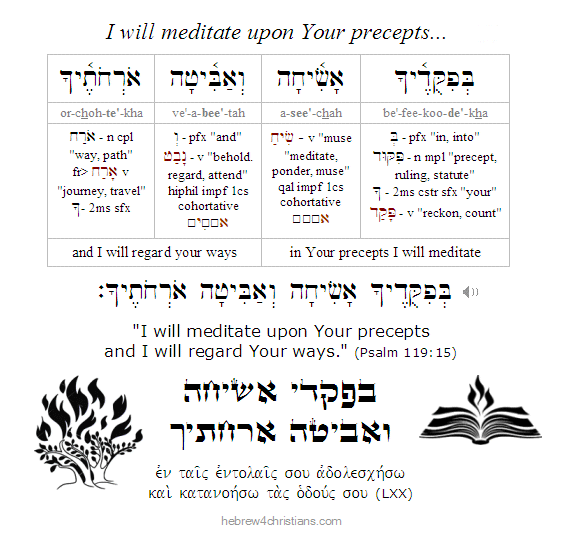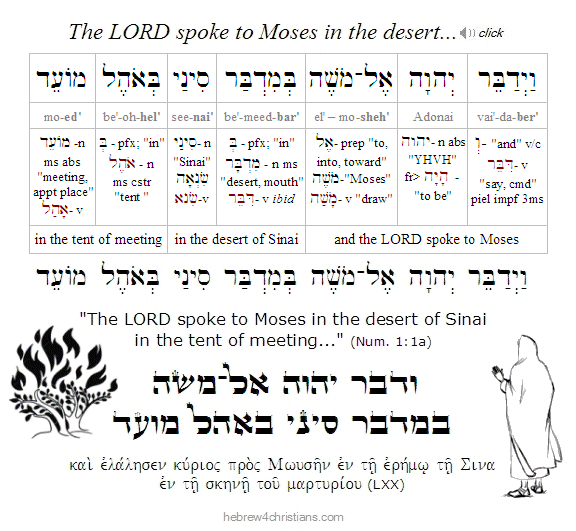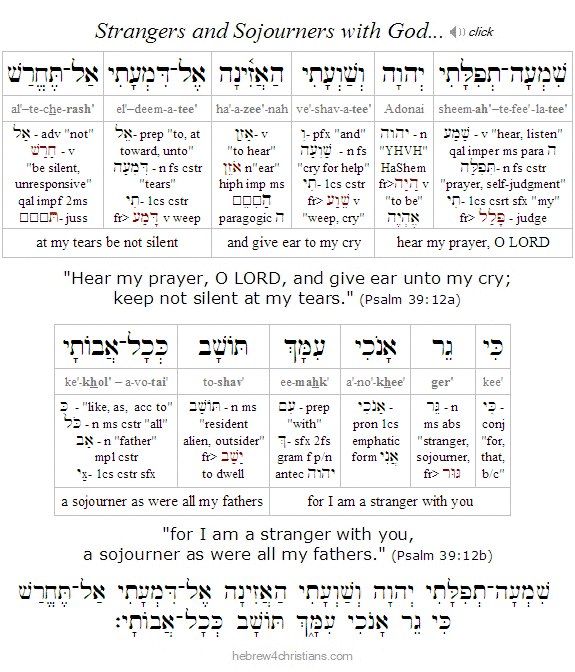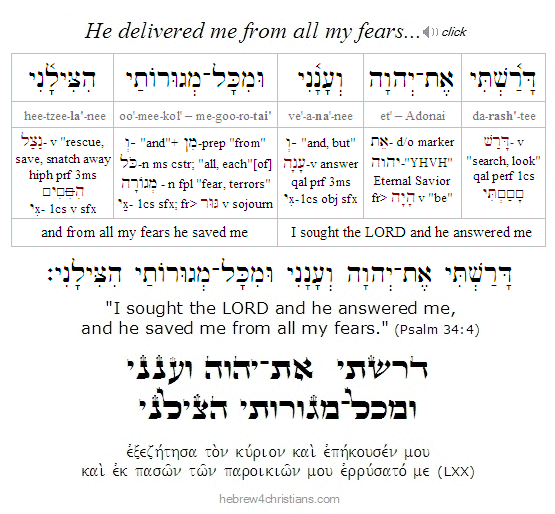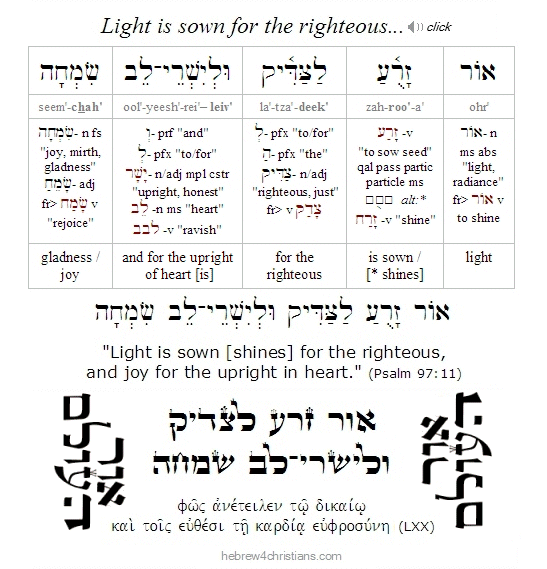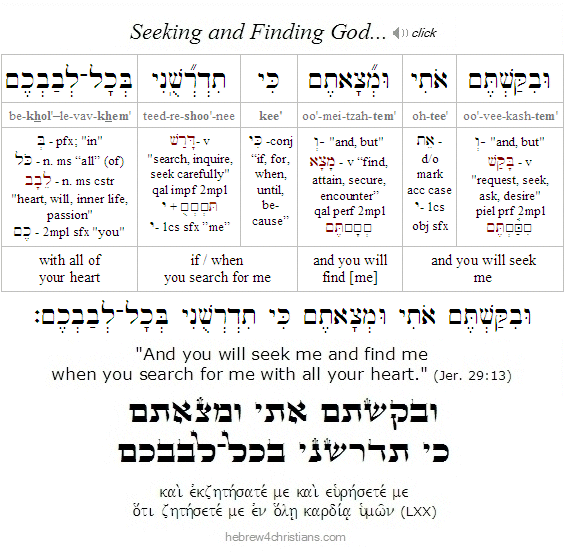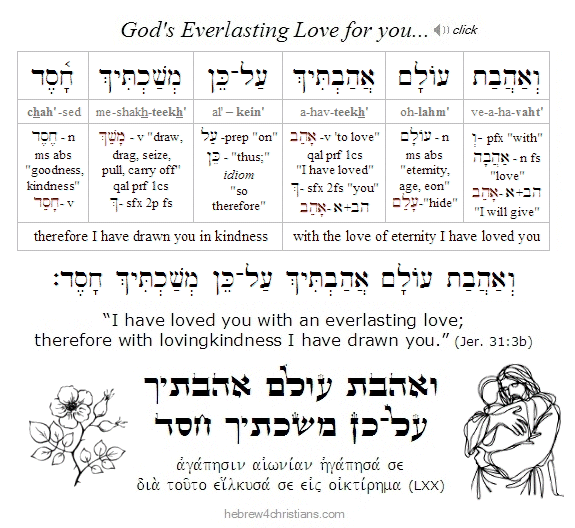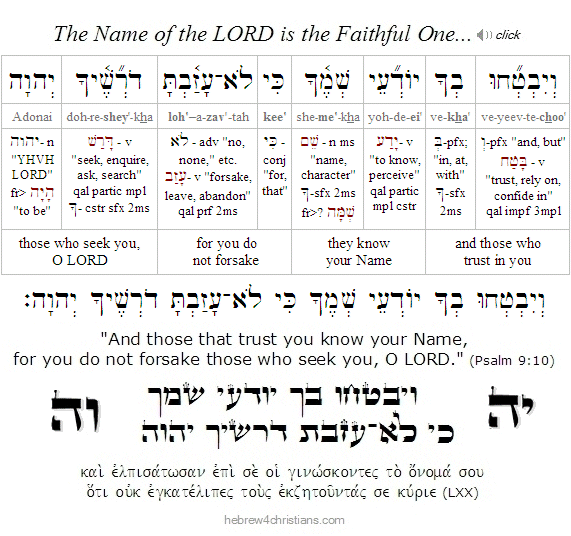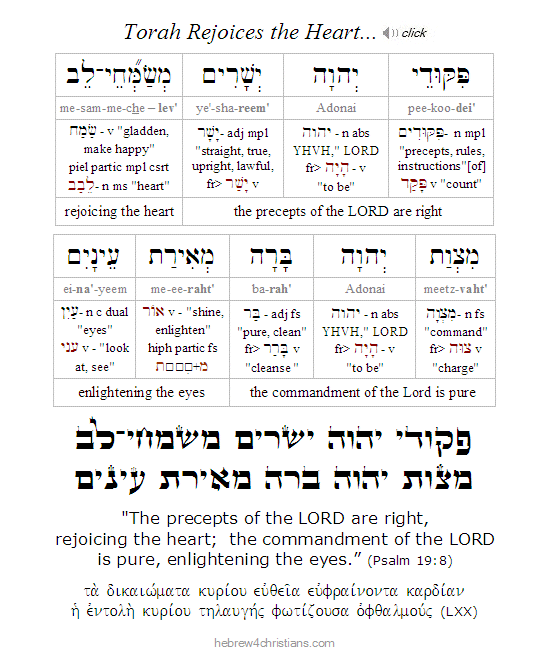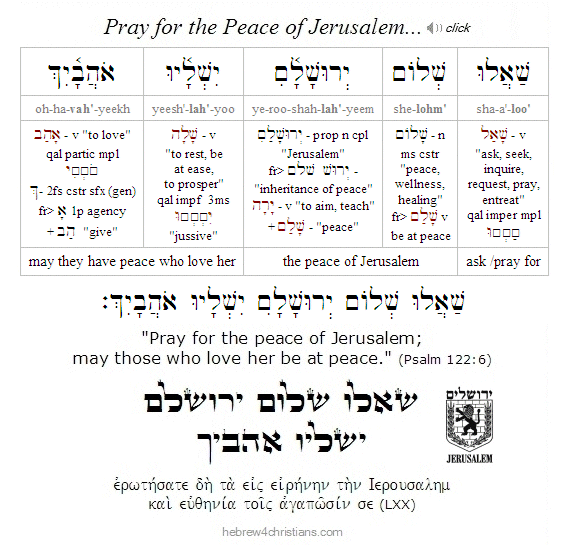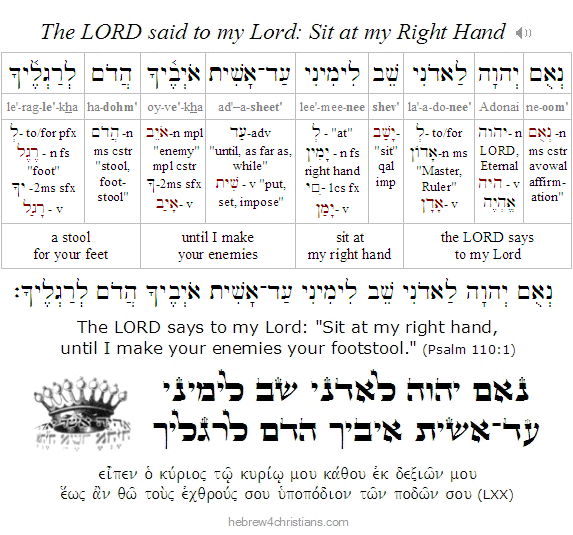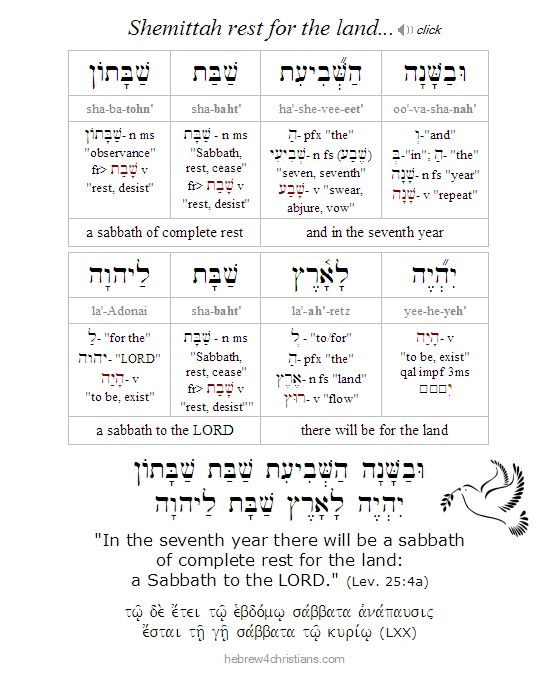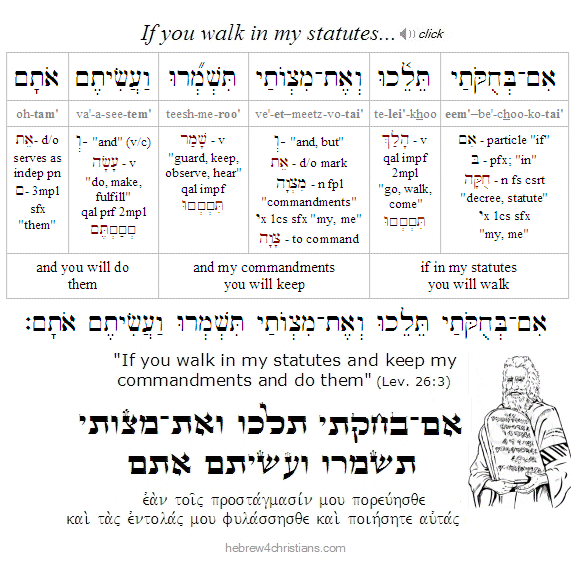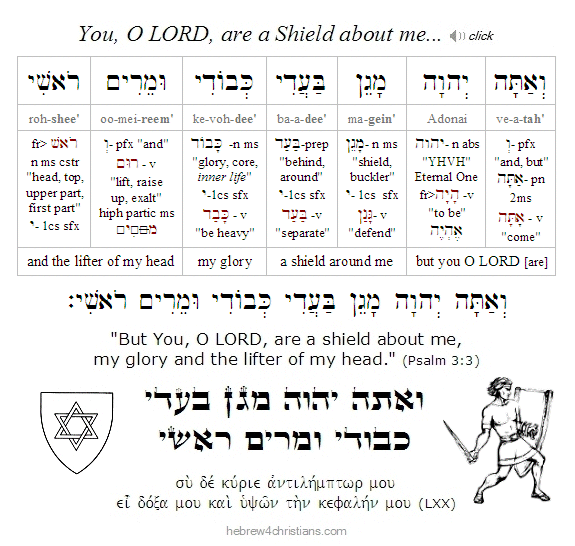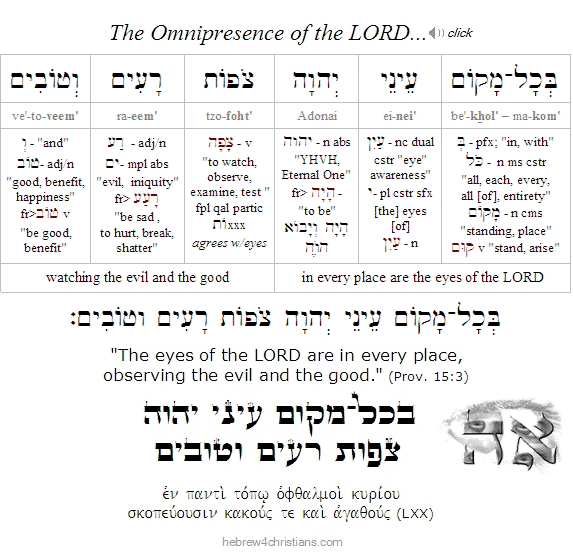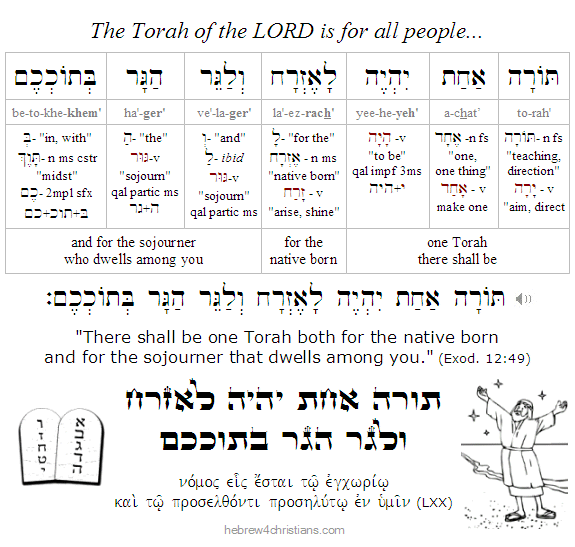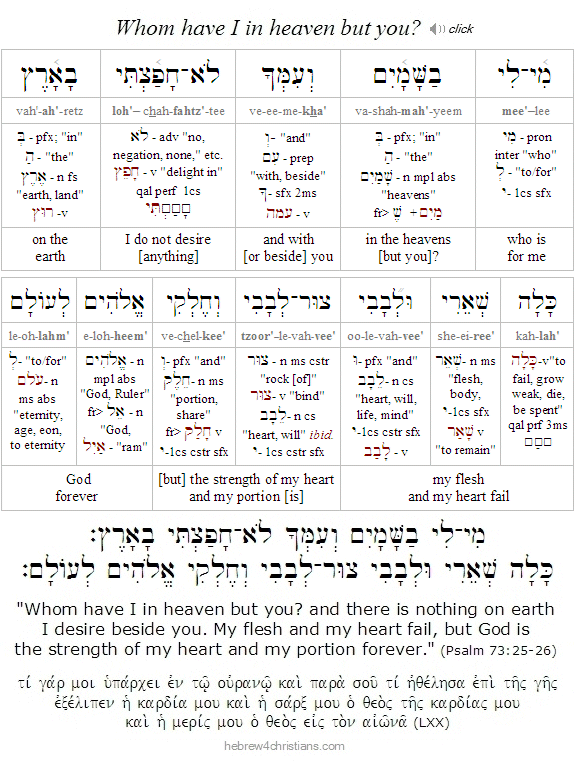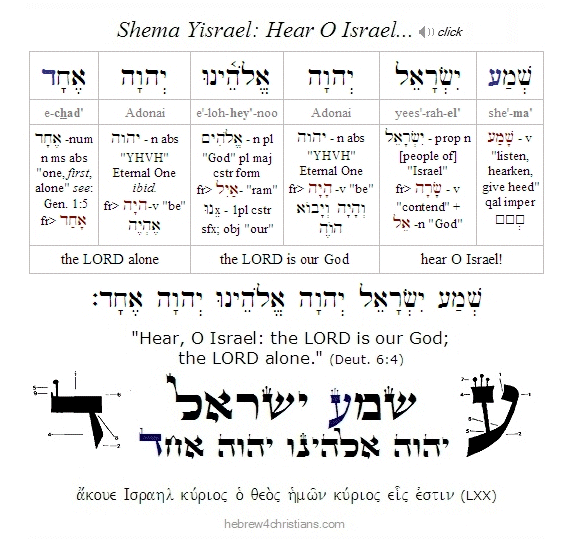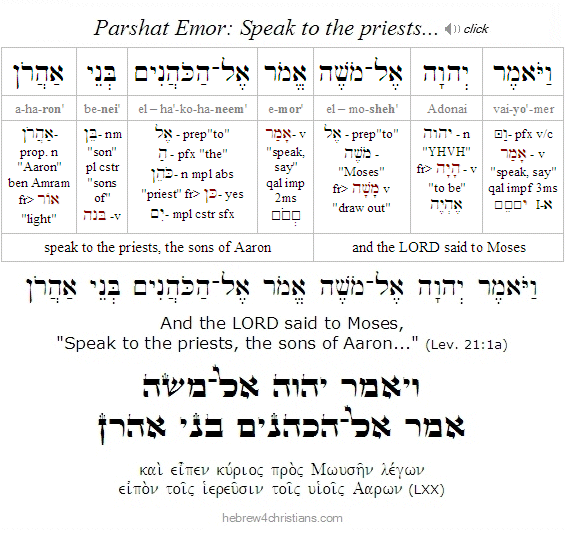|
Prayer Request (for site updates, see below)
I was laid off from my full-time job several years ago when -- after a lot of prayer, soul searching and discussion with my wife -- we decided to operate the Hebrew for Christians ministry entirely by faith in God's provision through the love and kindness of His people. I am not paid for doing this work, and therefore I ask you to consider supporting us. If you can help, please offer a donation or purchase some of the Hebrew study materials offered here. Encouraging other web sites to link here also helps us become more visible on the web. Above all, agree with us for the Lord's will to be done in our lives. Todah, chaverim.
  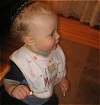  
Note: My wife and I have have three young children (Josiah, Judah, and Emanuel David ). The LORD has graciously provided for us as Adonai Yireh (יְהוָה יִרְאֶה), "the One who sees [our need]." We are living one day at a time by the grace and mercy of God, and I want to publicly praise Yeshua and acknowledge His faithful love in caring for my family -- despite the trials during this time. The LORD God of Israel is faithful and true! And to those of you who have sent us a word of encouragement or donation during this difficult time, please accept our heartfelt appreciation! Your chesed truly helps sustain us.
יהי שׁם יהוה מברך - "May the Name of the Lord be blessed."
 |
I want to offer a word of thanks for all your kindness and encouragement over the last 20+ years, chaverim... I could not be in ministry apart from the grace and love you have shown to me and my family. Thank you so much and may the great and unsurpassable blessings of the LORD God of Israel be upon you always. -John
Jewish Holiday Calendar
Note: For site updates, please scroll past this entry....
The Torah divides the calendar into two symmetrical halves: the Spring and the Fall, indicating the two advents of Messiah. The Biblical year officially begins during the month of the Passover from Egypt (called Rosh Chodashim, see Exod. 12:2), and the spring holidays of Passover, Unleavened Bread, and Firstfruits both recall our deliverance from Egypt and also our greater deliverance given by means of the death, burial, and resurrection of the Messiah, the great Passover Lamb of God. The holiday of Shavuot (i.e., "Pentecost") both commemorates the revelation of the Torah at Sinai as well as the revelation of the Ruach HaKodesh (Holy Spirit) at Zion, in fulfillment of the promise given by our Lord....
The intermediate months of summer end with the advent of the sixth month of the calendar, the month of Elul, which recalls the time Moses interceded on behalf of Israel after the sin of the Golden Calf. To commemorate this time of our history, we likewise focus on teshuvah (repentance) in anticipation of Rosh Hashanah and especially in anticipation of Yom Kippur, the great "Day of Atonement." In Jewish tradition the 30 days of Elul are combined with the first ten days of the seventh month (called the "Days of Awe") to set apart "Forty Days of Teshuvah" leading up to the Day of Forgiveness for Israel. Immediately following Yom Kippur, the mood changes as we begin preparing for a joyous week-long celebration called Sukkot (i.e., "Tabernacles") that concludes with the holiday of Simchat Torah.
 |
The Spring Holidays:

The spring holidays (i.e., chagei ha'aviv: חגי האביב) provide a portrait of the death, burial, and resurrection of the Messiah: Yeshua was crucified on erev Pesach (during the time of the sacrifice of the Passover lambs), buried during Chag Hamotzi (the festival of Unleavened Bread), and resurrected from the dead on Yom Habikkurim (the Day of Firstfruits). Fifty days after Passover, on the climactic holiday of Shavuot (i.e., "Pentecost"), the Ruach HaKodesh (Holy Spirit) fell on the believers in fulfillment of the promise given by our Lord. Note that the giving of the Holy Spirit occurred precisely according to the calendar countdown given in the Torah (Lev. 23:15-16), and that it occurred after the resurrection of Yeshua -- just as our Messiah foretold (John 16:7; Acts 1:6-8, 2:1-4). This proves that the feasts of the LORD (מוֹעדי יהוה) were not abolished after the crucifixion. The meaning of the gospel is prefigured in the holidays given in Torah. See Luke 24:27, 24:44; John 5:46; Acts 26:22, etc.
![Spring Holiday Timeline (H4C]](../../About_HFC/Site_News/roshchodeshim-line.gif) |
Kindly note that in accordance with both Torah and Jewish tradition, the following holiday dates begin at sundown (ויהי־ערב ויהי־בקר; Gen. 1:5):
- Month of Adar (Thurs. Feb. 27th [eve]) - Sat. March 29th [day])
Dates for Passover Week 2025:
Free Seder Guide
- Month of Nisan (Sat. March 29th [eve]) - Sun. April 27th [day])
- Month of Iyyar (Sun. April 27th [eve] - Tues. May 27th [day])
- Month of Sivan (Tues. May 27th [eve] - Wed. June 25th [day])
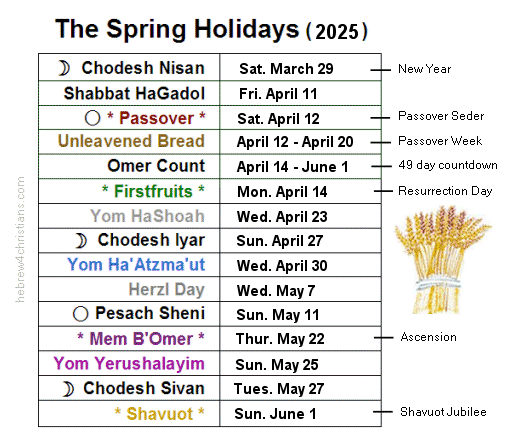 |
Note: For more information, see the Calendar Pages....
June 2025 Site Updates
Note: Please refresh the page (or press F5) to see the latest updates...
Torah of the Sotah...

06.06.25 (Sivan 10, 5785) Our Torah reading this week (Naso) mentions the strange matter of the "sotah," or a woman suspected of adultery, who was taken before the priest to give account of her behavior (Num. 5:12-31). If she formally swore to her innocence, the kohen was to prepare a "bitter water" concoction that the woman would be required to drink. The priest would then write a scroll with a curse that prophesied the woman's punishment if she lied, signed the scroll with the Name of God, and immersed it in the water so that the words of the oath would dissolve into the the drinking vessel.
The sotah was then set before the LORD and the priest again warned her that if she was guilty of adultery, she would die a painful death, but if she was innocent the waters would impart a special blessing of fruitfulness to her. Only after the woman said "amen, amen" to the terms did she drank from the cup...
In general the sages have regarded the matter of the sotah in allegorical terms. Each of us is "married" to God by covenant, and therefore our relationship with him will be tested. Though we have our ideals, we nevertheless are frail and lose sight of our deepest commitments. It is our responsibility to confess the truth about the condition of our hearts. If we stray (שָׂטָה) from our covenant with God, we will taste the bitter waters of the sotah.
Confession is essential for healing, for truth is what connects us with reality. Unsaid words, suppressed feelings, secret desires, hurtful actions, and so on, are "swallowed" by the soul and inevitably affect the heart. We cannot deny the truth without being haunted and made anxious. Regarding our relationship with God, we cannot go astray without becoming hardened and "depressed" by the weight of our own duplicity. If we persist in our denial, we lose the truth about who we are and become poisoned by the bitter waters we drink. As a "sotah," we take the name of the Lord in vain and suffer the consequences...
When the Israelites came to Marah, "they could not drink the water because it was bitter" (Exod. 15:23). Note that the Hebrew text allows us to read that it was the Israelites themselves who were bitter – ki marim hem (כִּי מָרִים הֵם) – "for they (i.e., the Israelites) were bitter," and their bitterness made the water seem so as well.... After the people complained, God showed Moses a tree and threw it into the water, making it drinkable. Interestingly the Hebrew text literally reads, "the LORD taught him a tree" (וַיּוֹרֵהוּ יְהוָה עֵץ), suggesting elon moreh (אֵלוֹן מוֹרֶה), the "teaching tree of Abraham" (Gen. 12:6). The sages say this tree symbolized Torah, the tree of life (etz chaim), which brings happiness to those who take hold of it (Prov. 3:18), though we see Yeshua, the fallen tree that yields mayim chayim - living water - to revive the hearts of all who will receive his remedy.
If we find ourselves inwardly sick, barren, and lifeless, we need to turn back to the Lord and reaffirm our need for truth and love. Only God can heal the depths of our brokenness. The parable of the sotah is intensely personal, exposing the depths of who we are in relationship with God. It's revelation is meant to lead us back into the blessing of the life of his love.
Hebrew Lesson
Psalm 32:5 reading (click for audio):
The Ultimate Reality...

06.05.25 (Sivan 9, 5785) The revelation of God in Yeshua means that Ultimate Reality -- that is, the transcendental Source of all that exists -- is intensely personal, intimately knowable, and full of love. "Metaphysics" (i.e., that which is "really real") is therefore not about an impersonal force known in objective relationship (i.e., a "what") but a personal agency and creative mind known in subjective relationship (i.e., a "who"). The Scriptures teach that what is ultimately real (אהיה אשׁר אהיה) is the Ultimate Person of the LORD (אני יהוה). In Him we "live and move and have our being" (Acts 17:28).
The LORD who is the Most High, the possessor of heaven and earth, is not only the Creator and Sustainer of all possible worlds, but the Lover and Redeemer of our very souls -- the One who empties himself to become "with us" and who overcomes the sickness of death for us... The climactic expression of the character of Ultimate Reality is revealed at Golgotha, the "place of the skull," where God's sacrificial life in Yeshua destroyed death by the greater power of divine love (Psalm 85:10). The heart of our Lord as he suffered and died for our sins reveals the great compassion of God; it is "ha'makom" (הַמָּקוֹם) the place of his atonement for us; his hidden dark cloud, and his resurrection glory reveals our deliverance for death. God loves us despite knowing all of our sins and yet redeems us from its curse...
We "connect" with the truth of who God is by the instrumentality of faith, and the essential question is whether we are in a "trusting relationship" with God or not, for if we do not truly know God as our loving Savior, we remain lost, in darkness, and alienated from the life of God. Faith is self-authenticating as we experience grace in the exercise of our trust in God.
Practically speaking, our relationship with God "shows up" in our lives by means of the various choices we make, though particularly in our moral choices. That's because righteousness is "ontological," or grounded in what is real. Since God is righteous, doing acts of righteousness enables us to partake in God's life and passion (1 John 2:29). On the other hand the practice of sin deadens us and turns us away from God's Presence...
Love is essentially relational, and therefore the Scriptures reveal God as being in relationship both with others within creation, but also within himself - the One God is unity in plurality of relationship: Father, Son, and Holy Spirit (John 17:24). The "I AM" of God (Being) is also known in the "Thou Art" of God (Doing). God is not only the Eternal Lover but also the Eternal Beloved, and the bond of that love is the Spirit of God "hovering above the depths." "Draw near to me, hear this: from the beginning I have not spoken in secret, from the time anything came to be there I AM, and now the Lord GOD has sent me, and his Spirit" (Isa. 48:16). Note in this verse the transpersonal unity of the Godhead....
Now while the Torah certainly affirms that "God is one" (יהוה אחד), note that the word "one" (i.e., echad: אֶחָד) means something more than merely numerical identity (i.e., yechidut: יְחִידוּת) but instead unity in plurality, a "transcendental oneness" that points to the unfathomable mystery of the Name YHVH (יהוה) and the ineffable Godhead (אֵין סוֹף). Moreover, echad primarily means "first" in order or preeminence, for example when the Torah describes the "first day" of creation not as "yom ha'rishon" (יום ראשון), but as "yom echad" (יוֹם אחד; Gen. 1:5). That is why the Shema is not an affirmation of the "mystical pantheistic unity of all things" but rather that the LORD our God is preeminent and alone worthy of our worship and trust. "Hear, O Israel, the LORD our God is one LORD (i.e., unity of the godhead) the LORD alone (i.e., God is first, primary, central, and our greatest good). "God is love" means that he is the Lover, the Beloved, and the Communion of true love
The doctrine of the tripartite-yet-one divine nature (השילוש הקדוש) is not known apart from the revelation of Yeshua, and it is an essential part of His message of redemption to us (see John 17:3). In other words, if you believe that Yeshua embodies and reveals the "Who" of Ultimate Reality, then you will accept his teaching that God is expressed in relationship - the Son in relation to the Father and to the Holy Spirit, and that these three are "echad," or one... "The Father has borne witness of me; whoever has seen me has seen the Father" (John 5:37; 14:9); "I and the Father are one"; "before Abraham was, I am..." "who is the liar but he who denies that Yeshua is the Messiah? This is the antichrist, he who denies the Father and the Son" (1 John 2:22). Believers in the Lord are commissioned to go and make students or learners (תלמידים) of all the nations, baptizing them (i.e., identifying them) in the name of the Father, and the Son and the Holy Spirit" (Matt. 28:19).
Hebrew Lesson
Isaiah 48:16 reading (click):
Truth of the Inward Being...
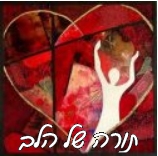
"Strive to enter in (᾽αγωνίζεσθε εἰσελθεῖν) at the narrow gate: for many, I say to you, will seek to enter in, and shall not be able." - Yeshua (Luke 13:24)
06.05.25 (Sivan 9, 5785) It is written in our Scriptures: "As a man thinks in his heart, so is he." We often see what we want to see more than what is really there. That's called wishful thinking. We overlook much, and we often ignore what might challenge our own preferred interpretations. For example, we may think that we are trusting God for our lives, but we worry, we fret, we attempt to control others, we get angry, and so on. We have a blind spot regarding the question whether we are really trusting God, perhaps because earnestly questioning what we actually believe seems too threatening (John 16:31-32). After all, what if we were to discover that don't really know what it is that we believe? Or what if we struggle to believe beyond our prejudices? What if we are confused? What does that say about who we are? So we ignore the real problem (namely, our lack of truth, our deficient faith in God, the fear of what we really are) and go one thinking we are something we are not. In short, we fool ourselves at the expense of truth.
This is a tragic and common failing of human nature. During the Nazi years, many ordinary Germans flatly refused to believe reports of atrocities at the death camps because it was too costly to discover the truth (the same might be said about any patriotic citizens who rationalize the actions of their government regardless of the moral issues involved). By willfully hiding from the facts, we pretend we are not responsible, and therefore we justify passivity in the face of injustice and evil.
Yeshua warned that the time would come when those who kill others will delude themselves into thinking they are doing God a favor (John 16:2). Think of how massively self-deceived such a thing is as that -- to murder someone as a so-called service to God! Many of the biggest enemies of the truth are often those who think they are doing God such "favors."
Hebrew Lesson
Psalm 51:6 reading (click):
Often, however, the truth "of the inward being" is gained at the expense of heartache, for surely the heart must ache, tremble, and despair before it comes to accept the truth about its condition. This sort of truth is "existential," meaning that it is known only through the process of living life itself. As Kierkegaard said, "There are many people who reach their conclusions about life like schoolboys: they cheat their master by copying the answer out of a book without having worked the sum out for themselves." Yes, and they cheat themselves, too, since they somehow believe that "knowing the answer" given by another is the same thing as "knowing the answer" of their own inward being... Kierkegaard continues this thought: "The truth is lived before it is understood. It must be fought for, tested, and appropriated. Truth is the way... you must be tried, do battle, and suffer if you are to acquire truth for yourself. It is a sheer illusion to think that in relation to truth there is an abridgment, a short cut that dispenses with the necessity of struggling for it."
A man who was afflicted with a terrible disease complained to Rabbi Israel that his suffering interfered with his learning and praying. The rabbi put his hand on his shoulder and said, "How do you know, friend, what is more pleasing to God - your studying or your suffering?" (Buber: Hasidim).
In Biblical Hebrew the idea of "inward being" (i.e. tuchot: טֻחוֹת) refers to the "kidneys" which were thought to be "the reins" or the concealed source of the will within the person (i.e., te'ach: טִיחַ). Interestingly, the word te'ach comes from the verb tachah (טָחָה) that means to "shoot with a bow," alluding to the idea of inner Torah as a directive power. God wants purity of the heart – passion, singleheartedness, and earnestness – as we live and practice the truth. God wants "the inner parts," the concealed parts of the soul, to be filled with his Torah, and therefore David asks God to make him to know wisdom there - in the "secret heart" - so that he might apprehend God's truth and do teshuvah that purifies the heart.
Sin and Insanity...
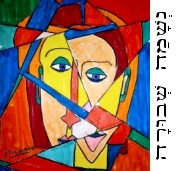
06.04.25 (Sivan 8, 5785) From our Torah reading this week (i.e., parashat Naso) we read, "If any... goes astray and breaks faith..." (Num. 5:12). The sages comment that the Hebrew for "goes astray" (i.e., tisteh: תִשְׂטֶה) is written so it may also be read as "goes insane" (i.e., tishteh: תִשְׁטֶה), and concludes that sin is a form of insanity, that is, a denial of what is real, and therefore a state of delusion.
We are required, as a matter of our faith in the truth of Holy Scripture attested by the Holy Spirit, to believe that God is knowable (Rom. 1:19-20), that we are always in His presence (Prov. 15:3; Psalm 94:9; 139), that He is all-knowing or omniscient (Psalm 147:5), and that nothing can be hidden from Him (Isa. 40:28; Jer. 23:24; Heb. 4:13), but when we sin, we "break from" this reality and deny the divine Presence by a perverse act of self-exaltation.
Whenever we imagine that we are unseen by God or whenever we "forget" that we live, move, and have our being in His presence, we are denying reality (Psalm 14:1). Our sin causes us lose sight of what's real: we forget who God is; we forget who we are; and we exile ourselves from the Source of life... Surely sin is a form of insanity, and therefore we have a moral and spiritual obligation to think clearly and to value truth.
As Rabbi Judah would say, "Contemplate three things, and you will not come to the hands of transgression: Know what is above from you: a seeing eye, a listening ear, and all your deeds being inscribed in a book" (Pirke Avot 2:1). Therefore "fear God and keep his commandments, because this is the whole duty of man. For God will bring every deed into judgment, with every secret thing, whether good or evil" (Eccl. 12:13-14).
Friends, may we "set the LORD always before us" so that we will not be shaken by losing sight of what is real (Psalm 16:8).
Hebrew Lesson
Psalm 19:12 reading (click):
The Paradox of Moses...
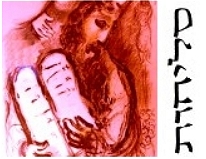
06.03.25 (Sivan 7, 5785) Our Torah portion for this week (i.e., parashat Naso) ends with these amazing words: "And when Moses went into the Tent of Meeting (i.e., the Mishkan) to commune with the LORD, he heard the Voice (הַקּוֹל) speaking to him from above the mercy seat (i.e., kapporet: כַּפּרֶת) that was upon the Ark of the Testimony, from between the two cherubim; and there the LORD spoke to him" (Num. 7:89).
Now Moses was truly an extraordinary and wonderful person -- Israel's first great prophet, priest, and king. His life can be divided into three great distinct periods of 40 years each. First, he was raised as an Egyptian and lived as a prince of Egypt (the Egyptian period); second, he fled to the land of Midian where he became a shepherd and encountered God in the desert (the Midianite period); and third, after the great deliverance from Egypt, Moses led the people back to Sinai where he 1) became the mediator (priest) of the covenant between God and Israel, 2) legislated the various laws of the Torah, and 3) received the prophetic vision of the Tabernacle, the future exile, and the ultimate glory of Zion.
Notice, however, that Moses was extraordinary in the sense that he transcended the entire system of religion that was later established as "Judaism." First, as the great legislator, Moses stood outside of the law, serving as its voice of authority. Second, as the high priest of Israel, Moses instituted various sacrificial rites before the laws of sacrifice were enacted. For example, he instituted the Passover sacrifice in Egypt (Exod. 12:1-11), and when the people later reached Sinai, he offered blood sacrifices to ratify the terms of the covenant (Exod. 24:8). Moreover, he ascended the mountain and received the prophetic vision of the Sanctuary before the priesthood had been instituted in Israel (Exod. 25:8-9). And even after the laws of the priests were enacted and the Tabernacle was erected, Moses was allowed to go before the very Holy of Holies to hear the Voice of the LORD, even though technically speaking this was forbidden, since Moses was not a kohen (i.e., descendant of Aaron).
I mention this because some Jewish people stumble over the fact that Yeshua, who was from the tribe of Judah, served as Israel's High Priest of the New Covenant. Of course this issue is addressed in the Book of Hebrews, where the role of the Malki-Tzedek priesthood is ascribed to King Yeshua (Heb. 5:6-11; 7:1-19), but it is important to realize that Moses himself foresaw the coming of the Messiah as Israel's great prophet, priest and King (Deut. 18:15-19; John 5:36). Indeed, just as Moses himself was "outside" the law by serving as Israel's priest but nevertheless was commissioned by God Himself, so also with Yeshua, who instituted the sacrifice of His blood as the Lamb of God and who went directly before God's Throne to intercede on our behalf.
Like the patriarch Joseph before him, Moses was a "picture" of Yeshua in various significant ways. Though he was a Jew from the tribe of Levi, he appeared as a "prince of Egypt" to his own people and was educated in all the wisdom of the Egyptians (Acts 7:22). And though he was God's chosen deliverer, Moses was initially rejected by the Israelites and then turned to the Gentiles, taking a "foreign" bride. After being severely tested in the desert, he was empowered by God's Spirit to become Israel's deliverer for their hour of great tribulation. Indeed, both Moses and Yeshua were "sent from a mountain of God" to free Israel; both revealed the meaning of God's Name; both spoke with God "face to face." Moses was sent from (physical) Mount Sinai in Midian; Yeshua was sent from a spiritual "Mount Zion" in Heaven (Heb. 12:22). The New Testament relates that Moses and Elijah later met with Yeshua to discuss His "departure," literally, "His Exodus" (τὴν ἔξοδον αὐτοῦ) that he would accomplish at Jerusalem to redeem the entire world (Luke 9:30-31).
Hebrew Lesson
Deut. 18:15 reading (click):
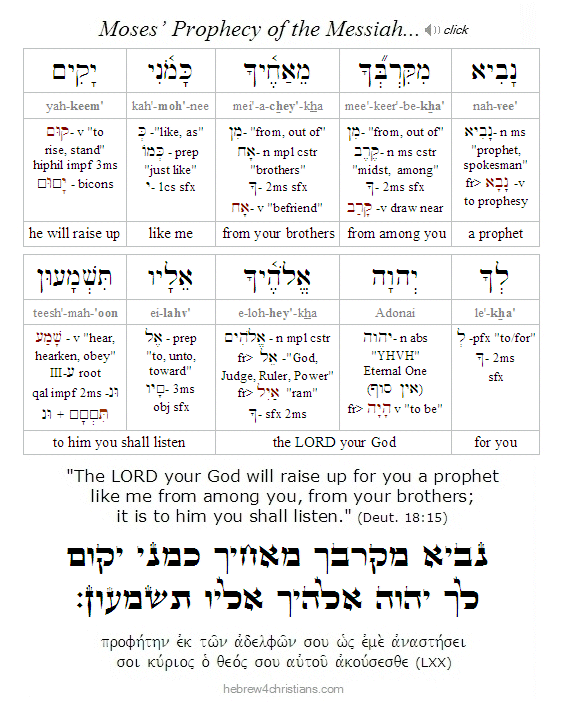 |
Moses foretold of the coming Messiah who would resemble him in many distinctive and remarkable ways. For more on this subject, see:
Teach us to Pray...
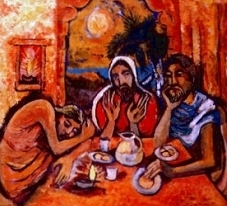
Prayer is not what is done by us, but rather what is done by the Holy Spirit in us.
06.03.25 (Sivan 7, 5785) There is only once place in the New Testament where the disciples asked Yeshua to teach them something, and that was when they said, "Lord, teach us to pray" (Luke 11:1). Yeshua then responded by giving them a pattern of prayer that's been called "the Lord's Prayer," though it's better to think of it as a model for prayer instead of a formulaic petition to recite. After all, the disciples asked "Teach us to pray," not "teach us a prayer," as if a special prayer could serve as a sort of incantation to propitiate God.
Yeshua points us to the Father. He did not suggest using Pharisaical expressions such as "Barukh attah Adonai," "Ribbono shel Olam," or "Elohei Avoteinu," nor did he endorse praying three times a day as decreed by the elders of the Great Assembly. No, Yeshua taught us to come to God using the simple word "Father." This is the language of familiar intimacy that expresses the trust a young child has for his earthly father.
So Yeshua teaches us to pray in heartfelt confidence that God is our caring heavenly Father, and this implies that we understand and regard ourselves as his beloved children. We have access to God's heart in a direct and meaningful way.
As God's beloved children, we are to honor and our heavenly Father and to esteem his will and vision for our destiny. "Holy is Thy name"; "Thy will be done"; "Thy kingdom come" - all these matters come before requests for our "daily bread" -- and even before matters of our need for forgiveness of sin. Our course God cares for our daily needs, our forgiveness, our deliverance from evil, and so on, but Yeshua concentrates our focus on the Father and our identity as his children first of all. Da lifnei mi attah omed: "Know before whom you stand."
Regarding our personal petitions, it is wise to understand that your Heavenly Father gives what you need, not what you may want at the time. "Ask and it shall be given you" means "keep on asking" (Luke 11:9). If a recurring request seems to go unanswered, remember that initial barriers are not necessarily refusals but are meant to yield what is best for you (Rom. 8:28). We can be confident, however, that God hears us when we pray and that he gives "good gifts" to those who ask Him (Matt. 7:11) -- in particular, gifts of the Holy Spirit (Luke 11:13). God gives wisdom to those who ask for it (James 1:5) and imparts the "spirit of wisdom and revelation to know him better" (Eph. 1:17). If we ask in accordance with his will, we have confidence that he will act on our behalf (1 John 5:14-15). These are "spiritual blessings in heavenly places" representing the deepest need of our hearts.
We are instructed to "present ourselves to God as those who are alive from the dead" (Rom. 6:13), indicating that we are to come confident of his acceptance because of what Yeshua has done on our behalf. We are "crucified with Christ" (Gal. 2:20) and share in his resurrection life. In the Torah the "daily sacrifice," or korban tamid (קָרְבַּן תָּמִיד), was offered to the LORD every morning and evening upon the altar, which corresponds to being a "living sacrifice" (i.e., korban chai: קָרְבָּן חַי) to the LORD (Rom. 12:1-2). We are to "pray without ceasing," which means living what we believe in all that we do. We take up our cross daily (Luke 9:23). We come "boldly" before the throne of grace. We are made "alive from the dead" to access God's presence and heart for us at all times. We have been made new creations, members of God's household, esteemed, eternally beloved....
Take my soul and body's powers;
take my memory, mind and will;
All my goods, all my hours;
All I know, and all I feel;
All I think, or speak, or do;
take my heart - and make it new.
- Charles Wesley
Hebrew Lesson
Matthew 6:9b reading (click):
Finding the Path of Life...

06.03.25 (Sivan 7, 5785) Consciously or not, every day billions of people all over the world are seeking that which will satisfy their heart's deepest longings for unending life, unbounded joy, and abiding pleasure. As C.S. Lewis pointed out, this ultimate longing for life is a "message" from another world.
Some believe that life consists of a series of sensual pleasures – eating, drinking, romance, sexual relations, etc., while others attempt to "lose themselves" in various kinds of entertainment. However, such fleeting moments of pleasure invariably cause an inward fragmentation of the soul, thereby weakening the will and inducing a state of forgetfulness regarding the deepest needs of life.
Others are deluded into attempting to find life by means of creating a "legacy" for themselves. To earn respect, to experience fame, or to be heroically remembered is considered the goal of life. However, as Shakespeare poignantly reminds us, human history is at best a "tale told by an idiot, full of sound and fury, signifying nothing."
Still others hope to find life through various placating religious rituals and practices. In Orthodox Judaism, for example, the Orach Chayim is a handbook that meticulously provides a set of rules and regulations regarding sleeping, waking, wearing clothes, reciting blessings, observing Sabbath and the holidays, and so on. The path of life, according to the religionist, is the performance of various ritual acts in order to attain God's approval and blessing.
In Psalm 16:11 we read: "You will show me the path of life; in your presence is fullness of joy; at your right hand are pleasures forevermore." The verb translated "you will show me" is a hiphil (causative) form of yada' (to know) and could better be translated "you will cause me to know," indicating that God is active in the knowing process. Here King David, despite the anxiety he felt regarding death, voiced his trust that God's love would personally intervene to deliver him from the prospect of physical corruption in the grave (v10).
From the New Testament, we know that this verse ultimately refers not to David (who eventually died), but to Yeshua the Messiah, the greater Son of David (Mark 12:35-6, Psalm 110:1). Peter cited this verse in his Pentecost sermon (Acts 2:25-28), as did Paul at Antioch (Acts 13:35-37). Despite the grisly prospect of the crucifixion, Yeshua trusted that God, by raising him from the dead, would not allow him to suffer corruption (Matt. 16:21).
Interestingly, the Hebrew word netzach ("forevermore") denotes both "victory" and "eternity," and reveals that Yeshua's resurrection provides the everlasting victory over the sting of death itself. Yeshua is forever enthroned at the very side of the Majesty on High as the "Key Holder" to life and death (Rev. 1:18).
The ultimate longing we have in our hearts is really a message from God – to come to Him to have our deepest needs met. The true orach chayim is only found in a personal, trusting relationship with the resurrected Savior - Yeshua the Messiah (John 14:6). When we receive the message of His gracious love, our heart's deepest longings will be truly satisfied. We will experience fullness of joy in God's loving presence, and we will enjoy abiding pleasures in our communion with God. Amen.
Hebrew Lesson:
Psalm 16:11 reading (click):
The Fruit of Spirit...
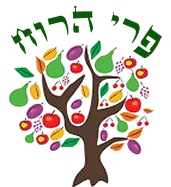
06.02.25 (Sivan 6, 5785) Traditional Jewish chinuch (education) identifies various middot ha-lev (qualities of heart) that attend to a genuinely Jewish life. These include Talmud Torah (studying Scripture), ahavat Adonai (loving God), gemilut chasidim (doing works of compassion), bikkur cholim (visiting the sick), and so on. The follower of Yeshua likewise is intended to evidence middot hav-lev, though the Source for such comes directly from the power of the Ruach Ha-Kodesh (Holy Spirit) working within the heart of faith. The peirot (fruits) listed in Galatians 5:22-23 represent nine visible attributes of a follower of Yeshua, namely: love (אהבה), joy (שׂמחה), peace (שׁלום), patience (סבלנות), generosity (נדיבות לב), kindness (חסד), loyalty (נֶאֱמָנוּת), humility (ענוה), and self-control (שְׁלִיטָה עַצְמִית).
Note that these fruits are decidedly not realized through self-effort or attempts at human "reformation," but rather are a supernatural outgrowth of the grace of God in the life of one who puts their trust in Yeshua as Savior. They are fruits "of the Spirit" (פּרי הרוח), not the result of human effort (see John 15:1-8, Mark 4:26-29). Our lives are sanctified in the manner in which they were justified: entirely by faith in the love and grace and power of God.
The question we must searchingly ask ourselves is whether our lives give evidence to the power and agency of the Holy Spirit within us. Strictly speaking, these nine attributes are qualities that only the LORD God Himself possesses, since He alone is perfectly loving, perfectly joyful, and so on. But since we are created be'tzelem Elohim (in the image of God) and were given the Holy Spirit to help us walk as did our Teacher (Luke 6:40), spiritual fruit should be evident in our own lives (John 14:12; 15:1-8; 26-7). But again, obtaining such fruit is invariably a matter of faith – trusting that God will help us live our lives in truthful union with Him. This is the "work of God" (John 6:28-29).
Let's remember to pray for one another and ask the LORD to make each of us fruitful le'shem shamayim - for the sake of the Name of our beloved One Yeshua.... Amen.
Hebrew Lesson
Proverbs 8:19 reading (click):
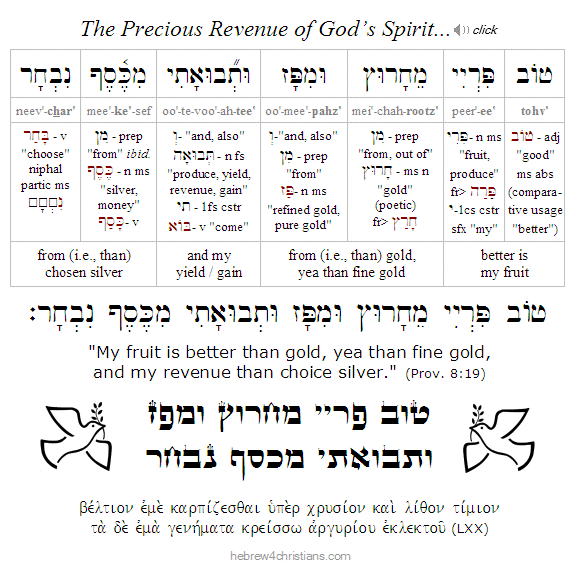 |
The Kingdom Within You...
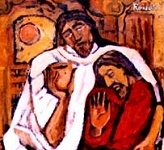
"I will not leave you orphans; I will come to you..." - Yeshua
06.02.25 (Sivan 6, 5785) "And I will ask the Father, and He will give you another Helper, that He may abide with you forever, namely, the Spirit of truth (רוּחַ הָאֱמֶת), whom the world cannot receive, because it neither sees Him nor knows Him; but you know Him, for He dwells with you and will be in you. I will not leave you orphans; I will come to you..." (John 14:16-18). Note that Yeshua asks the Father for the parakletos (i.e., the one "called alongside"), whom he calls the "Spirit of Truth," to "dwell within" the hearts of his followers so they will be fortified in their mission, and he furthermore identifies himself with the Spirit by saying that he would not leave us as orphans but would come to come to be with us...
I have written before about how Shavuot is called "Atzaret Pesach" (עצרת פסח) or the "culmination of Passover." Just as the Passover reveals "God with us" (עִמָּנוּ אֵל), as the Word made flesh, and "God for us" (אֱלהִים לָנוּ), as the sacrificial Lamb of God, Shavuot adds yet another dimension by revealing "God within us" (אֱלהִים בְּתוֹכֵנוּ), as the indwelling Presence, the "breath of God" that forever abides in our hearts. Yeshua was eager for us to partake of this miracle: "I tell you the truth: it is to your advantage that I go away, for if I do not go away, the Helper (i.e., ὁ παράκλητος, one "called alongside to help) will not come to you. But if I go, I will send him to you" (John 16:7).
As it is written, "By this we know that we live in him and he in us, because he has given us of his Spirit" (1 John 4:13). Or don't you know that your body is a temple of the Holy Spirit within you (רוּחַ הַקּדֶשׁ בְּתוֹכֵנוּ), whom you have from God? "For all who are led by the Spirit of God are the children of God" (Rom. 8:14). Thank God for the help we attain through the Spirit's heartfelt ministrations: "For the Spirit also helps in our weaknesses. For we do not know what we should pray for as we ought, but the Spirit Himself makes intercession for us with groanings which cannot be uttered" (Rom. 8:26).
Amen, thank you Lord Yeshua for the gift of the Holy Spirit within our hearts...
Hebrew Lesson:
Ezekiel 36:26a reading (click):
This week's Torah:
Parashat Naso (פָּרָשַׁת נָשׂא)
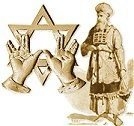
06.01.25 (Sivan 5, 5785) Chag Shavuot Sameach, friends... Among other things, our Torah portion for this week, parashat Naso ("lift up!"), includes the cornerstone blessing that Aaron and his sons (i.e., the priests) were instructed to declare over the people of Israel: "May the LORD bless you and keep you; may the LORD shine his face upon you and be gracious to you; may the LORD lift up his face upon you and give you his peace" (Num. 6:24-26).
Notice that the Hebrew text of the blessing (see below) begins with three words, is comprised of three parts, invokes the divine Name three times, and is therefore appropriately called "the three-in-one blessing" (שלוש בברכה אחת). Notice also that the words are spoken in the grammatical singular rather than plural because they are meant to have personal application, not to be a general benediction over a crowd of people. The phrase, "May the LORD lift up his face upon you..." (ישא יהוה פניו אליך) pictures the beaming face of a parent lifting up his beloved child in joy...
The repetitive construction of God "lifting up His face" (יהוה פניו אליך) indicates that he gazes upon you in love and in blessing. Undoubtedly Yeshua recited this very blessing over his disciples when he ascended back to heaven on Mem B'Omer, though He would have spoken it in the grammatical first person: "I will bless you and keep you (אני אברך אותך ואשמור לך); I will shine upon you and will be full of grace toward you; I will lift up my face toward you and give you my shalom" (see Luke 24:50-51).
יברכך יהוה וישמרך
יאר יהוה פניו אליך ויחנך
ישא יהוה פניו אליך וישם לך שׁלום
ye·vah·re'·khe·kha' · Adonai · ve·yeesh'·me·re'·kha
yah·eir · Adonai · pah·nav · e·ley'·kha · vee·khoon·ne'·kah
yees·sa · Adonai · pah·nav · e·ley'·kha · ve·yah·seim · le·kha · shah·lohm

"May the LORD bless you and keep you;
May the LORD shine his face upon you and be gracious to you;
May the LORD lift up his face upon you and give you his peace."
(Num. 6:24-26)
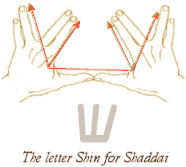
Nesiat Kapayim (Raising of the hands)
Note: The verbs in this blessing are all "jussive," which means they express a wish, desire, or a command, though understood in context (i.e., as part of the blessing recited by the kohanim during ceremonial occasions), the verbs should be regarded as declarative or oracular. To learn more about this blessing, click here.
Parashat Naso Links:
Why Shavuot Matters...
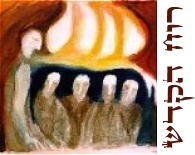
The holiday of Shavuot ("Pentecost") begins Sunday, June 1st at sundown...
06.01.25 (Sivan 5, 5785) The holiday of Shavuot (חג השבועות) is called "Pentecost" in Christian tradition. The Greek word Pentecost (πεντηκοστή) means "the holiday of fifty days" referring to the 50th day after the resurrection of Yeshua when the Holy Spirit descended upon the disciples and when Peter first proclaimed the truth of salvation in Jerusalem (Acts 2:1-43). The Torah teaches that Shavuot is a major biblical holiday (one of the three "required appointed times" of the LORD, see Exod. 23:14-17; Deut. 16:16) and moreover that it is regarded as the climax of Passover itself -- 'the endpoint' of the redemptive experience. Indeed, just as the blood of the lambs smeared on the door posts led directly to Sinai 50 days later, so the crucifixion of Yeshua led directly to the descent of the Holy Spirit to empower His followers to serve God under the new covenant of Zion.
 |
As I've mentioned before, there are two essential priestly rituals commanded for the holiday of Shavuot: 1) the waving (i.e., tenufah: תנופה) of the two loaves of (new) wheat bread (called shtei ha'lechem: שתי הלחם), and 2) the offering of peace sacrifices (i.e., korban shelamim: קורבן שלמים). Both of these aspects of the priestly service (avodah) were fulfilled in the greater sacrifice of Yeshua made on our behalf. Moreover, just as worshipers at the Temple would present bikkurim (בכורים) - their choicest first fruits - and attest to God's faithfulness before the altar (Deut. 26:3), so we are called to walk in the fruit of the Spirit (פרי רוח הקודש) and to proclaim the message of God's faithful love for us.

Though it is not explicitly mentioned in the five books of the Torah, the earliest Jewish sages have long connected the revelation of the Torah at Sinai (מתן תורה) with the holiday of Shavuot. This comes from a careful study of the chronology of the exodus itself, calculating the time of the Passover from Egypt (i.e., Nisan 15) to the arrival of the Israelites at Sinai exactly 45 days later, on Sivan 1 (see Exod 19:1). The earliest extrabiblical source that explicitly links Shavuot with the revelation of the Torah at Sinai is the apocyphal Book of Jubilees (i.e., Sefer ha'Yovelim: ספר היובלים), dating from the 2nd century BC. Extant manuscripts of this book were found among the Dead Sea Scrolls (מגילות ים המלח), indicating that the Shavuot-Sinai connection was made before the advent of Yeshua. The Book of Jubilees provides a parallel account of Genesis and certain parts of Exodus, and mentions the observance of Shavuot by Noah before the time of the Flood. In the book Noah is told to observe the Festival of Weeks (shavuot) and to offer Firstfruits (bikkurim) every year as a commemoration of God's covenant to renew the earth (Jubilees 6:15;22). Likewise Abraham and the original patriarchs were said to observe it, though it was forgotten by the Jews in Egypt until Moses was said to have reinstated it at Sinai. Shavuot is also mentioned in the apocryphal Book of Tobit (טוביה) and the Book of Maccabees, c. 2nd century BC.
 |
The Talmud (i.e., traditional teaching of the Torah ) also connects Shavuot with the giving of the Torah. The earliest Talmudic statement on the date of the revelation at Sinai is found in Tractate Shabbat 86b. According to these sages, the Israelites left Egypt on Friday, Nisan 15, and the Torah was given exactly 50 days later on Saturday, Sivan 6th. This corresponds exactly with God's instructions to count 50 days from the day after Passover (Lev. 23:15-16). This date later became fixed in the Jewish calendar, and was further supported by reference to Exodus 19:1: "On the third new moon after the people of Israel had gone out of the land of Egypt, on that day they came into the wilderness of Sinai." (For details about the exact timing for this event, see the main Shavuot article here.) The Midrash Rabbah also explicitly makes the Shavuot-Sinai connection as well. The later rabbis refer to Shavuot as "Atzeret" (עצרת), a word that means "withdrawal" (i.e., to the desert to receive the law) and "conclusion" (or the goal of the Passover redemption). Today Jewish tradition regards Shavuot as Zman Mattan Torateinu (זמן מתן תורתנו) - "the anniversary of the giving of the Torah." Shavuot is also called Yom Ha'Kahal (יום הקהל) - the "Day of Assembly," based on the assembly of all the people of Israel to hear the Voice of God at Sinai (Deut. 18:16).
During the Passover Seder we reaffirm our connection with God's saving deeds by saying that "in every generation each person should consider himself as having personally received the Torah at Sinai." The climax of the Shavuot morning service is the recitation of the famous Akdamut poem followed by the recitation of the Ten Commandments, when all the congregation stands to "relive" the experience at Sinai. A second Torah scroll is then taken out of the ark and the portion is read (Num. 28:26-31) that describes the sacrificial offerings made at the Temple during Shavuot, and the Haftarah (Ezek. 1:1-28; 3:12) concerns the stunning revelation of God in the form of the Throne/Chariot.
The Scroll of Ruth (מגילת רות) - a beautiful story about God's redemptive love - is read on the second day of Shavuot. As the "kinsman redeemer" (i.e., go'el karov: גואל קרוב), Boaz was a wealthy man of the tribe of Judah (Bethlehem) who married a Gentile bride. Boaz's name (בועז) means "in Him [בו] is strength [עז]," a picture of Yeshua the Messiah, his greater Descendant, who also redeemed for himself a bride from among the nations. Among traditional Jews, the Book of Ruth is is read since the events recounted took place during the time of the spring harvest (linking it to the agricultural aspect of Shavuot), and Ruth is a picture of willing acceptance of a Jewish lifestyle (linking it to the events of Sinai).
Paradoxically, the conversion of Ruth was actually against the law given in the Torah itself! According to the Torah (Deut. 23:3), an Ammonite (or Moabite) was forbidden to enter into the family of Israel, and therefore the question arose regarding how Ruth was accepted. Indeed, not only was Ruth accepted, she became the great grandmother of King David through whom the Messiah Yeshua would come (Ruth 4:17). There is a profoundly wonderful message hidden here!
Shavuot is portrayed metaphorically as a marriage ceremony (קִדוּשִׁין) between God and the children of Israel. The LORD is the Heavenly chatan (groom) who said, "Accept Me"; the Jewish people represent the beloved kallah (bride); and the Torah represents the ketubah (marriage contract). In some Sephardic traditions, a ketubah is literally read under the traditional chuppah (חוּפָּה) or wedding canopy, that is set up in the synagogue. Some of the sages note that the idea of marriage comes from the resemblance of the word Shavuot with shevuot (שבועות), the word for "oaths." On Shavuot two oaths were taken. One was from God who pledged that He would not exchange the children of Israel for another people, and the other was from the Jews who pledged they would not exchange God for another deity...
This is analogous to the wedding cup that Yeshua offered us in the upper room, before His crucifixion. The Holy Spirit was given to escort us into the heavenly bridal chamber... Collectively, the followers of the Messiah are called Kallat Mashiach (כלת המשיח) - the Bride of Messiah (Rev 21:2,9), and we eagerly await the marriage supper to come (Rev 19:9).
Shavuot marks the time when God entered into covenant with the Jewish nation. During the first Shavuot at Sinai, God instituted the Mosaic covenant and gave the Torah in written form, but during the Shavuot at Zion, after the resurrection of Yeshua, God established the New Covenant (הברית החדשה) when He wrote the Torah on the hearts of Yeshua's followers.
- Shavuot at Mount Sinai is sometimes considered the day on which Judaism was born. Shavuot in Jerusalem (Mount Zion) is the day on which the church was born when the Holy Spirit was poured out upon the followers of the Messiah Yeshua.
- Just as the resurrection of Yeshua represents the Firstfruits of those who have died (1 Cor. 15:20) and fulfills the prophetic ritual of the waving of the omer on the festival of First Fruits, so the giving of the Holy Spirit to the followers of Yeshua fulfills the wave offering of the leavened wheat loaves on the day of Shavuot.
- At Mount Sinai the Ten Commandments were written on tablets of stone by the "finger of God" (Exod. 31:18), but at Mount Zion, the Torah is written on tables of the heart by the Spirit of God (2 Cor. 3:3; Heb. 8:10).
- Just as the Israelites were affirmed as God's chosen people on Shavuot with the giving of the Torah, so the followers of the Messiah are affirmed as God's chosen people at Shavuot after Yeshua's ascension into heaven as the Mediator of a Better Covenant (Hebrews 8:6). The 3,000 that were added to the church that day were firstfruits of the redeemed people of God.
Again, the holiday of Shavuot is one of the shelosh regalim (three pilgrimage festivals) given in the Torah (Exod. 23:14-17; Deut. 16:16) and therefore reveals profound spiritual truth for followers of Yeshua (Luke 24:44; 2 Tim. 3:16). God did not want us to miss the significance of this holiday, since it expresses the freedom and truth of the New Covenant of Zion. Friend, may this be a time of renewal and great joy in your life....
Hebrew Lesson
Exod. 34:22a reading (click):
Eschatology and Shavuot...
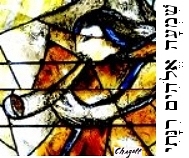
The festival of Shavuot (חג השבועות) begins at sundown... Happy Shavuot Holiday, friends!
06.01.25 (Sivan 5, 5785) Some people see the ultimate fulfillment of the holiday of Shavuot (i.e., "Weeks" or "Pentecost") to be found in the mysterious catching away (ἁρπάζω, harpazo) of believers before the time of the "Great Tribulation" and the Great Day of the LORD (1 Thess. 4:17; John 14:3; 1 Cor. 15:51-52). They reason that since Shavuot marked the day of dramatic revelation, with signs of fire and the sounds of a heavenly shofar blast, an appointed time that marks the jubilee fulfillment of Passover, it can therefore be seen as the rapturous end of redemption for those who believe, symbolic of a wedding day, when God betrothed Israel as His own people, separate from all others. Both Jew and Gentile will be "waved" before the LORD (as symbolized by shtei ha-lechem, the two loaves), representing the "one new man" of kallat Mashiach, the "bride of Messiah," or the assembly of those called out from every tribe and tongue to be a part of God's heavenly kingdom.
 |
Though no one knows the day or hour of the return of Yeshua our Messiah (see Matt. 24:36; Acts 1:7), there are clues given in Scripture about the conditions of the world before His return, and Yeshua himself gave us parables admonishing us to actively be looking (Matt. 24:2-14; 25:1-13). The Apostle Paul said that followers of the Lord can know the "season" of Messiah's return, and warned that He will come "as a thief in the night" - not in the revelation of great power and overwhelming glory at the end of the age (1 Thess. 5:2-6). Moreover, Paul forewarned of the rise of worldwide godlessness (2 Tim. 3:1-7) and even of the flagrant apostasy of the "institutionalized" church (1 Tim. 4:1-3), which is of course evident today... Other Scriptures foretell of a coming One World Government, the rise of the "Messiah" of evil (Antichrist) who will enforce a worldwide "security state" (Dan. 11:38), the persecution of the national Israel (a nation that had been miraculously restored to the promised land), the rebuilding of the third Temple, the coming Great Tribulation, and so on. "When these things begin to take place, straighten up and lift up your heads, because your redemption is drawing near" (Luke 21:28).
Regarding the destiny of the "world system," however, we have quite a different vision... The LORD God Almighty has vowed to break the pride of the "kings of the earth" with a rod of iron and dash them in pieces like a potter's vessel, and the shattering will be so ruthless that among its fragments not a shard will be found with which to take fire from the hearth, or to dip up water out of the cistern (Psalm 2:9; Isa. 30:14). For from His mouth comes a sharp sword with which to strike down the nations, and He will rule them with a rod of iron. He will tread the winepress of the fury of the wrath of God the Almighty (Rev. 19:15). Nebuchadnezzar's great dream will soon be fulfilled: "As you looked, a Stone was cut out by no human hand, and it struck the image on its feet of iron and clay, breaking them in pieces. Then the iron, the clay, the bronze, the silver, and the gold, all together were broken in pieces, and became like the chaff of the summer threshing floors; and the wind carried them away, so that not a trace of them could be found. But the stone that struck the image became a great mountain and filled the whole earth" (Dan. 2:34-35). "And the God of heaven will set up a kingdom that shall never be destroyed ... and it shall stand forever" (Dan. 2:44). One day the edifice of man's godless pride will come crashing down, and there will be no trace left of its rubble... Amen; even so, come quickly, Lord!
Hebrew Lesson
Psalm 47:5 Hebrew reading:
 |
May 2025 Site Updates
Yeshua the True Vine...

The holiday of Shavuot ("Pentecost") begins Sunday at sundown...
05.31.25 (Sivan 4, 5785) "I am the true vine, and my Father is the Gardener. Every branch in me that does not bear fruit he takes away, and every branch that does bear fruit He purges (καθαιρει), that it may bear more fruit" (John 15:1-2). In other words if you bear fruit you will experience the "purging process," and that means suffering affliction...
This might seem to you somewhat backward: Why does the fruitful branch need to be cut back? Indeed, the promise of suffering is not meant for an evil person, but for the righteous soul who trusts in God. Purging is painful but it is also purifying, yielding new growth within our hearts. Yeshua taught, "Blessed are the pure in heart, for they shall see God" (Matt. 5:8). The Greek word translated "pure" is katharos (καθαρoς), sometimes used describe the cleansing of a wound (catharsis), or to describe the unalloyed quality of a substance revealed through refining fire.
We "rejoice" in testing because that is the way of real growth, sustained hope, and the revelation of God's deep love (Rom. 5:3-4). In our afflictions we are given heavenly consolation that helps us to persevere (2 Cor. 1:3-5). Remember that we are being weaned from this present age to be made ready for heavenly glory, for things unimaginably wonderful, soon to be revealed to you. Stay tuned, friends: the best is yet to come!
Yeshua warned us, however, that "if anyone does not live in Me, he is cast off as a branch, and withers..." (John 15:6). We find life only as we remain connected to the Source and Conduit of life, who is the Messiah, the Savior and LORD. True life grows out a heart connection with Yeshua, and without that connection our lives become vain and will yield no eternal significance (John 15:5). Indeed, if you reject the Vine you will be destroyed, since life is found in no other Source (John 14:6; Luke 3:9).
But be encouraged, trusting friend: we cannot create new life by our own efforts or effect regeneration by means of our own "good works." No, the work of salvation is God's alone, and we partake of that work as we abandon our self-efforts and religious conceits (see Isa. 32:17; Mark 4:26-29).
There remains, therefore, a Sabbath for the people of God, "for whoever has entered God's rest has also rested from his works as God did from his" (Heb. 4:9-10). This "deep Sabbath" is a matter of trusting that the work of salvation has been accomplished on your behalf. Therefore "strive to enter into that rest," for the LORD always effects what is best for you. The path of peace is to surrender to God's care for your life and let the evils and drama of the world flow past you. This is "the work of faith."
Look to heavenly reality and not to the vanity and deceits of this world (Col. 3:1-4); live in Yeshua's Presence, drawing strength and vitality from your relationship with Him. The fruit of the Spirit is produced as we yield ourselves to the love and presence of God.
Hebrew Lesson
John 15:1 reading (click):
Heeding the Father's Voice...
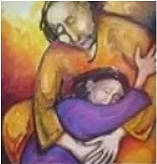
The giving of the Torah is connected with the holiday of Shavuot ("Pentecost"). This is derived from the chronology of the Exodus itself: the Passover (on Nisan 15) to the arrival at Mount Sinai (on Sivan 1) took 45 days (Exod. 19:1). Four days later God spoke "I AM" to Israel (Exod. 20:2).
05.30.25 (Sivan 3, 5785) Recall that God promised his people that they would experience heart change by the power of His Spirit: "Behold, the days come, says the LORD, that I will make a new covenant (ברית חדשׁה) with the house of Israel, and with the house of Judah, not according to the covenant that I made with their fathers in the day that I took them by the hand to lead them out of the land of Egypt, My covenant which they broke, though I was a husband to them, says the LORD. But this is the covenant that I will make with the house of Israel after those days, says the LORD: I will put My law (i.e., Torah) in their minds, and write it on their hearts; and I will be their God, and they shall be My people" (Jer. 31:31-33). Recall also that it was on the appointed time of Shavuot (i.e., "Pentecost"), 50 days after the resurrection of our Lord, when the disciples of Yeshua received the promise of the Holy Spirit and the Torah of God was written upon their hearts (see Acts 1:7-8; 2:1-4).
Just as the advent of Messiah signified the time of God's redemption of his people, so the advent of the Holy Spirit (רוּחַ הַקּדֶש) signified the time of their regeneration as God's children. Among other things, the role of the Spirit is to convict people of sin, to reveal the truth of salvation in Yeshua, and to empower believers of Yeshua to bear fruit that glorifies God.
Surely our great need is to have heart, to find strength, resolution, and steadfast determination to walk boldly during these heartless and depraved days (2 Tim. 3:1-5). We are not without God's help, of course. Yeshua told us that the Ruach HaKodesh (רוּחַ הַקּדֶשׁ) would be "called alongside" (παράκλητος) to comfort us on the journey. The English verb "comfort" literally means "to give strength" (from com- ["with"] and fortis ["strong"]), an idea similarly expressed by the verb "encourage," that is, to "put heart [i.e., 'core'] within the soul." In Hebrew, the word courage is expressed by the phrase ometz lev (אמֶץ לֵב), meaning "strong of heart," denoting an inner quality of the will rather than of the intellect. Ometz lev means having an inner resolve, a passion, and a direction. The sages say "the mind is the eye, whereas the heart is the feet." May God be our Light and Salvation as we walk through the surrounding darkness... Amen.
"Dear child of mine, do not forget my Torah (תורתי), but let your heart keep my commandments (מצותי). Doing so will add to you length of days (ארך ימים), long life, and peace (שׁלום). Do not abandon the heart of Your Father by losing sight of mercy and truth (חסד ואמת); No! Tie them around your neck; inscribe them upon the table of your heart (לוח לבך), that is, make them part of your inner being and will. Doing so will reveal my grace (חן) and good understanding (שכל־טוב) before the eyes of God and others. Trust in your heavenly Father with all your heart (בטח אל־יהוה בכל־לבך) and don't seek to be in control, trying to figure everything out on your own (ואל־בינתך אל־תשען). Listen for your Father's voice in everything you do; in all your ways know His heart (בכל־דרכיך דעהו), and then your ways will be directed in the truth. Don't assume that you know it all; abandon your self-conceit: Revere your heavenly Father (ירא את־יהוה) and flee from what you know is self-destructive and evil! Doing so will impart healing (רפאות) to you: your body will glow with health, your very bones will vibrate with life! Honor your Heavenly Father with everything you own; give him your first and the best of what you have; then your barns will burst with plenty, and your wine vats will be overflowing" (Prov. 3:1-10).
Hebrew Lesson:
Proverbs 3:1 reading (click):
The Torah of Shavuot...
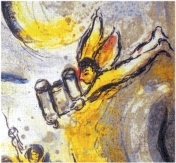
05.30.25 (Sivan 3, 5785) The importance of the Torah, or "law" of God, cannot be overstated, friends, and the holiday of Shavuot recalls and celebrates its importance in our lives. Yeshua plainly said to his followers: "Do not think that I have come to abolish the Law or the Prophets; I have not come to abolish them but to fulfill them. I tell you the truth, until heaven and earth pass away not the smallest letter or even a stroke of a letter (קוצו שׁל יוד) will pass from the law until everything comes to pass. So anyone who breaks one of the least of these commands and teaches others to do so will be called least in the kingdom of heaven, but whoever obeys them and teaches others to do so will be called great in the kingdom of heaven" (Matt. 5:17-19). He further solemnly warned: "Not everyone who says to me, 'Lord, Lord,' will enter into the kingdom of heaven– only the one who does the will of my Father in heaven. On that day, many will say to me, 'Lord, Lord, didn't we prophesy in your name, and in your name cast out demons and do many powerful deeds?' Then I will declare to them, 'I never knew you. Go away from me, you workers of lawlessness' (Matt. 7:21-23).
To the ungodly, "freedom" means being lawless, that is, acting under their own authority apart from the will of God. This of course was the original temptation in Eden, when the nachash (serpent) told Eve that if she acted under her own authority, her eyes would be "opened" and she would be "like God," knowing both good and evil (Gen. 3:5). That is always the creed of the wicked: "Do as thou wilt..." True freedom, however, is not the supposed right to do whatever you want, but instead is the power to do what is right, living in harmony with moral reality, and being liberated from the slavery of impulses to do evil. The law of God, then, is the blessing of having boundaries, order, and moral sanity within our lives, and that is why the Holy Spirit inscribes the law "within" us - to help guide our steps, protect our way, and to empower us to live in obedience to the truth of God (Jer. 31:33). If you are led by the Spirit, you are no longer enslaved to the law of sin and death -- that is, the lower nature and its idolatrous impulses -- but you will bear the fruit of righteousness, goodness and truth (Gal. 5:18; Eph. 5:9). Let no one deceive you with vain words. You cannot serve two masters... If you know that the Messiah is righteous, you know that every one that does righteousness is born of God (1 John 2:29).
God did not send the Savior to suffer and die on the cross so that people would disregard his moral will and go right on sinning. No, by his sacrifice Yeshua delivers us from the power of sin and death and thereby empowers us to do his will: "For we are his workmanship, created in Messiah for good works that God prepared beforehand" (Eph. 2:10). Followers of Messiah are to be "filled with the knowledge of his will in all spiritual wisdom and understanding, to live our lives in a manner worthy of the Lord, fully pleasing to him, bearing fruit in every good work and increasing in the knowledge of God" (1 Cor. 1:9-10). Therefore the message of Shavuot is that we should walk worthy of God, who has called us unto his kingdom and glory (1 Thess. 2:2). Chag Shavuot Sameach.
Hebrew Lesson
Psalm 119:97 reading with commentary (click):
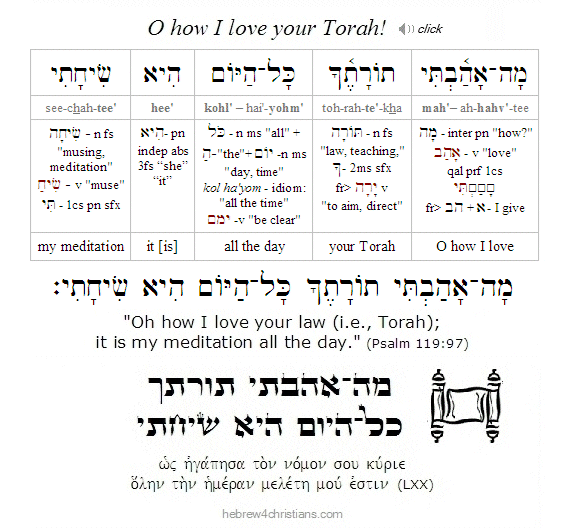 |
Ruth and the Redeemer...

"Every teacher of the Torah who becomes a disciple in the Kingdom of Heaven is like a homeowner who brings from his storeroom new gems of truth as well as old." - Yeshua
05.30.25 (Sivan 3, 5785) Shalom friends. During the season of Shavuot we read the Book of Ruth (מגילת רות), which tells the story about redeeming love and the advent of King David. Recall that King David was a direct descendant of Ruth, who as a Moabitess was an outsider and "stranger" to the promises of God (Ruth 4:17; Eph. 2:12). Despite being part of an despised and rejected group of people (see Deut. 23:3), Ruth overcame the law's demand by believing in the love and acceptance of a redeemer of Israel (Ruth 3:9). Ruth's great grandson was named David (דָוִד), meaning "beloved," which has the same numerical value as the word "hand" (יָד). It is no wonder that the LORD chose David to represent God's extended hand of love for the stranger, for the convert, for the outsider, the leper, and the lost, since his descendant Yeshua the Messiah came to love and redeem the entire world by means of His outstretched hands.
Now while the narrative of the Book of Ruth is straightforward, to fully understand its spiritual implications we need to be familiar with several laws from the Torah, including the laws of redemption (Lev. 25:32-55), the laws of Shemittah and Jubilee years (Lev. 25:4, 10, 23), the laws of family inheritance (Num. 27:8-11), the laws of yibbum or "levirate marriage" (Deut. 25:5-10), and various farming laws regarding leaving food for the poor and the stranger (Lev. 19:9-10; 23:22; Deut. 24:19). In addition, we need to understand the laws of warfare for taking possession of the land, and God's repeatedly stated commandment that Israel must be holy and not assimilate with surrounding cultures (Exod. 34:12; Deut. 7:1-6; 14:2, etc.). This restriction applied not only to the seven Canaanite nations (Deut. 7:1; 20:17-18), but also to the descendants of Lot (i.e., Amnonites and the Moabites), since they showed enmity to Israel when they first came to the land (Deut. 23:4-6). Indirectly, then, the story of Ruth provides a strong message to Christians: to follow the story of redemption, you must understand the Torah and its commandments! Amen...
Hebrew Lesson
Ruth 1:16a reading (click):
The Jubilee of Shavuot...

The festival of Shavuot (חג השבועות) begins Sunday, June 1st at sundown this year...
05.30.25 (Sivan 3, 5785) Saturday, May 31st (at sundown) signals the end of the 49 days of counting the omer, and therefore the following day is the "Jubilee" of Shavuot (i.e., "Weeks" or "Pentecost"). Recall that the Torah instructed (Lev. 23:15-16) that we count from the day following Passover (i.e., Nisan 16) for exactly seven weeks, until Sivan 5 (i.e., from April 14th through May 31st this year). On the 50th day (i.e., Sivan 6), a special celebration was to be observed. This annual "countdown period" recalls both the time from the Passover until the revelation at Sinai, and the advent of the Holy Spirit (רוח הקודש) among Yeshua's disciples in Jerusalem (Acts 2:1-4).
According to the sages, the festival of Shavuot marks the culmination of the experience of redemption, sometimes called Atzeret Pesach (עצרת פסח), or the "conclusion" of Passover. Since the Exodus from Egypt was intended to lead to the revelation given at Sinai, the goal of Passover was the giving of the Torah to the Jewish people.
In other words, the LORD took the Jewish people out of Egypt so that they would be His own treasured people, holy and separated from the pagan cultures around them, living in the light of great revelation. Indeed, all of the holidays of the biblical calendar are connected with this event, including the fall festivals of Rosh Hashanah, Yom Kippur and Sukkot.
During the holiday of Shavuot, it is customary for young adults to recommit themselves to Talmud Torah (the study of Torah) and to renew their decision to live as faithful Jews. In addition to formal "confirmation ceremonies" often scheduled at synagogues, some other Shavuot customs include decorating the home and synagogue with greenery, eating dairy foods and sweets (as samples of the "milk and honey" of the promised land), and staying up the entire night of Shavuot to read selections from the Torah and from the Talmud (this custom is called tikkun leil ha'shavuot: תיקון ליל השבועות, "Rectification for Shavuot Night"). For the Messianic Jew, Shavuot is the time of celebrating the birth of kallat ha'Mashiach (כלת המשיח) - the Bride of the Messiah (or the new covenant assembly), since the fire of the Ruach HaKodesh (Holy Spirit) was poured out to the believers in Yeshua during this time.
 |
At the synagogue, it is customary to start the Shavuot evening service later than usual, to ensure that the 50th day has arrived (see "counting the omer"). As mentioned above, many people stay at the synagogue throughout the entire night listening to poems and favorite portions of Scripture, or reading from a special book (sefer tikkun leil ha'Shavuot) that includes key verses of each Torah portion and passages of each tractate of the Mishnah. This custom is observed to "repair" the night of Shavuot from the error of sleeping so soundly before the Torah was revealed at Sinai that God had to awaken the Jews with piercing shofar blasts, thunder, and lightning the following morning (Exod. 19:16).
Jewish tradition teaches be'chol dor vador (בכל דור ודור) - that in every generation each person should consider him or herself as having personally been delivered from Egypt to receive the Torah at Sinai. The climax of the Shavuot morning service is the recitation of the famous Akdamut poem followed by the reading of the Ten Commandments, when all the congregation stands to "relive" the experience at Sinai. A second Torah scroll is then taken out of the ark and the portion is read (Num. 28:26-31) that describes the sacrificial offerings made at the Temple during Shavuot, and the Haftarah (Ezek. 1:1-28; 3:12) concerns the amazing revelation of God in the form of the Throne/Chariot.
The Scroll of Ruth (מגילת רות) - a beautiful story about God's redemptive love - is traditionally read on the second day of Shavuot. As the Goel (kinsman-redeemer), Boaz was a wealthy man of the tribe of Judah (Bethlehem) who married a Gentile bride. Boaz's name means "in Him is strength," a picture of the Yeshua the Messiah, his greater Descendant, who also redeemed for himself a bride from among the nations. Among traditional Jews, the Book of Ruth is is read since the events recounted took place during the time of the spring harvest (linking it to the agricultural aspect of Shavuot), and Ruth is a picture of willing acceptance of a Jewish lifestyle (linking it to the events of Sinai).
The holiday of Shavuot is one of the shelosh regalim (שלוש רגלים) or three major "pilgrimage festivals" commanded in the Torah (see Exod. 23:14-17; Deut. 16:16) and therefore it reveals profound spiritual truth for followers of Yeshua (Luke 24:44; 2 Tim. 3:16). God did not want us to miss the significance of this holiday, since it expresses the blessed truth of the New Covenant of Zion. From my family to you: Chag Shavuot Sameach (חג שבועות שמח) - "Happy Shavuot!" May this be a time of renewal and great joy in your lives...
Hebrew Lesson
Jeremiah 31:33 reading (click for commentary):
The Whispering Word...

The following is related to our Torah reading for this week, parashat Bamidbar...
05.30.25 (Sivan 3, 5785) The Hebrew word midbar (מדבר), "desert," shares the same root as davar (דּבר) which means "word." We often need to be alone to hear God speaking kol demamah dakkah (קול דממה דקה) - "the sound of a low whisper" (1 Kings. 19:12), and the journey into the desert was God's way of separating His people to speak with them "privately," so to speak (Jer. 2:2).
But to hear the word we must humble ourselves, and the desert (i.e., "word") of Sinai is therefore first of all the word of humility (ענוה). When God spoke Torah to Israel, it was from a nondescript mountain - a place of emptiness, brokenness and need. Indeed, another word for Sinai is "chorev" (חרֵב), a word that means dryness and desolation. That is the starting point -- not the lush places of a future paradise.
We receive Torah "bamidbar" because we can only hear God's davar in a place of lowliness and inner quiet. God brings us to an arid place -- inhospitable, and dangerous -- to reveal our need for Him, to show Himself as our Sustainer. The way through the desert of Sinai teaches us to persevere in our vision for the greater hope of Zion. May the LORD our God help us heed the whisper of His Spirit...
Hebrew Lesson
Psalm 143:8 Hebrew reading:
Torah of Surrender...
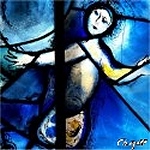
"If you can't fight and you can't flee, flow..." - Robert Elliot
05.30.25 (Sivan 3, 5785) When we pray to God, "Thy will be done," are we willing to forego our desire and accept whatever might happen? Do we truly believe what we pray? "Thy will be done -- over this wish, this sorrow, this fear, this dear hope? Are we actually trusting in hte Lord's care for our lives? The prophet cries out: "Who has directed the Spirit of the LORD, or being his counselor has taught him?"(Isa. 40:13). He is our God, and we are sheep in his pasture, if we obey his voice (Psalm 95:7).
If we find ourselves habitually complaining or murmuring about the course of our lives, are we not belying our prayers? Nay, are we not resisting his will? Is not our sullenness or disappointment an oblique accusation that God is not to be trusted with whatever happens, whether it be good or bad? Is not such a complaint, in its essence, tantamount to the demand: "I want it my way"?
C.S. Lewis warned: "Hell begins with a grumbling mood, always complaining, always blaming others... but you are still distinct from it. You may even criticize it in yourself and wish you could stop it. But there may come a day when you can no longer. Then there will be no 'you' left to criticize the mood or even to enjoy it, but just the grumble itself, going on forever like a machine. It is not a question of God "sending us" to hell. In each of us there is something growing, which will BE hell unless it is nipped in the bud" (Great Divorce). "Perhaps my bad temper or my jealousy are gradually getting worse - so gradually that the increase in seventy years will not be very noticeable. But it might be absolute hell in a million years!"
There is a Torah of surrender we must offer: "Be still and know that I am God..." (Psalm 46:10). The Hebrew means to be inwardly silent, to let go of your desire to control... This is something you must do; you must shush your heart to know the Divine Presence. Therefore "set the Lord always before you" (Psalm 16:8) and refuse any anxious thought to weigh in upon you, creating pressure and "dis-ease." Let go of your will. Give up. Confess your ambiguous desires; abandon the insanity of your self-rule. Quieting your heart allows you to hear the holy Spirit's whisper: "It is I; do not be afraid..." Once the sibilance of fear dissipates, you can access the truth of God. The Spirit asks us to do teshuvah: "In returning and rest you shall be saved; in quietness and in trust shall be your strength" (Isa. 30:15).
So much of life is beyond our control, and it exhausts us when we try to wrestle against the Angel. When we let go of our will, surrendering to God, we find peace as our circumstances and destiny are carried into the "heavenly flow" of God's providential design. "The LORD shall fight for you, and you shall be made silent" (Exod. 14:14).
Are we not often at odds within ourselves? There is an inner antagonism that we experience, ambivalence, double-mindedness, and even despair. We may tend to regard life as a challenge to be conquered, but when we fail (as we assuredly will), anxiety arises over our losses. We should be shaken to our core, for only God's power can deliver us from ourselves.... It's a matter of utmost significance. Find God or die.
Worry is a place of exile and pain. Since God's Name (יהוה) means "Presence" and "Love," being anxious is to practice the absence of God's presence instead of practicing his presence... A divided house cannot stand. Where it is written, "cast all your anxiety on him because he cares for you" (1 Pet. 5:7), the word translated "anxiety" comes from a verb that means to divide into pieces. Bring your brokenness to God – including those distractions that make you ambivalent and afraid – to receive God's healing for your divided heart.
"Be still and know that I am God..." (Psalm 46:10). The Hebrew verb translated "be still" (i.e., rapha: רפה) means to "let go," to stop striving, stop conniving, and to surrender absolutely everything to the care of God (Rom. 8:28). "Being still" means letting go of your supposed "need" to control the world. Therefore telax your hold and rely on God's care for your life instead, without "taking thought" for tomorrow and its concerns (Matt. 6:34). The past is gone, after all, and the future is God's business: all you have is the present moment to call upon our Lord. Be faithful in the present hour, then, asking God for the grace and strength you need to endure yourself and engage the task at hand. In this way you will experience the peace of God "which surpasses all understanding" (Phil. 4:7).
Walking with God isn't just a matter of "head education," but also of "heart education," and these two must always go together as Spirit and Truth (John 4:23). Head education seeks knowledge primarily as a means of defining what you believe (emunah); heart education, on the other hand, centers on fear, or rather, on overcoming your fear by trusting in God's love and healing grace (bittachon). When you accept that you are accepted despite yourself, you are delivered from the need to defend yourself. You can let go, quit denying who you are, and accept God's unconditional care for your life – regardless of the state of the world. When your heart learns to "be still," you can know that the Lord your God reigns over all things! As Yeshua said: "Come unto me, all ye that labor and are heavy laden, and I will give you rest. Take my yoke upon you, and learn of me; for I am meek and lowly in heart: and ye shall find rest unto your souls. For my yoke is easy, and my burden is light" (Matt. 11:28-30).
"Be still and know that I am..." Prayer is a type of listening (shema), a turning back to know the message of God's love and hope in Messiah. The word "teshuvah" (תְּשׁוּבָה) means an answer or response to a question. God's love is the question, and the heart's repose is the answer. Some of us may find it difficult to trust, to open our heart to receive grace and kindness. For those wounded by abandonment, it can be a great struggle to hear the voice of God calling you "beloved," "worthy," "valued," and "accepted." When you find faith to receive God's word of love, however, your heart comes alive and you begin to heal... Yeshua speaks words of comfort: "Blessed are those who have not seen and yet still believe."
"God grant me the serenity
to accept the things I cannot change;
courage to change the things I can;
and wisdom to know the difference.
Living one day at a time;
enjoying one moment at a time;
accepting hardships as the pathway to peace;
taking, as He did, this sinful world
as it is, not as I would have it;
trusting that He will make all things right
if I surrender to His Will;
that I may be reasonably happy in this life
and supremely happy with Him
forever in the next. Amen." - Reinhold Niebuhr
Hebrew Lesson:
Psalm 46:10 reading (click):
Assured by Love's Promise...
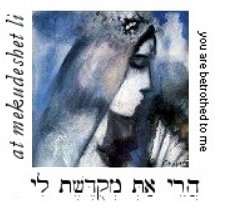
"Grace is not looking for good men whom it may approve, for it is not grace but mere justice to approve goodness. [Rather] it is looking for condemned, guilty, speechless and helpless men whom it may save, sanctify and glorify." - C. I. Scofield
05.29.25 (Sivan 2, 5785) Right now, as you are seeing this, take a moment to reaffirm that the Lord Yeshua is your deliverer and that you trust in Him for eternal life. He promises the trusting heart: "I tell you the solemn truth, the one who hears my message and believes in the One who sent me has (i.e., present active indicative) eternal life and will not be condemned, but has passed over (literally, "crossed over") from death to life" (John 5:24).
Note that the verb translated "has passed over" is "perfect active" that expresses completed action: "this one has already crossed over from death to life." In other words, the gift of eternal life is an accomplished reality (though it is only experienced as we truly surrender to the love and grace of God from a heart of faith). The "basis" of life is now radically new and of a different order. As the apostle Paul later summarized: "For it is by grace you have been saved (i.e., a perfect passive participle that denotes completed action done on your behalf with effects that continue to the present) through faith, and this is not from yourselves, it is the gift of God, not a result of works, so that no one may boast" (Eph. 2:9-10). I'm so glad it's not the strength of my grip that keeps me holding on to God, but the strength of His...
So "be strong and of good courage" – chazak ve'ematz! The Lord our God promises "never to leave you nor forsake you" and to be with you wherever you go (see Josh. 1:5,9; Heb. 13:5, Psalm 139; Matt. 28:20). In the Greek New Testament, the wording of Hebrews 13:5 is highly emphatic: Οὐ μή σε ἀνῶ, οὐδ᾽ οὐ μή σε ἐγκαταλείπω: "Not ever will I give up on you; no, not ever will I leave you behind." Alevai! May you hear the voice of the Good Shepherd calling you, and may He forever keep you under His watchful care. Amen.
Hebrew Lesson
Isa. 43:1 Hebrew reading (click):
The Great War for Souls...

"For our struggle is against spiritual forces of evil..." Eph. 6:12
05.29.25 (Sivan 2, 5785) Ultimately we are living in the midst of a great spiritual war -- the war for truth. This has been the battle from the beginning. The very first recorded words of Satan (הַנָּחָשׁ) questioned God's truth: "Did God really say...?" (Gen. 3:1). In the end there will be found two types of people: those who love the truth and those who love the lie. These are the children of light (בְּנֵי הָאוֹר) and the children of darkness (בְּנֵי הַחשֶׁךְ), respectively. Followers of Yeshua the Messiah are told to "walk as children of light" / ὡς τέκνα φωτὸς περιπατεῖτε (Eph. 5:8). The children of light are called to be am kadosh - a holy people - separate from the evil engendered by the fallen world and its forces, just as the very first creative expression of God was the separation of light from darkness (Gen. 1:3-4). The children of light "hate evil and love the good," and conversely, the children of darkness "hate the good and love evil" (Psalm 34:21, Prov. 8:13, Amos 5:15, John 3:20-21). Regarding the heavenly Zion to come, it is written: "nothing unclean will ever enter into it, nor anyone who does what is detestable or practices falsehood (lit. "makes a lie"), but only those whose names are written in the Lamb's book of life" (Rev. 21:27).
We must stand for the truth, because the truth is what sets us free (John 8:32). As Yeshua said, "For this purpose I was born and for this purpose I have come into the world -- to testify to the truth. Everyone who is of the truth listens to my voice" (John 18:37). We must turn away from the lie to embrace the truth. One day all that is hidden will become manifest. "As I looked, thrones were placed, and the Ancient of Days took his seat; his clothing was white as snow, and the hair of his head like pure wool; His throne was ablaze with fire and its wheels were all aflame. A river of fire was streaming forth and proceeding from his presence; a thousand thousands served him, and ten thousand times ten thousand stood before him; court sat in judgment, the books were opened" (Dan. 7:9-10).
If the devil can't kill you, he will try to make you insane... He will lie to you about who you really are; he will attempt harass you and vex your soul. He will whisper fearful things in your ear... He will make what is small seem big and what is big seem small. He will raise dark suspicion within your soul, causing you to walk in mistrust. He will remind you of your sins to make you feel ashamed and dirty. He will hiss that you are unlovable and unworthy. He will argue on behalf of your flesh that you deserve better than this... He will tempt you to seek relief in cisterns of emptiness and futility. Most of all, he will try to cast a spell to make you forget that you are truly a prince or princess of God Almighty... The devil seeks to drive you into the exile of loneliness and despair. Resist him in the Name of the LORD!
Fret not, therefore, because of evil doers, for they shall soon wither away (Psalm 37). The Great Accounting is coming: "For there is nothing created that is hidden - אין יצור נסתר - but all things are naked and open to the eyes of the One to whom we must render an account" (Heb. 4:13). Every thoughtless word shall be accounted for in the Day of Judgment to come (see Matt. 12:35-37). Recompense is indeed coming, though it is reserved for the LORD God alone, who is ha'shofet ha'tzaddik (השופט הצדיק) - the Righteous Judge (Psalm 7:11). "According to their deeds, accordingly He will repay, fury to His adversaries, recompense to His enemies; to the coastlands He will repay recompense" (Isa. 59:18).
Hebrew Lesson
Ecclesiastes 12:14 reading (click):
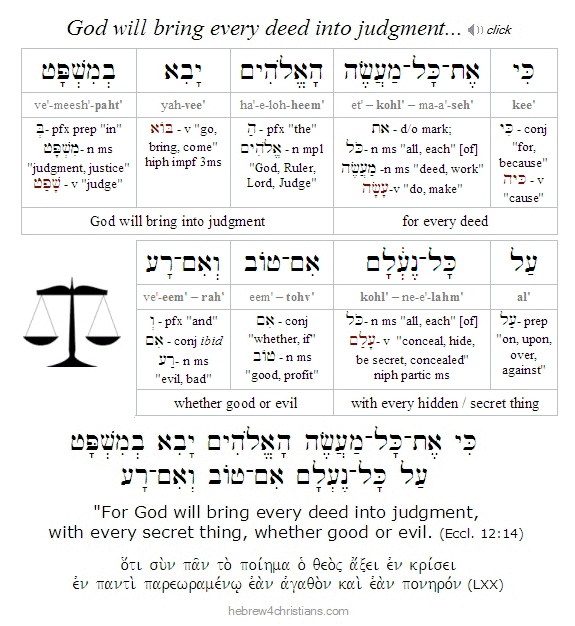 |
Prelude to the Desert:
Overview of the Torah...

05.28.25 (Sivan 1, 5785) The following provides a brief overview of the Torah as a contextual "prelude" to our study of the Book of Numbers... I hope you will find it helpful, chaverim.
The Book of Genesis...
The Book of Genesis (i.e., Sefer Bereshit [סֵפֶר בְּרֵאשִׁית]) describes the creation of the world, the transgression of Adam and Eve, the promise of the coming Savior, and the subsequent lapse of the human race into godlessness and depravity. The wicked generations of Cain caused the world to be entirely steeped in anarchy and bloodlust, so that "every intention of the thoughts of man's heart was only evil continually." After ten generations, the LORD "had enough" and destroyed the human race by means of the great flood. Only Noah and his immediate family were spared. Noah had three sons, of whom God chose Shem to be the high priest of the remnant of the human race. From Shem's line would ultimately come Abraham, the father of the Jewish people. Of course Abraham had a son named Isaac, and Isaac later had a son named Jacob. From Jacob (who was renamed "Israel") were born twelve sons, each of whom became patriarchs of the twelve tribes of Israel. Jacob's treasured son Joseph, however, was sold into slavery by his envious brothers, but later God promoted him to great power in the land of Egypt. The Book of Genesis ends with Joseph's dramatic reconciliation with his family, who then emigrated to Egypt to escape a devastating famine in the land of Canaan. Before his death, Jacob blessed his sons and confirmed the coming of the Savior through the tribe of Judah.
The Book of Exodus...
The Book of Exodus (i.e., Sefer Shemot [סֵפֶר שְׁמוֹת]) describes how the family of Jacob (i.e., the twelve tribes of Israel) multiplied into a great nation while dwelling in the land Egypt. Eventually, however, the Egyptians came to regard these "outsiders" as a political threat and convinced the Pharaoh to enslave and to grievously oppress them. The book describes how God intervened on behalf of Israel and chose Moses (and Aaron) to confront the Pharaoh and to demand that the Israelites be set free. Pharaoh refused Moses' repeated appeals, however, despite plagues of warning visited upon the Egyptians. As a final act of judgment, God instituted the Passover and killed all the firstborn sons of the land of Egypt. Moses and the Israelites then fled from Egypt, crossing the Red Sea into the Midian desert as directed by the Pillar of Cloud and Fire. When the people finally convened at Mount Sinai 49 days later, they received the Ten Commandments, and Moses was called up the mountain to receive the vision of the Tabernacle. While Moses was on the mountain, however, the Israelites forged a Golden Calf and worshipped it, and God threatened to destroy the people. Moses successfully interceded on their behalf, however, and after a period of national teshuvah (repentance), the covenant was renewed. The remainder of the book describes the architectural details and the construction of the Tabernacle, which was finally assembled and consecrated a year after the Exodus from Egypt (i.e., on Nisan 1). The Book of Exodus ends with the Glory of the LORD filling the newly built sanctuary: "For the cloud of the LORD was on the Tabernacle by day, and fire was in it by night, in the sight of all the house of Israel throughout all their journeys."
The Book of Leviticus...
Moses' brother Aaron had been selected to be the first High Priest of the Jewish people, and Aaron's sons were designated as Israel's priests. Since the Tabernacle was intended to symbolize God's Presence among the people, Moses undoubtedly instructed Aaron and his sons (along with the other Levites) about their forthcoming responsibilities. The Book of Leviticus (i.e., Sefer Vayikra [סֵפֶר וַיִּקְרָא]) is therefore called Torat Kohanim - the Law of the Priests - since it deals largely with the service of the priests in the Tabernacle (the book was probably originally written during the six months when the Tabernacle and its furnishings were being made). The laws of sacrificial offerings are therefore detailed, as well dietary laws, laws regarding purity and impurity, and specific rituals for purifying the sanctuary. Throughout the book the holiness of God is stressed, with the corresponding duty for the priests and the people to be holy themselves. Apart from the narrative concerning the days of the Tabernacle's consecration (i.e., the death of Aaron's sons), the book itself is "timeless," with an emphasis on the need for blood atonement and sacrificial rituals to draw near to God. The Book ends with a list of blessings for obedience and curses for disobedience to God's law.
The Book of Numbers...
Although it appears after the Book of Leviticus in the Torah scroll, the Book of Numbers (i.e., Sefer Bemidbar [סֵפֶר בְּמִדְבַּר]) picks up precisely where the Book of Exodus left off, with the Glory of the LORD hovering over Tabernacle as the Israelites camped at Sinai. The book opens: "The LORD spoke to Moses in the desert of Sinai, in the tent of meeting, on the first day of the second month, in the second year after they had come out of the land of Egypt, saying, take a census of all the congregation of the people of Israel, by clans, by fathers' houses, according to the number of names, every male, head by head" (Num. 1:1-2). After the adult men were counted (the result of 603,550 is identical to earlier number in the Book of Exodus (cp. Num. 1:45-46; Exod. 38:26-27)) - the tribes were meticulously arranged into military camp formation around the Tabernacle. It should be noted, however, that the narrative in the book is not presented in entirely chronological order, since later it is stated that Israel celebrated the Passover before this census was taken (cp. Num. 1:1-2; 9:1-5), and the commencement of the journey to the promised land began when the Divine cloud lifted from the Tabernacle and began moving towards the wilderness of Paran (Num. 10:11-12). Besides, very little is told us about the 38 years of wandering in the desert, though certain spiritually significant episodes are described in the text... At any rate, the purpose of the census appears to be military, and only true Israelites were allowed to fight in God's battles (i.e., none of the "mixed multitude" were eligible). However, despite being personally led by the Shekhinah cloud by day and the pillar of fire by night - with the Divine Presence encamping in their midst and protecting them on all sides - the Israelites repeatedly rebelled against the LORD. When the camp of Israel finally drew near to the promised land, the people lapsed in their faith and succumbed to the fears expressed by the faithless spies. This sin led to God's judgment that Israel's entry into the land would be delayed for an additional 38 years, during which time every person 20 years of age and older was fated to die in the wilderness - except for Joshua the son of Nun and Caleb son of Jephunneh, the two faithful spies. Truly it has been said that it was easy for the LORD to take the people out of Egypt, but it was hard for Him to take Egypt out of the people....
Following this tragic judgment, God turned the people back to the desert and restated various laws regarding the Tabernacle. Moses' cousin Korach - joined by other prominent leaders of Israel - then rebelled by challenging God's designated leadership and calling for the people to return to Egypt. After God destroyed the rebels and vindicated the priesthood of Aaron and his sons, the people wandered in the desert for several more years. After further tests and failures of the people - including Moses' own lapse at Kadesh Barnea which led to his banishment from the promised land - the 38 year period of exile finally drew to a close. Another census was taken, and Joshua was commissioned to lead the people into the land. The Book of Numbers ends with the next generation of Israel beginning to conquer the region of Canaan east of the Promised Land.
The Book of Deuteronomy...
The Book of Numbers marks the end of the historical narrative of the Torah, since it briefly describes the Israelites arrival at the end of their journey, the impending death of Moses, and the appointment of Joshua as the new leader of the people (the Book of Deuteronomy (i.e., Sefer Devarim [ספר הדברים]) presents Moses' final sermon before he died). In Jewish tradition, the book is generally not regarded as a book of law, though the sages discover various forms of "case law" in its pages (e.g., the case of the inheritance of the daughters of Zelophehad). Instead, the book functions as a warning of the need to adhere to God's Torah and to exercise faith in His provision for the people. It ends with a note of hope, as the surviving generation begins to take hold of God's promise and enter into the land...
The Grand Narrative of Torah...
On a "macro level," the Torah tells the story of our pilgrimage to Zion, the mountain of the LORD that will one day fill the whole earth.... Genesis describes our creation and fall; Exodus describes our bondage and deliverance; Leviticus describes the walk of holiness; and Numbers describes the test and refinement of our faith (Deuteronomy is "mishneh Torah," the retelling and review of the inner meaning of the first four books).
It has been rightly said that the Book of Numbers displays both the "goodness and the severity of God" (Rom. 11:22). The New Testament cites various acts of rebellion mentioned in the book as "parables" or examples that were recorded so that we might be warned to keep our faith resolute (1 Cor. 10:1-12; Rom. 15:4). The Apostle Paul wrote, "Now these things took place as examples (i.e., τύποι, "types") for us, that we might not desire evil as they did... they were written down for our warning (νουθεσία) on whom the end of the ages has come" (1 Cor. 10:6, 11). Part of the wonder of the Exodus generation is that "the deeds of the fathers are signs for the children" (מַעֲשֵׂה אֲבוֹת סִימָן לַבָּנִים), which means that the stories recorded in the Torah are "immortal" patterns intended to teach us spiritual truth. The faithlessness of the Exodus generation is therefore an eternal warning of failing to genuinely possess the promises of God... As Paul further states in this connection, "Therefore let anyone who thinks that he stands take heed lest he fall" (1 Cor. 10:12). We stand by trusting in the goodness of God and therefore we are warned about the severe consequences of unbelief.
Likewise, the Book of Hebrews warns that "older Exodus generation" was forbidden to enter into God's rest because of their unbelief. "Take care, brothers, lest there be in any of you an evil, unbelieving heart, leading you to fall away from the living God. But exhort one another every day, as long as it is called 'today,' that none of you may be hardened by the deceitfulness of sin. For we have come to share in Messiah, if indeed we hold our original confidence firm to the end. As it is written, 'Today, if you hear his voice, do not harden your hearts as in the rebellion" (Heb. 3:12-15). And again, "Therefore, while the promise of entering his rest still stands, let us fear lest any of you should seem to have failed to reach it. For good news came to us just as to them, but the message they heard did not benefit them, because they were not united by faith with those who listened" (Heb. 4:1-2).
May the Living God (אֵל חַי) give you the grace to truly trust in Him... May He forever keep you; may He guard you from the seduction of unbelief.... May you forever resist the temptation to lose your heart. Walk strong in the LORD and the power of His might!
Hebrew Lesson
Ezekiel 36:26 Hebrew reading:
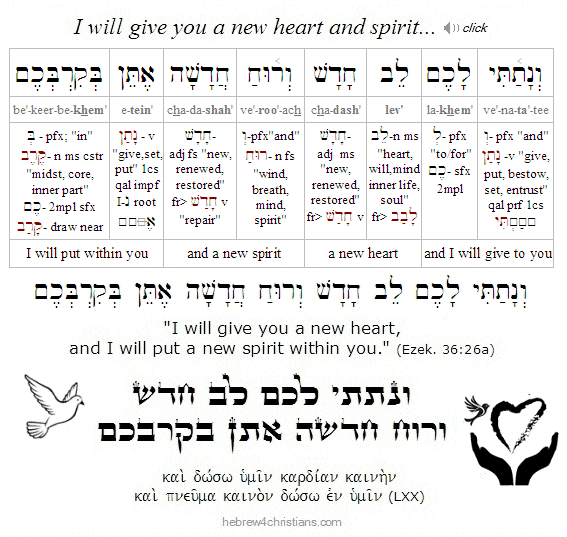 |
Accounted by God...
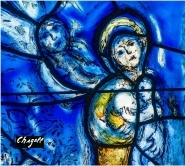
05.28.25 (Sivan 1, 5785) Shalom chaverim. Our Torah reading this week, parashat Bamidbar (פרשת במדבר), is always read just before the holiday of Shavuot (i.e., "Pentecost"), which is the time we celebrate "mattan Torah" (מתן תורה) -- the giving of the Torah of the LORD (first at Mount Sinai, and then later at Mount Zion). The reading begins: "The LORD spoke to Moses in the desert of Sinai... saying 'Lift up the head' (i.e., count) of the children of Israel (Num. 1:1-2).
Central to Sefer Bamidbar, or the Book of Numbers, is the counting of the person, identifying his "place" within the chosen vessel of Israel (Num. 1:52), and therefore the traditional sages link the idea of being counted by God with the giving of the revelation itself. In other words, as we come to know who we are as God's redeemed people, as we learn to reckon ourselves as his beloved, so we will receive Torah and be accounted among his people. Our heads will then be "lifted up," and we will receive the very first blessing of the Torah, namely: אנכי יהוה אלהיך - "I AM the LORD your (singular) God" (Exod. 20:2).
"The LORD spoke to Moses in the desert of Sinai... saying 'Lift up the head' (i.e., count) of the children of Israel (Num. 1:1-2). The Torah commentator Rashi insightfully noted that as we are counted, so we are lifted up and beheld by God. In other words your life matters to heaven, and you are counted worthy because of God's great redeeming love. The sages say that each of us is as a letter of Torah; each of us counts in God's book. Indeed our beloved Savior Yeshua said, "Even the hairs on your head are numbered" (Matt. 10:30).
May you lift up your head and be counted as one of God's own, friend....
Hebrew Lesson
Exodus 20:2 Hebrew reading:
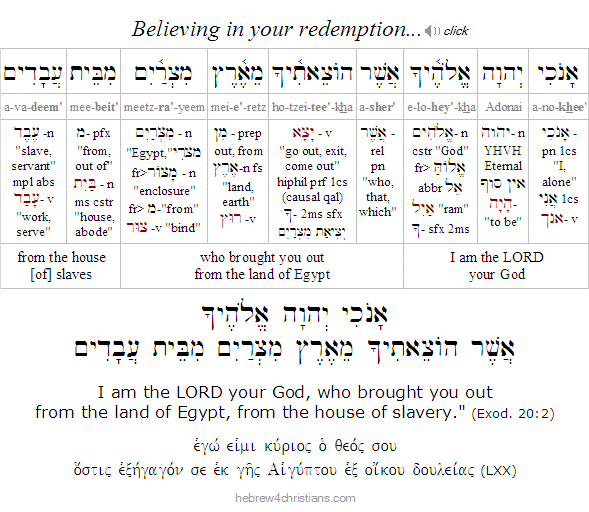 |
Hope against Hope...

05.27.25 (Iyyar 29, 5785) Life isn't easy, and even believers can get angry at God at times. For example, we may feel disappointed or resentful when bad things happen to us or to those whom we love, especially if we had prayed for God's intervention and help regarding the matter. Seemingly unanswered prayer can make us feel lonely and afraid about what is happening to us. We may begin to second-guess whether God really listens to us. We must be careful and ask God for solace and wisdom lest we turn numb inside..
Many of us are unhappy and feel empty throughout the passing of our days. Some waver in their faith, on the one hand affirming that they believe that God is faithful and good, while on the other hand wondering why God apparently left then when they needed him most. They wonder why, if God was not there for them in their most vulnerable moments, can he be trusted to be there for them in future times of trouble?
Some of us can talk a good talk about God and spirituality, but we fail to seriously practice the presence of God, we "forget" that the Lord is real, a "very present help in trouble," and therefore we "collapse back" into the murmur of godless thinking... Ironically enough, many of us are proud and yet hypocritical people. We tend to avoid certain obvious sins but secretly harbor hidden ones like envy, spite, fear, anger, selfishness, lust, gluttony, greed, and a general lack of charity. In short, we don't live up to our ideals or principles, and in our "fallenness" we discover -- if we are honest -- our great need for deliverance from ourselves. It is then that we discover that God has not abandoned us, but on the contrary, we have abandoned Him by turning to anger, hopelessness, despair, and bitterness. Honesty, however, is essential to healing, as Kierkegaard once said: "No person is saved except by grace; but there is one sin that makes grace impossible, and that is dishonesty; and there is one thing God must forever and unconditionally require, and that is honesty."
We must give our secret pain to God, even if we don't understand it, and even if it refuses to go away... Our hearts are often vexed; we are a mess of mixed motives; we are strong to be made weak, weak to be made strong. We bless and curse from the same mouth... And yet, despite all this, despite our inner contradictions, the dance between the "old man" and "new," the divided house of our lives - our present sorrows, our troubles, our fears – we must endure ourselves, we must press on, and we must never let go of hope in God's love. Never. Therefore we must not hide from God's presence, nor pretend to be something we are not. We are invited to come boldly before the throne of God's loving grace to receive help in our hour of need (Heb. 4:16).
"O Lord who alone makes us whole, 'heal me, O LORD, and I shall be healed, save me, and I shall be saved, for your are my praise' (Jer. 17:14). O LORD, forgive our sins and heal us of our wounds, or, at least help us to endure suffering with special grace to keep us from being distracted from the truth and glory of your love and Presence... Grant us strength to abide in your hope, until the very last day, and to keep watch for the ready hand of Your love... As we go from place to place, from this moment to the next, help us to behold the Sun of Righteousness that pervades our way. Amen.
Hebrew Lesson
Jeremiah 17:14 reading (click for audio):
Your heavenly Father "sees in secret," and that also means that he can and will save you from whatever is hidden within you that still resists his love and touch... This is a necessary condition of living faith. We have to trust in God's power to heal us, even when it seems that healing is not forthcoming, even when we still find ourselves divided, troubled, and anxious. We have to believe that God's help is always present for us (Psalm 46:1).
God sees what He does within us, His secret "it-is-finished" work, the effect of His great salvation within our hearts, even if at the present this may be hidden from our eyes... There is appearance, and there is reality; and only God sees what is ultimately real. We have to trust in His promise to be transformed into the divine nature, even if today we find ourselves sinful, needy, and in disrepair... כּל־יְמֵי צְבָאִי אֲיַחֵל עַד־בּוֹא חֲלִיפָתִי - "All the days of my struggle I will keep hope until my change comes" (Job 14:14). So don't give up, friends. We are saved by hope (ἐλπίδι ἐσώθημεν, Rom. 8:24), a hope for you today. Believe to see!
Hebrew Lesson
Job 14:14 reading (click for audio):
The Shepherd's Word...
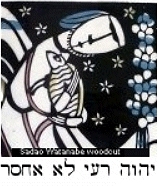
05.27.25 (Iyyar 29, 5785) The sages named the fourth book of the Torah "Bamidbar," meaning "in the desert," because the word occurs in its opening verse, and also because it aptly describes the Israelites' forty years of wanderings in the desert of Sinai after the great Exodus. Because God commanded a census of people to be taken several times in the book, however, the midrash calls it "Sefer Ha'pikudim" (ספר הפקדים), or the "Book of Countings," from which the English translation "the Book of Numbers" is derived. Interestingly, the Hebrew word for desert (i.e., midbar: מִדְבַּר), originally meant "from where the cattle are driven," that is, an area of pasturage that was uninhabited and fit for animal grazing. The Hebrew root "davar" (דבר) means "word" but also means "shepherd," evoking the call and direction of one who would guide his flock.
The book begins: "The Lord spoke (דבר) to Moses in the desert of Sinai, in the Tent of Meeting" (Num. 1:1). Now recall that during their wandering in the desert God's presence was symbolized by the Mishkan, or "Tabernacle," a central tent-like structure that had a secret inner chamber called the Holy of Holies, and within that hidden chamber was a sacred chest called the Ark of the Covenant (ארון הברית) that held the tablets of the Ten Commandments (עשרת הדברים). Upon the cover of the Ark, called the kapporet, were two cherubim (angelic figures), and it was there that God's voice was heard (see Exod. 25:22).
In light of this, among other things we can understand the book of Bamidbar to recount God's shepherding words given to his people as they wandered through desert places in search of the fulfillment of the promise for their lives. The excursion into the desert is part of the journey of faith. God leads us by way of the desert - through struggle and waste places - to discipline our hearts to look for the greater hope of Zion.
Hebrew Lesson
Psalm 23:1-3a reading (click):
Blessings of the Desert...

05.27.25 (Iyyar 29, 5785) Our Torah portion this week (i.e., parashat Bamidbar) begins: "The LORD spoke to Moses in the desert of Sinai, in the tent of meeting (ohel mo'ed), on the first day of the second month, in the second year after they had come out of the land of Egypt" (Num. 1:1). Note again that the LORD spoke "in the desert" (ba-midbar) of Sinai, and that the Hebrew word for "desert" (i.e., midbar: מדבר) shares the same root as "word" (i.e., davar: דבר), which suggests that we hear the Word of God in a place of emptiness, brokenness and ongoing need.
But note further that the LORD spoke in the "tent of meeting" (אהל מועד), which may be read as the tent of "mo'ed" (מוֹעֵד), or "holiday." This suggests that we celebrate our need for God's healing and turn to him in a state of gratitude, even despite our sinful condition (Psalm 119:71). We take courage and draw near, renewed in trust. That is also why the verse says it was "the first day of the second month" (חדש השני בשנה) -- the Hebrew word "month" (chodesh) can be read as "new" (chadash), suggesting it was a time of renewal, a time to celebrate a new beginning (Acts 2:1-4).
When David prayed in his need: "Create in me a clean heart, O God, and renew a right spirit within me" (Psalm 51:10), the Hebrew may be read: "Create in me a pure heart, O God, and renew within me ruach nachon (רוח נכון) - a spirit of "Yes" (כן). As Paul said of Messiah our Healer: "All the promises of God find their 'Yes' in him" (2 Cor. 1:20).
Hebrew Lesson
Psalm 51:10 Hebrew reading:
 |
Getting Ready for Shavuot...
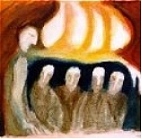
05.25.25 (Iyyar 27, 5785) We have a busy week ahead of us. First we honor Yom Yerushalayim ("Jerusalem Day)" that commemorates the prophetic reunification of Jerusalem and the Israeli control over the Old City. Second, we start reading the fourth book of the Torah, namely Sefer Bamidbar (ספר במדבר), or the "Book of Numbers." Finally, the month of Sivan begins Tuesday, May 27th at sundown, which heralds the conclusion of the 49 day countdown from the day following Passover (see Lev. 23:15-16). The first five days of the month anticipate the day the Torah was given to Israel at Sinai, namely, the sixth of Sivan (i.e., Shavuot), which comes exactly seven weeks (49 days) after the Exodus from Egypt.
In light of this, I hope to share some things related to both the Torah portion for this week, the significance of Jerusalem to us as followers of Yeshua, as well as the holiday of Shavuot (i.e., "Pentecost"), which occurs the following week (i.e., Sunday, June 1st after sundown). May the LORD show us grace as we study his Torah and review its significance as written upon our hearts in the Messiah (Jer. 31:31, Heb. 10:16, Jer. 32:40). Amen.
Upcoming Holiday Dates
- Yom Yerushalayim - Sun. May 25th at sundown (and the following day)
- Chodesh Sivan - Tues. May 27th at sundown (and the following day)
- Shabbat Bamidbar - Fri. May 30th at sundown (and the following Saturday)
- Shavuot ("Weeks, Pentecost") - Sunday June 1st at sundown - Tues. June 3rd
Hebrew Lesson
Psalm 119:15 reading (click):
Parashat Bamidbar...

05.25.25 (Iyyar 27, 5785) Our Torah portion for this week, parashat Bamidbar, is the first reading from the Book of Numbers, and is always read before the great holiday of Shavuot (i.e., "Pentecost"). The portion begins exactly where the Book of Exodus left off, that is, with the glory of the LORD (כְּבוֹד יְהוָה) hovering over the Mishkan (Tabernacle) as the Israelites were camped before Mount Sinai (see Exod. 40:38, Num. 1:1). On the first day of the thirteenth month following the great Exodus from Egypt – exactly thirty days after the Mishkan (Tabernacle) was first consecrated – God commanded Moses to take a census of all Israelite males over 20 years of age who would bear arms. Moses and the heads of each tribe recorded the results, with 603,550 men in all. This number did not include the Levites, however, since they were designated to take care of the Tabernacle during the journeys.
The LORD then gave instructions about how the Israelite camp was to be arranged. The Tabernacle would occupy the central location, with three clans of the Levites surrounding it on the north, south, and west (Moses and Aaron's tents were placed before the entrance on the east). The twelve other tribes were divided into four groups of three. All of the tents of the Israelites were to face the Tabernacle on every side. This camp formation was to be strictly maintained while traveling throughout the desert.
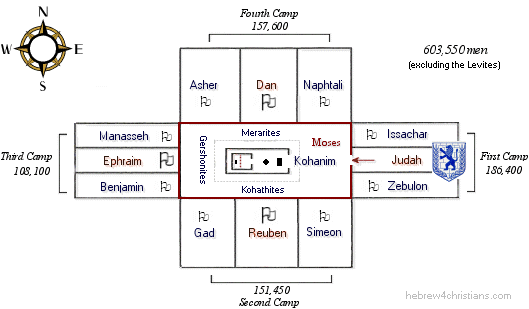 |
Each tribe had its own prince (i.e., nassi: נשׂיא), its own flag (i.e., degel: דגל) whose color corresponded with the color of its respective stone in Aaron's breastplate (Exod. 28:15-21). For example, Judah's stone was a sky-blue carbuncle and therefore the color of his flag was like the color of the sky with a "fiery lion" embroidered upon it (see Gen. 49:9).
The portion ends with a census of the three sons of Levi (בני לוי), namely Gershon (גרשׁון), Kohath (קהת), and Merari (מררי). The sons of Gershon (i.e., the Gershonites) were to maintain the inner tent of the Mishkan and were to be located on the west side of the courtyard; the sons of Kohath (i.e., the Kohathites) were to maintain the furnishings of the Mishkan such (as the Ark of the Covenant, the Menorah, etc.) and were to be located on the south side of the courtyard; and the sons of Merari (i.e., the Merarites) maintained the frames and pillars of the Mishkan and were located to the north of the courtyard. Finally, though the sons of Aaron were technically descendants of Kohath, they were set apart to serve as priests (kohanim) and were located before gate into the Mishkan to the east.
Strangers to this world...
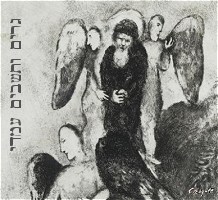
05.23.25 (Iyyar 25, 5785) Our Torah reading for this Shabbat (i.e., Behar) includes two special laws that were intended to radically affect the social, economic, and spiritual well-being of Jews in ancient Israel. The first law was to "release the land" every seventh year, called ha-shemittah (הַשְּׁמִטָּה), which meant that the land would lie fallow by not being seeded or harvested (see Lev. 25:1-6). The shemittah law involved far more than simply refraining from agricultural labor, however, since it implied that everyone was required to forgive all their debtors as well (Deut. 15:1-4). This recurring cycle of "rest and forgiveness" was to be commemorated as an appointed time (מוֹעֵד) when everyone would gather together during the festival of Sukkot to listen to the Torah read aloud (Deut. 31:10-12). God's word was proclaimed from Zion; the land would breath and rest; people's burdens were lifted; and everyone would dwell in booths (sukkot) to recall their temporary status on the way to obtaining an eternal inheritance... No wonder Sukkot was regarded as the most joyous of all of the Torah's holidays!
The second special law was even more joyous. After seven of these seven-year sabbatical cycles (shemittot) had elapsed, the 50th year (called the "Jubilee" year [i.e., shenat ha-Yovel: שְׁנַת הַיּוֹבֵל]) was proclaimed, and all servants would be set free (i.e., "released"), all debts would be forgiven, and the land would be "reset" to its original condition (Lev. 25:8-17). This joyful occasion is called the "Jubilee Release" and signifies the life of redemption (גְּאֻלָּה) for the community of God. It is also called Shemittah LaAdonai: "the LORD's Release" (Deut. 15:2). Just as Shavuot comes after seven cycles of seven days (i.e., the 50th day of Sefirat HaOmer) and therefore represents the perfection of freedom, so the Jubilee Year (Yovel) signals a time of freedom, dignity and equality for all people.
On Yom Kippur of the Year of Jubilee, a great shofar blast (i.e., teruah: תְּרוּעָה) would be sounded throughout all the land to proclaim liberty: "You shall sound the shofar on the tenth day of the seventh month, on the Day of Atonement (וֹם הַכִּפֻּרִים) shall you sound the shofar throughout all your land. And you shall hallow the fiftieth year, and proclaim liberty (דְּרוֹר) throughout all the land to all its inhabitants thereof: it shall be a Jubilee (יוֹבֵל) for you. And you shall return every man to his estate, and you shall return every man to his family" (Lev. 25:8-10). Despite the fact that part of this verse appears on the "Liberty Bell" in Philadelphia, this verse ultimately refers to the coronation of the Mashiach Yeshua as the true liberator of the Jewish people.... Indeed, the word yovel is another word for a ram's horn, or shofar, signifying the coronation of the King...
The observance of shemittah (שְׁמִטָּה) was a real test of faith, since it meant that the Jews had to completely trust that the LORD would provide for them, despite abandoning their usual farming and banking practices. God repeatedly warned the Jews not to oppress one another (Lev. 25:14,17) and explicitly promised His protection and care despite these counterintuitive practices (Lev. 25:18-22). Sadly, the people did not observe the laws of shemittah, and this eventually lead to the 70 year captivity in Babylon, one year in captivity for each year that shemittah was disregarded (2 Chron. 36:20-21).
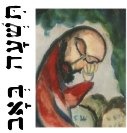
Regarding the laws of Shemittah and Yovel, the LORD states: "The land shall not be sold in perpetuity, for the land is mine, for you are strangers (גֵּרִים) and settlers (תּוֹשָׁבִים) with me" (Lev. 25:23). This is a paradoxical phrase, since a ger is one who is just passing through, like a visitor or tourist, whereas a toshav is one who is a resident, like a settler or citizen. How can someone be both a visitor and a resident of a place, or a stranger and a citizen at the same time? How can one "pass through" a place he is said to dwell?
Concerning this paradox the Maggid of Dubna comments: "If you see yourselves in this world as strangers and remember that you are here only for a short visit, passing through the hallway of this world, then I will settle among you. However, should you see yourselves as settlers on this world, "owners" who are here to stay, then I am but a stranger among you. Either you are the settlers and I the stranger, or you the stranger and I the settler."
Torah describes the people of faith as "gerim ve'toshavim imadi" (גֵרִים וְתוֹשָׁבִים עִמָּדִי), "stranger-settlers" with God in this world (Lev. 25:23). We are "in" but not "of" this realm; we live in the temporal yet are looking for the heavenly city to come (Heb. 11-9-10). Indeed the Eternal dwells among those who are exiles in this world, but to those who lay claim to life in this world God makes himself a stranger. .. As James warned, "Do you not know that friendship with the world is enmity with God? Therefore whoever wishes to be a friend of the world makes himself an enemy of God" (James 4:4). Likewise the Apostle John admonished: "Do not love the world or the things in the world. If anyone loves the world, the love of the Father is not in him... For the world is passing away along with its lusts, but whoever does the will of God shall abide forever" (1 John 2:15,17). Those who walk in faith invariably find themselves gerim v'toshavim, "strange settlers," upon the earth (Heb. 11:13).

Abraham "sojourned" in the land of promise, as in a foreign land, living in tents with his children because he looked for a city whose builder and maker was God (Heb. 11:9-11). Likewise we are strangers and exiles here, on the journey to the reach "the City of Living God, to heavenly Jerusalem, to the assembly of the firstborn who are enrolled in heaven" (Heb. 12:22-23). When we take up the cross and follow Yeshua, we die to this world and its dreams. We die to ourselves in order to find life (Mark 8:35-36). We give up houses, lands, all our possessions, family relationships, and even our own lives in order to find residence with God (Matt. 19:29; Luke 14:26). We reckon ourselves "dead" to this world as our home and "look not to the things that are seen but to the things that are unseen; for the things that are seen are transient, but the things that are unseen are eternal" (2 Cor. 4:18). We walk by faith, not by sight. Faith is the conviction (ἔλεγχος) of things unseen (Heb. 11:1) - and that includes the conviction that God will visibly care for our needs even if we let our gardens go fallow and release our claim on all our debtors...
We must venture out to take hold of the miraculous Presence of God. "According to your faith be it done unto you" (Matt. 9:29). I pray that we do not miss this awesome opportunity to truly share the present exile with God, chaverim, for one day those who are "strangers" with Him shall share His glory.... Meanwhile, we are not without comfort, though we still groan for the great homecoming to come.
Hebrew Lesson
Psalm 39:12 reading (click for audio):
When we are strangers to this world, we reside with God: we are called residents of heaven. To be a stranger to this world is a great blessing, since it means we identify our home in the heart of God. By extension, reality is measured by proximity to the Eternal, and the material world - when regarded as an end in itself - is nothing but an illusion, since it cannot exist apart from the sustaining power of God (Heb. 1:3; Col. 1:16-17; Rev. 4:11). The sages note that in Hebrew there is no language of categorical ownership, since all things are conditioned by time. We say yesh li (יש לי) - "there is to me" (for this time) rather than "I have" or own. Ownership is related to the "bone" (עצם) of something, its inner structure and essence. God alone is koneh shamayim va'aretz (קנה שׁמים וארץ), the Owner of Reality (Gen. 14:19). "For from him and through him and to him are all things. To him be glory forever. Amen" (Rom. 11:36).
Deliverance from Fear...

05.23.25 (Iyyar 25, 5785) Many of us need to grow up and take responsibility for our lives. Often we are full of anger and inner conflict. We rage at life and are quick to blame others, but inwardly we are really afraid, for our "outrage" is just a disguised form of fear. And yet fear itself ultimately arises from unbelief, or rather from the faith that either God doesn't exist or doesn't care for us, and therefore the voice of fear seduces us to feel alone, victimized, insecure and afraid (if you verbalize what you are afraid of, eventually you will hear yourself questioning whether God is in control or whether he is there for you).
Tragically, the more we cling to our fear, believing that it will somehow "protect us," the more we become fearful (and angry) people. To worry is to "practice the absence" of God instead of practicing his presence, and the longer we practice that kind of "faith," the more we will experience exile. We must decide to renounce our fears by trusting in the LORD our God and relying on his promises.
Refuse, therefore, those anxious thoughts that weigh in upon you, creating pressure and "dis-ease" (Psalm 139:23-24). Seek the LORD for deliverance in the midst of your storm. Be still and know that God is real; quiet your heart and listen for the holy whisper: "It is I; do not be afraid..." There is no fear in God's love. As the Spirit says, "In returning and rest you shall be saved; in quietness and in trust shall be your strength" (Isa. 30:15). The truth of God sets you free indeed (John 8:32).
Hebrew Lesson
Psalm 34:4 reading (click):
"The trouble with the world," sighed the teacher, "is that human beings refuse to grow up." "When can a person be said to grow up?" asked a student. "On the day he does not need to be lied to about anything" (Anthony de Mello).
As a Grain of Mustard Seed...
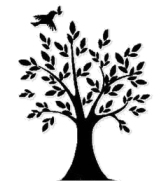
"If you have faith as a mustard seed..." (Matt. 17:20)
05.23.25 (Iyyar 25, 5785) During the Second Temple period it was common to liken a very small amount of something to be a "mustard seed," as for example when Yeshua said: "If you have faith as grain of a mustard seed, you can say to this mountain, "Move from here to there, and it shall move" (Matt. 17:20). Yeshua also likened the transformation of the tiny mustard seed into a large plant to illustrate the how the kingdom of God grows from a minuscule beginning into something prodigious and wonderful: "The kingdom of heaven is like to a grain of mustard seed, which a man took, and sowed in his field, which is the among the smallest of all seeds, but when it is grown it becomes a tree, so that the birds of the air come and lodge in its branches" (Matt. 13:31-32).
Yeshua points to the hidden workings of a tiny seed buried in the earth that would mysteriously bring forth a place of refuge and beauty. The mustard seed is inconspicuous, lowly, and does not produce a mighty tree like the exalted cedar or brawny oak, but it neverthess produces a lovely habitation for life where the birds of the air find refuge and perch among its branches.
Man looks on the outside, but the LORD looks upon the heart (1 Sam. 16:7). Yeshua's parable of the lowly mustard seed was intended to teach that we should consider matters from an eternal perspective. Recall that that the Tabernacle (or "Mishkan") was a relatively small tent-like structure when compared to the grandiose monuments of ancient Egypt, and yet that is where the LORD chose to symbolize his Presence among the people. The world is impressed with proud structures and symbols of temporal power, but God's kingdom is marked by the seemingly small, the overlooked, and the insignificant. Like the hidden light of the menorah in the Tabernacle, the deeds of the humble are beheld inwardly, where the Heavenly Father sees in secret (Matt. 6:4). To the heart of the lowly and trusting Yeshua says: כִּי מַלְכוּת הָאֱלהִים בְּקִרְבְּכֶם / "The Kingdom of God is within you" (Luke 17:21).
As I have mentioned before, there is a "transposition" of values, a "holy irony," in the realm of the Spirit. From God's perspective that which considered great in the eyes of men is considered of little account, and that which is considered insignificant in the eyes of men is considered of great importance (Luke 9:48). The wisdom of this world (i.e., pragmatic, self-promoting egotism, etc.) is regarded as folly before God (1 Cor. 1:20, 3:19). Therefore Yeshua "made himself nothing" and disguised himself in the form of a lowly servant (ἀλλὰ ἑαυτὸν ἐκένωσεν μορφὴν δούλου λαβών).
Like the seed that has to die and be buried in the earth to bear fruit, so we must mortify ourselves in humility (John 12:24). "Whoever wants to save his life will lose it, and whoever will lose his life will save it" (Luke 17:33). Yeshua Himself was crucified in weakness. He did not overcome evil in his own strength but yielded himself to God's providential will. By so doing, his weakness was transformed into the power of the redemption of God (2 Cor. 13:4). To the jaded eye of godless worldliness, Yeshua's death signaled defeat and failure, and yet God's way of doing things is often the very opposite of what we might expect. Again, the LORD chooses the lowly, the inconsequential, and the powerless to overthrow the vanity and variegated delusions spawned from human pride.
This is the basic pattern. God begins small, in hidden ways, and with the most unlikely of people, to do his will. From a carnal perspective Yeshua's disciples were a gaggle of misfits and nobodies, but from God's perspective they represented the miracle of a heart transformed by his power and splendor. God's kingdom is "not of this world," and that means that it will never enjoy the prominence of worldly glory.
The "mustard seed" of faith means that it is not our great faith in God that matters as much God's great power to transform our hearts. We must be careful not to turn faith into a disguised form of works righteousness: Our faith is what it is only by virtue of the greatness and goodness of the Living God who delivers and heals us from our fallen estate.
The life of the seed is a hidden miracle (i.e., nes nistar: נֵס נִסתָר), its death, burial, and regeneration reveal the principles of the kingdom embodied in Lord Yeshua our Savior. Just as the cross of Messiah appears foolish and confounds the eyes of the world, the eye of faith beholds it as the revelation of the power of God. As it is written: "God has chosen the foolish things of the world to confound the wise; and God has chosen the weak things of the world to confound the things which are mighty; and the base things of the world and the things which are despised God has chosen, and the things which are not, to bring to nothing the things that are, that no flesh should glory in His presence" (1 Cor. 1:27-29). Indeed, as the world regards the message of the gospel to be "foolishness," the Lord regards the "wisdom" of the world to be a trap for the proud of heart: For it is written, "He catches the wise in their own craftiness, and the counsel of the cunning comes quickly upon them" (Job 5:13).
The seed of faith represents the divine life of God within the heart (1 Pet. 1:23). And just as the seed works "automatically" to yield its fruit (Mark 4:26), so the Spirit of God produces the fruit of God's Spirit in the life of the believer. This is an unconscious process realized by the grace and mercy of God. "Who despises the day of small things?" the Lord asks (Zech. 4:10). Be still and know that I am the LORD who heals you (Exod. 15:26; Psalm 103:1-3).
God hides that we may seek him. "Behold, the LORD passed by, and a great and strong wind tore into the mountains and broke the rocks in pieces before the LORD, but the LORD was not in the wind; and after the wind an earthquake, but the LORD was not in the earthquake; And after the earthquake there was a fire, but the LORD was not in the fire. And after the fire there was the sound of a still small voice" (1 Kings 19:11-12). The Hebrew phrase for "still small voice" (i.e., kol demamah dakah: קוֹל דְּמָמָה דַקָּה) means "a calm, crushed voice," that is, the voice of the Savior of Israel who surrendered himself as the Promised Seed who would die, be buried, and be raised up to produce the fruit of the Spirit in those who put their trust in Him. Yeshua, indeed, is the "Mustard Seed" of our confession -- seemingly small but when sown within the heart of faith becomes the habitation of the very presence of God...
Hebrew Lesson
Psalm 97:11 Hebrew reading (click):
A Heart of Wisdom...

If you leave everything in God's hands, eventually you will see God's hand in everything....
05.22.25 (Iyyar 24, 5785) Since everything is under God's personal supervision, it is forbidden to regard actions and outcomes as the result of accident, chance, "luck," happenstance, or fate... Those are all pagan ideas, based in ignorance and superstition.
Faith in the true God is grounded in unqualified trust that He is Adonai Ro'einu (יהוה רעִֵנוּ), the LORD our Shepherd, the One who restores your soul, and that conviction provides the framework for apprehending the truth of Torah.
A lost faith regards the events of life as random, based on "fortune," and blind chance; it no longer sees God's hand in the affairs of daily life, but consigns the Divine Presence to a place of functional exile. For this the "like for like" judgment is given: as you regard your life as the product of random forces, so you will be unable to discern God's hand in your daily life.
We trust that "all things work together for good" (Rom. 8:28) and therefore we bless God for perceived evil as well as for perceived good, since all circumstances of life come from the hand of the LORD our God. We believe in an all-powerful, supreme LORD who has not abandoned the world, but who actively sustains and upholds it with benevolent intent.
When difficult things happen to the righteous, we trust in God's personal care for their ultimate good, despite their present troubles. "Though he slay me, I will trust in Him" (Job 13:15). What's perhaps most heroic about Job is that he never turned away from hope, despite the crucifixion of his world. As Kierkegaard said, "The moment the LORD took everything away, he did not say, 'The LORD took away,' but first of all he said, 'The LORD gave..." (Upbuilding Discourses). "Adonai natan..." This is the heart behind Kaddish, the mourner's prayer, that expresses acceptance of God's world, despite pain, sorrow, and loss.
Therefore may God "teach us to number our days aright that we may get a heart of wisdom" (Psalm 90:12). The sages say on the day of death, one considers one's life as if it had been a single day... Life goes by so quickly, and we never know when our personal "Rosh Hashanah" will come. "No one knows the day or hour..." That's why it is so vital to be healed and to turn to God while there is still time.
So turn to him today and bacharta ba'chayim – "choose life!" "For this commandment (of turning to God in faith) is not hidden from you, and it is not far away. It is not in heaven... nor across the sea.... Rather, the matter is very near you – in your mouth and your heart – to do it" (Deut. 30:11-14; Rom. 10:8-13).
Hebrew Lesson
Psalm 90:12 reading (click):
Dangers of Carelessness...

05.22.25 (Iyyar 24, 5785) This week's Torah portion (i.e., Bechukotai) includes the first great "rebuke" (i.e., tochechah: הוכחה) of the community of Israel given in the Scriptures (the second is found in Ki Tavo, i.e., Deut. 28:15-68). In this sober and ominous section, God promises the people great blessing if they would obey Him (Lev. 26:3-13), but He forewarns that exile, persecution and other progressively worse punishments would befall them if they would break faith with Him (Lev. 26:14-46).
The sages note that divine censure would come if the people "forgot" about God or otherwise became careless in their observance of His laws. They point out that the refrain "if you walk contrary to me" (והלכתם עמי בקרי) - which occurs several times during the rebuke - really means "if you walk carelessly (i.e., keri: קרי) with me." Rashi notes that the verb קָרָה means "to befall" or "to happen" and therefore suggests a sense of randomness (the related word mikreh [מִקְרֶה] means "coincidence"). If the people regarded the events of life as "random," God would reciprocate by bringing senseless trouble into their lives...
For this reason the sages regard a careless attitude about God's will as the very first step to inevitable apostasy. In other words, regarding whatever happens in life as mere "coincidence" essentially denies God's Presence (hashgachah pratit), and this attitude will eventually call for God's corrective intervention. People may be "hot or cold" regarding their relationship with Him, but God will never give the option of affecting indifference toward Him... Indeed, God often brings hardship into our lives to regain our attention and cause us to return to Him. As C.S. Lewis once said, "God whispers to us in our pleasures, speaks to us in our conscience, but shouts in our pains: It is His megaphone to rouse a deaf world."
The portion begins, "If you walk in my statutes (i.e., bechukotai: בחקתי) and guard my commandments and you do them..." (Lev. 26:3), which led Rabbi Hanina to ask why the seemingly superfluous phrase, "and you do them" (וַעֲשִׂיתֶם אתָם) was included here. After all, if the people would walk in God's statutes and guard his commandments, wouldn't they necessarily be doing them? He then suggested that the vowels of the word otam ("them") should be vocalized as atem (אַתֶּם), "you," which would then change the sense of the phrase to become, "you shall make (עָשָׂה) yourselves" (i.e., into God's image). The logical corollary of this seems to imply that if you do not walk in God's statutes and guard his commandments, you will disfigure the image of God within you...
Interestingly, God specifically cites the failure to observe the Sabbatical Year (i.e., shemittah), mentioned earlier in parashat Behar, as part of the reason why His judgment would come (see Lev. 26:34-35,43). The observance of the Sabbatical Year, of course, required complete faith that God was in control of all the "happenings" of nature. Like the Sabbath day, the Sabbatical year was designated to proclaim that God is the King of the universe. Those who disregarded this law therefore denied God's rule over nature, and thereby denied the existence of spiritual reality that ultimately governs the physical world...
The Scriptures warn us to "pay more careful attention to what we have heard so that we do not drift away" (Heb. 2:1). We must be anchored to the truth lest we become shipwrecked in our faith. Drifting occurs slowly and almost imperceptibly, though the end result is as deadly as openly turning away from God in outright apostasy. As C.S. Lewis once wrote, "The safest road to hell is the gradual one - the gentle slope, soft underfoot, without sudden turnings, without milestones, without signposts." The devil seeks to lull you to sleep...
Spiritual danger is just as real as physical danger, though most people pretend it isn't because it isn't as easily seen. The danger today is to give up hope, to "go with the flow," to become numb, to drift off asleep, and to die inside... It is far more dangerous to tranquilly ignore God's mercy, or to make a pretense of knowing God's grace, than it is to blatantly break his law. Therefore the urgent need is to remember, to hear, and to awaken the soul to face the truth about reality. We must focus the heart, concentrate the will, and consciously "set" the Lord always before us (Psalm 16:8). Each day we must awaken from our native emptiness to reaffirm the central truth: "Hear, O Israel, the LORD is our God; the LORD is one; and you shall love the LORD your God with all your heart and with all your soul and with all your might" (Deut. 6:4-5). As the Apostle Paul said, "Awake, you who sleep, Arise from the dead, And Messiah will give you light" (Eph. 5:14).
Therefore we must be vigilant to secure our high calling in Messiah: "Let us know; let us press on (i.e., נִרְדְּפָה, "pursue after") to know the LORD; His going out is sure as the dawn; He will come to us as the showers, as the spring rains that water the earth" (Hosea 6:3). The day is drawing near, and now - more than ever - we must remain steadfast. May God help you pursue him be'khol levavkha – "with all your heart" – because He has promised, "You will seek me and find me, when you seek me with all your heart" (Jer. 29:13). And may the love of the LORD be upon you, even as you put your hope in him (Psalm 33:22).
Hebrew Lesson
Jeremiah 29:13 Hebrew reading (click):
For more on this subject, see "The Tochechah: Further Thoughts on Bechukotai."
Believing God's Heart...

"When you read God's Word ... continually to say to yourself: 'It is I to whom it is speaking' - this is earnestness, precisely this is earnestness. This is most crucial, as unconditionally the condition if you are to come to see yourself in the mirror." - Kierkegaard
05.21.25 (Iyyar 23, 5785) "Our Lord Jesus oftentimes said, 'This I am. This I am. I am what you love. I am what you enjoy. I am what you serve. I am what you long for. I am what you desire. I am what you intend. I am all that is'" (Julian of Norwich). Amen to such beautiful words. And we should attend to stirring of our hearts, our deepest desires, since they ultimately find their end in God. As C.S. Lewis noted, our longing for a love which no experience in this world can fully satisfy is a sign that were made for God's eternal love.
We seek beauty, peace, love, and life, but the Lord says that he is the substance and heart of all these things... The lilies of the field do not toil but are arrayed in God's pleasure and design; the birds do not store up their food in barns but are sustained to take wing in the winds of God's hovering presence. Every hair on our head is numbered; there is not a word on our tongue unheard by your Heavenly Father.
Imagine Yeshua saying the following words directly to you: "I am the bread of life. I am the substance of what satisfies your hunger. I am essential for life. I am the manna that comes down from heaven to feed you and make you forever alive. I give you sustenance and strength; I will give you living water that will be like an oasis for your heart - the Spirit of Life that will comfort you. Blessed are those who hunger and thirst for righteousness, for they shall be satisfied. I alone can satisfy your deepest needs and longings. I am Life itself, the source and blessing of all that is good and worthy and true.
I am the light of the world. I give to you the light of life. My presence will guide your way. I will turn your darkness into light. In me is the fountain of life; in my light you shall receive light... I will give you a heart to know me. I am the Word of God: the Voice and revelation of the LORD, the Source of all truth. I am the LORD who brings you out of the darkness of your bondage; I am the one who redeems you, the one who atones for you, the one who suffers and dies for you to remove what separates you from God's Presence. I am the Father who receives you with open arms; I sacrifice the fattened calf to celebrate the blessing of your life... I am the LORD your healer; I sanctify you in my love.
I am the gateway to life, the door that opens to the Kingdom of Heaven. I am the way to know the Father's heart; I express the truth of God in who I am; I am the resurrection of God: No one can enter the kingdom apart from me. I am the LORD and there is no Savior apart from me. Do not be afraid: I will hold your right hand; it is I who say to you, "Fear not, I am the one who helps you." I am the Good Shepherd who guards each one of his flock.
I am your way to connect with God. I am the true Vine. Live in me and I will live in you. I will never leave nor forsake you. Draw near to me: lean upon my bosom. I will teach you what love means. Find comfort in my love for you. Then you will be able to love others and glorify the truth of my heart's passion for all people."
Yeshua is the way, the truth, and the love for which our heart cries out. In Him we "live and move and have our being." He is the Alef and Tav, the First and the Last, the Beginning and the End, and the Sacred Center of all that exists. His heart is our "all in all," the fullness of all that will ever mean anything at any time. "I am my beloved's and my beloved is mine; he grazes among the lilies." May we open our hearts and draw near to him today. Amen.
Hebrew Lesson
Jeremiah 31:3 Hebrew reading (click):
Our Lives in His Hand...
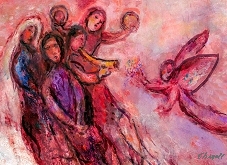
05.21.25 (Iyyar 23, 5785) Do you understand that in God's sovereign design and plan for creation, He breathed out a part of his very heart, soul, and strength to create you in his own "image and likeness," a reflection of his own self-existence and reality? This is the essential blessing that each of us has been given; this is the basis for awe. Rene Descartes' awareness of the inner witness of the soul: "I think therefore I am," echoes the אֶהְיֶה אֲשֶׁר אֶהְיֶה, "I am that I am," within our hearts. The LORD is the "God of the spirits of all flesh" (Num. 16:22) for "in Him we live and move and have our being" (Acts 17:28).
The moments of our lives, the ups and downs of our goings, the length of our days - and especially the purpose and end of our existence - are all in the hands of God, as it says: "In you I put my trust, O LORD; I said, 'You are my God; my times are in your hands" (Psalm 31:14-15). A person may "devise his own way," but it is the LORD that directs his steps.
If we consider our lives apart from God, however, all we see is wretchedness, limitations, shortness of days, and the absurd specter of death at the end of it all. Life always seems too short; the days fly past us like a dream, soon we are "cut off" and gone. When the moment of death occurs, many are lost to its eternal significance...
On the other hand, when we trust that our lives are under God's providential direction, and we realize that our Heavenly Father "numbers the hairs on our head," then we can quiet our hearts and abandon ourselves to his care (Isa. 46:8-10; Psalm 103:19). As it is written: "Those who trust in you know your Name; for you do not forsake those who seek you, O LORD" (Psalm 9:10). And as the Apostle Paul preached to the Athenians, "God, who alone is Creator, the Lord of heaven and earth, has given life and breath to all people, and from one man has made every nation of people to live on the earth, having determined prescribed times and the boundaries of their habitations" (Acts 17:24-26).
For the believer there is no greater comfort than to completely trust that the LORD will work "all things together" for our ultimate good (Rom. 8:28). "Whoever lives and believes in me shall never die" (John 11:26). Yet there is a veil. "God has made every thing beautiful in his time, and he has set eternity in people's hearts, so that no one can find out what he has ordained from the beginning to the end" (Eccl. 3:11). So while we know only "in part," as through "a glass darkly," we believe that the LORD goes before us and will always be with us (Deut. 31:8). And one day we shall see him "panim el-panim," face to face (1 Cor. 13:12). "Beloved, now are we the children of God, and it does not yet appear what we shall be: but we know that, when he shall appear, we shall be like him, for we shall see him as He is; and everyone that has this hope in Him is purified, even as he is pure" (1 John 3:2-3).
Χάριτι δὲ θεοῦ εἰμι ὅ εἰμι - "by the grace of God I am what I am" (1 Cor. 15:10). This is a radical axiom that should be foundational to our faith, namely that nothing occurs in our lives apart from God's will for our ultimate blessing. From small matters to big, from the seemingly insignificant to the momentous, from what seems hopelessly undone to the sheer miracle and glory of existence itself -- categorically everything, in every conceivable world, is under the sovereign hand of the One who works all things together for his glory and for our good. Amen. Yeshua "upholds all things" (φέρων τε τὰ πάντα) by the word of his power. "All things were created by him, and for him, and in him all things hold together" (ἐν αὐτῷ συνέστηκεν). Our Lord is the "Magnetic Center" of all reality, its beginning and its end.
How could it be otherwise? For who can overrule the will of God our Creator and the LORD over all? "From eternity to eternity I am God. No one can snatch anyone out of my hand. No one can undo what I have done" (Isa. 41:13). "For the Lord of hosts has planned, and who can frustrate it? And as for His stretched-out hand, who can turn it back?" (Isa. 14:27).
Therefore do not be afraid. "For I know the thoughts that I think toward you, says the LORD, thoughts of peace and not of evil, to give you a future and a hope" (Jer. 29:11). As Yeshua said: "Fear not, little flock; for it is your Father's good pleasure to give you the kingdom" (Luke 12:32). Hallelujah! For the Lord our God, the Almighty, reigns!
Hebrew Lesson
Psalm 9:10 reading with commentary (click):
Remembering our Roots...
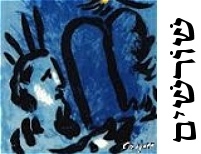
05.20.25 (Iyyar 22, 5785) How important are the Jewish roots of our faith? How important is our heritage in relation to our understanding of God's ways? Our Torah portion this week is called "Behar" from the phrase behar Sinai (בְּהַר סִינַי) found its opening verse (Lev. 25:1). But why does the word Sinai appear in a portion of Torah that discusses social and agricultural laws that were to be observed only later, in the promised land? What does the subject of the Sabbatical Year (shemittah) have to do with the revelation given at Sinai?
The sages say that the Sabbatical year was mentioned in connection with Sinai in order to teach that Moses received not only the Ten Commandments and the revelation of the Tabernacle there, but also specific laws regulating future social and economic practices of the people as well. The law of the Sabbatical year is a case in point, since it would have been absurd for a law that required farmers to abandon their farming practices once every seven years to have been proclaimed while the people were dwelling in the desert...
How important is tradition in our lives? So important that we could not understand even the first word of the Scriptures without it... There is a story that illustrates this point. A pagan came to Hillel seeking to convert to the faith in the LORD but was troubled with the idea of tradition, though he accepted the idea of the written Scriptures. Since the man did not know how to read Hebrew, however, Hillel began pointing to the letters in the written Torah to teach him the alphabet: "This is Aleph... this is Bet... this is Gimmel," and so on, until the man began to understand the letters of the Aleph-Bet. "Now come tomorrow, and I will teach you more." The next day, Hillel pointed to the exact same letters but reversed their names, "This is Gimmel... this is Aleph... this is Bet," and so on. The convert was confused: "But yesterday you said just the opposite!" Hillel replied, "Now you have had your first lesson. You see that the written word alone is insufficient, and we need the tradition to explain God's Word." Another way to make this point is to say that the Torah was not revealed along with a dictionary that defines the meaning of its words...
I mention this to remind us that the transmission of Torah from generation to generation demands that we trust. Indeed the very concept of "Torah" (or Scripture) is bound up with trust and community... This is true of the written word (i.e., trusting in scribal traditions that preserved the Scriptures for us), as well as the oral word (i.e., the customs, interpretations, translations, and wisdom that explain the meaning of the words themselves). Knowledge has been defined as "justified true belief," which implies that there can never be knowledge without trust. It is ludicrous to think that we can translate the Scriptures in a vacuum - all by ourselves without any help from others... We must humble ourselves and become "like little children" to learn from those who have gone before us, and this is why the Jewish value of Talmud Torah - teaching children the words and values of Torah - is regarded as so important. As the Talmud puts it, "The world exists because of the breath of the schoolchildren who study Torah" (Shabbat 119b).
But what about the words of the Holy Scriptures? Don't they transcend cultural factors? Are they not timelessly true and exempt from culturally conditioned ways of reading them? Not at all! Both Christianity and Judaism (as opposed to some other religions) do not worship a "book" that "floated down" from heaven complete with chapters and verses. Nor do we believe in a "divine dictation" theory that claims the Scriptures are "Xerox" duplicates of the words spoken by an angel or other divine being. No, the Scriptures are regarded as the products of history -- sacred history, of course -- but history nonetheless. Therefore we have the same problems trying to discern the meaning of the Scriptures as we do for any other type of literature: Who was the original author and the intended audience? What were the cultural circumstances? Why was this written? What kind of writing is it? Is it a poem (like a psalm), or perhaps an instructional maxim (like a proverb)? Am I reading an historical account, a description of a religious ritual, or something else? First we must know what we are reading - and to understand its historical context. Ignoring this simple rule leads to all sorts of errors in our reasoning and makes us unwitting victims of our own cultural biases. We will find ourselves "reading into" the Scriptures things that just aren't there, chaverim!
Regarding the literal words of the Scriptures, it's important to remember that the decisions made regarding which scrolls were "canonical" (and therefore to be included in our modern Bibles) came from the decisions made by earlier faith communities -- just as such decisions likewise preserved the sanctity of the sacred texts themselves. For instance, without the Jewish scribal transmission known as the masorah (מָסוֹרָה), it's unlikely we would know how to read and interpret many passages of Scripture today (Christianity also has its own scribal traditions that preserved the transmission of the Greek New Testament). Original Hebrew did not include vowel markings or other punctuation. Neither did the Greek of the New Testament, for that matter. Indeed, we can only understand the message of our faith through the medium of historical continuity, tradition, and ongoing dialog.... This was true even in the days of Yeshua, who endorsed the traditional tri-fold division of the Jewish Scriptures (the Law, Writings, and Prophets - Luke 22:44) and relied on Jewish tradition to teach great truths about his message (e.g., he associated the Passover seder with the "Last Supper" rituals of the New Covenant; he called himself Living Water and the Light of the world during Sukkot, and so on.) Yeshua placed high value on the "jots and tittles" of the texts of Scripture that were part of the spiritual heritage of his day (Matt. 5:18).
But didn't Yeshua condemn the "traditions of men" in His day? Didn't he reject the traditions of the elders of Israel (Mark 7:5-13)? Didn't he rhetorically ask the religionists of his day, "Why do you break the commandment of God for the sake of your tradition" (Matt. 15:2-10)? Yes he assuredly did, though it is important to understand the historical context of these sorts of statements. First, he was certainly not condemning "true traditions" that are commanded in the Scriptures themselves. Yeshua's entire ministry was predicated on the "appointed times" of the LORD and their fulfillment in him. "Do not think that I have come to abolish the Law or the Prophets; I have not come to abolish them but to fulfill them" (Matt. 5:17). Indeed, when he was asked what was the greatest commandment of God, Yeshua quoted the Shema: "Hear O Israel, the LORD is our God, the LORD alone; and you shall love the Lord your God with all your heart and with all your soul and with all your mind and with all your strength" (Mark 12:29-30), something Jewish tradition had affirmed since the time of Moses (Deut. 6:4-5). So no, Yeshua did not object to all traditions, but rather took issue with dogmatic interpretation of various aspects of ritual law and with the rabbinical interpositions that "built fences" around the simple meaning of the Scriptures. These man-made "fences" (i.e., gezerot) created unwarranted restrictions that obfuscated the teaching of Scripture and effectively relocated the source of interpretative authority to the religious leaders of the day... This was the crux of the disagreement between Yeshua and the Pharisees. (For more about this, see "The Heart of the Law; the Law of the Gospel".)
We all live by hours of the day, days of the week, seasons of the year, and God has revealed cycles and patterns of community life for Israel. Indeed, the mo'edim (festivals and appointed times) of the LORD are rooted in history and have prophetic implication for our lives. The "traditions of the elders" which Yeshua condemned had more to do with hidebound interpretations of the Scriptures (later embodied in the "Oral Law") than with the idea of tradition itself. The Greek word for "tradition" (παράδοσις) is a neutral term, simply meaning "handing down" (from παρά (down, from) + δίδωμι (to give)) what was given before. Both Judaism and Christianity hold to an "oral tradition" following the ministries of Moses and Yeshua, respectively. Because of the imminent expectancy of the return of Yeshua after His resurrection, the gospels were not committed to formal writing until the prospect of the death of the eyewitnesses loomed large. Moreover, there were numerous Gospel accounts which were eventually compiled into a standardized retelling of the story (Luke 1:1-4). In Jewish tradition, Moses received the written law at Sinai, but this cannot be understood in a vacuum. For instance, the details about how to construct the furnishings of the Tabernacle are not given, and the written law even endorsed the establishment of "judges" to interpret case law and establish precedent. Likewise the Apostle Paul admonished, "Therefore, brethren, stand fast, and hold the traditions (παράδοσις) which ye have been taught, whether by word, or our epistle" (2 Thess. 2:15, 1 Cor. 11:2). Indeed, in a New Testament sense, "tradition" refers to the Apostolic teaching in general, as well as the valid inferences from the Tanakh that are thereby implied (2 Tim. 3:16, Matt. 13:52).
There is legalism -- i.e., the idea that we are duty bound to perform certain rituals, behave a certain way, follow a set of rules, etc., and there is the liberty we enjoy as the heirs of God. There is a higher way of understanding the same thing -- namely understanding as an adult rather than as a child. Apprehending your identity as a son (or daughter) of the LORD God of Israel makes you no longer an outsider, a "child," an "outcast," etc., to the covenantal obligations and promises given to the Jewish people. As a co-heir and fellow member through adoption into the household of God, you are a new creation. Being a Jew is a matter of having a new heart, chaverim (Rom. 2:28-29).
Hebrew Lesson
Psalm 19:8 reading (click):
In Hebrew the word chinukh (חִנּוּךְ) means "education," a word that shares the same root as the word "chanukah" (חֲנֻכָּה, "dedication"). Unlike the Greek ideal that regards education as "enlightenment" (i.e., being "led out" of the cave of ignorance), the Jewish ideal implies dedication to God and His concrete purposes on the earth. This ideal goes beyond the process of merely transmitting information, since dedication must be modeled (lived) as well as intellectually taught. Maimonides noted that the Hebrew word chinukh comes from the Torah's description of dedicating a tool for use at the Holy Altar, "habituating the tool for its work." In other words, godly education is a process of modeling how to be made into a "fit vessel" for the service of God in this world. All other ends of knowledge ultimately exist for this purpose, and rightly understood, then, education may be regarded as a form of worship.
Disciples of Yeshua are called talmidim (תַּלְמִידִים) - a word that comes from lamad (לָמַד) meaning "to learn" (the Hebrew word for teacher is melamad (מְלַמֵּד) from the same root). Education is therefore foundational to being a disciple of the Messiah, and the great commission is for each of us to share His teaching with others (Matt. 28:19-20). May God help each of us to be students who are dedicated to living for the truth of Yeshua's Name.
Hebrew Lesson
Psalm 119:111 reading (click):
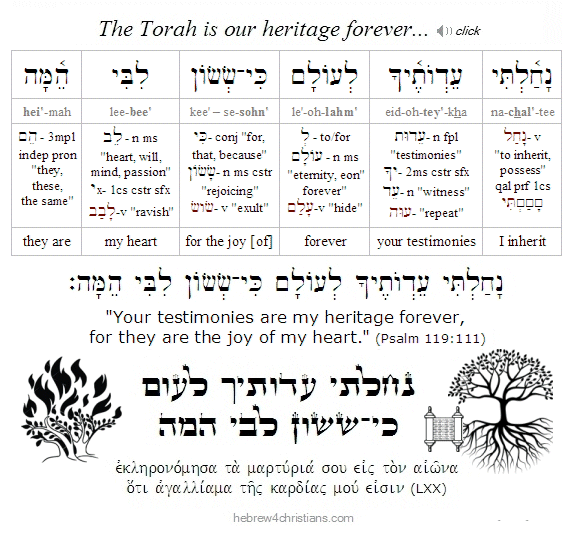 |
Related Audio:
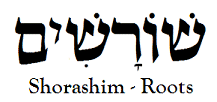
Let God, Let God...

05.20.25 (Iyyar 22, 5785) In our Torah for this week (i.e., parashat Behar), the LORD gave his people instructions about how they were to manage the promised land once they finally entered it. Instead of commanding the people to work hard to sustain themselves, however, God gave them laws of rest – of releasing their hold on the land (see Lev. 25:1-7). During the "Sabbatical years" (shemittah) the land was to lie fallow, and the people could eat only what was produced naturally, without any farming or organized harvesting.
Letting go of the land required the people to trust that God was in control of nature's creative processes, and to acknowledge that the process of growth is mysterious and divine. As Yeshua said: "The Kingdom of God (מַלְכוּת הָאֱלהִים) is like someone who spreads seed on the ground. He goes to sleep and gets up, night and day, and the seed sprouts and grows, though he does not know how. By itself (αὐτομάτη, i.e., "automatically") the soil produces a crop, first the stalk, then the head, then the full grain in the head. And when the grain is ripe, he comes in with his sickle because the harvest has come" (Mark 4:26-29). In other words, the "ordinary" process of the growth of a seed is miraculous and is a gift from above.
The "Torah of the Sabbatical Year" teaches us that creativity and fruitfulness requires that we let go and leave the outcome to God.
Hebrew Lesson
Psalm 116:7 reading (click):
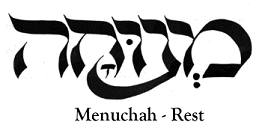
What is Jerusalem Day?
 |
Yom Yerushalayim, or "Jerusalem Day," begins Sunday, May 25th at sundown this year...
05.19.25 (Iyyar 21, 5785) In Israel, "Jerusalem Day" (i.e., Yom Yerushalayim: יום ירושלים) commemorates the re-unification of old city of Jerusalem on June 7th, 1967 during the Six Day War. In 1968 the Chief Rabbinate of Israel declared Iyyar 28 to be a holiday to thank God for answering the 2,000-year-old expression of hope recited by Jews throughout the world: "Next Year in Jerusalem." On March 23, 1998, the Knesset passed the Jerusalem Day Law, making it a national holiday. This year, Iyyar 28 runs from Sunday, May 25th (after sundown) through the following day.
Jerusalem is central to the Jewish heart. The Hebrew word "Zion" (ציון) is mentioned over 160 times in the Scriptures. That's more than the words faith, hope, love, and countless other key words... And since Zion is a poetic form of the word Jerusalem (ירושׁלם), the number of occurrences swells to nearly 1,000! Since it's the most frequently occurring place name in all the Scriptures, it's no overstatement to say that God Himself is a Zionist.... "Out of Zion, the perfection of beauty, God shines forth" (Psalm 50:2). "The LORD loves the gates of Zion more than all the dwellings of Jacob. Glorious things are said of you, O City of God" (Psalm 87:2-3). Indeed, Yeshua called Jerusalem the "City of the great King" (Psalm 48:2; Matt 5:35): It is the place where He was crucified, buried, resurrected, and ascended to heaven; and is it furthermore the place where He will return to earth (Zech. 14:1-9).
In light of all this, how can we forget Zion, "the city of the living God, the heavenly Jerusalem" (Heb. 12:22)? Is she not "our mother" (Gal. 4:26)? Are we not her citizens, indeed, her exiles in this age? As the psalmist said, "If I forget you, O Jerusalem, let my right hand forget its skill! Let my tongue stick to the roof of my mouth, if I do not remember you, if I do not set Jerusalem above my highest joy!" (Psalm 137:5-6).
The famous words, "Pray for the peace of Jerusalem" (Psalm 126:6) reveals prophetic truth about our Savior and Messiah. The word sha'alu (שאלו) means "you ask" (as in ask a sheilah, a question), and the word shalom (שׁלוֹם) is the name of Yeshua, the Prince of Peace (i.e., Sar Shalom: שר־שלום). The word "Jerusalem" means "the teaching of peace" (jeru- comes from the same root as the word Torah [ירה], which means "teaching"). The command, "sha'alu shelom Yerushalayim" can therefore be construed, "ask about the Prince of Peace and His Teaching." Amen. Yeshua the Messiah is indeed the rightful King of Jerusalem (Matt. 5:35) who is coming soon to establish Zion and to reign over all the earth (Isa. 62:7).
Hebrew Lesson
Psalm 122:6 reading (click):
Mem B'Omer:
The Ascension of Yeshua...
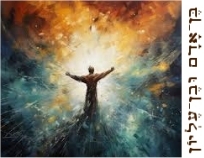
Thursday, May 22nd after sundown marks the 40th day of the Omer Count....
05.18.25 (Iyyar 20, 5785) Exactly forty days after his resurrection, on Mem B'Omer (see Acts 1:3), Yeshua met with his disciples at the Mount of Olives near Jerusalem, where he told them they would receive the promised Holy Spirit at the appointed jubilee of Shavuot (i.e., "Pentecost"). Upon his departure he blessed them, and Yeshua began to "ascend" bodily into heaven, thus signifying the close of his ministry on earth ("God with us") in anticipation of the advent of the Holy Spirit ("God in us"). [Note that in the New Testament, the account of the ascension of Yeshua is found in Luke 24:50-51 and Acts 1:3-11)].
The ascension of the Messiah fulfills prophecy as the glory of Yeshua enthroned at the right hand of the Father (Psalm 110:1; Matt. 22:41-46; 26:64), and therefore it marks the transition from his earthy ministry back to his heavenly one, and this is important because it annulled any further claim that Yeshua would physically visit people on earth until the parousia, or the second coming (note that Apostle Paul had encountered Yeshua after the ascension via visions, and not true physical contact in the earthly realm (see Acts 9:1-19; Gal. 1:11-2:1; 1 Cor. 15:8). The ascension signified the triumph of Yeshua as the "Son of Man" when he physically entered into the heavenly realm. It was not merely the spirit of Messiah that ascended to glory, but redeemed humanity that he represented in his resurrected body. The ascension eternally vindicates the salvation of God in Yeshua.
But why 40 days? And what was Yeshua doing during this time? Frankly we don't know the details, though "40 days and nights" represents a period of completeness in the Scriptures. For instance, the cataclysmic judgment during the time of the great flood (Gen. 7:1), the embalming of Jacob (i.e., Israel) in Egypt (Gen. 50:3), the two occasions Moses ascended Sinai to receive the Torah (Exod. 24:18; Exod. 34:28), the intercession Moses made on behalf of Israel (Deut. 9:25); the mission of the spies who searched out the land (Num. 14:34), and Yeshua's temptation before he began his public ministry (Matt. 4:2; Mark 1:13) as well as his post-resurrection appearances (Acts 1:3) - all were 40 days in duration.
What is spiritually vital about all this, however, is that our Lord, the "Final Adam" (῾Ο ἔσχατος ᾽Αδὰμ, 1 Cor. 15:45) is now seated at the right hand of God (Psalm 110:1), forever enthroned as the Savior and LORD over all, the King of Glory (מֶלֶךְ הַכָּבוֹד) who has successfully completed his great mission to save humanity from the curse of death because of the original transgression in the garden (Rom. 5:12-21; 1 Cor. 15:21-22).
It was prophesied of our Lord Yeshua in Psalm 68:19 - "You have ascended to the highest (עָלִיתָ לַמָּרוֹם); You have taken captives out of captivity (שָׁבִיתָ שֶּׁבִי); You have acquired gifts for men (לָקַחְתָּ מַתָּנוֹת בָּאָדָם), yea, even for the rebellious (וְאַף סוֹרְרִים), that the LORD God may dwell among them (לִשְׁכֹּן יָהּ אֱלֹהִים). The apostle Paul later quoted this verse and applied it to the victory of Yeshua at the cross, explaining that He had first descended at his death and burial but later ascended far above all (Eph. 4:8-10; Col. 2:15). By delivering captive sinners from their captivity to Satan, the LORD bestowed gifts of the Spirit and eternal life to all who believe. Praise his name forever!
About Mem B'Omer...
We are in the midst of the 49 day "countdown" that runs from the day following the Passover until the day before the holiday of Shavuot ("Weeks" or "Pentecost"). This seven week period is called "Counting the Omer" (ספירת העומר) in the Torah (Lev. 23:15-16). During the Temple period, on each of these days an appointed priest would wave a sheaf (omer) of barley before the LORD as a symbolic gesture of dedicating the coming harvest to Him. This ceremony was called tenufat ha-omer ("waving of the sheaf"). On the 50th day, however, a sample of the first crop of the wheat harvest was baked into two loaves of leavened bread (called "Shtei Ha-Lechem," שׁתי הלחם) and waved before the altar as the climactic rite of the season (Lev. 23:15-20). Notice that this was the only time that otherwise forbidden leaven was used by the priests for the avodah (see Lev. 2:11).
 |
The 49 days between Passover and Shavuot forms a "chain" that links the two festivals together, and indeed Shavuot is regarded as the culmination of the experience of redemption, sometimes called Atzaret Pesach (עצרת פסח), or the "Conclusion of Passover." Just as the redemption by the blood of the lamb led to Israel's deliverance and the giving of the Torah at Sinai, so the redemption by the blood of Yeshua led to the world's deliverance and the giving of the Holy Spirit at Zion... And just as the covenant at Sinai created the nation of Israel, so the covenant at Zion created the worldwide people of God, redeemed from "every tribe and tongue" (Rev. 5:9). The waving of the "two loaves" of leavened bread therefore prophesied the creation of the "one new man," both Jew and Gentile, that would "firstfruits" of the Kingdom of God. In the Sovereign plan of God Almighty, ultimately there would be one flock, and one Shepherd for all God's children (John 10:16).
Since the resurrection of Yeshua occurred during the first day of the omer (i.e., on Firstfruits, or Yom HaBikkurm), and the Holy Spirit was given to the disciples 50 days later on Shavuot (Pentecost), all of Yeshua's post-resurrection appearances occurred during the days of the Omer count. Some of these appearances were as follows: On the first day of the Omer, Yeshua appeared to Mary Magdalene (Mark 16:9; John 20:16-18), some other women (Matt. 28:5-10), and then to Simon Peter (Luke 24:34; 1 Cor. 15:5). On the second day, He appeared to the two on the Road to Emmaus (Luke 24:13-32) and later that evening to the twelve disciples (Mark 16:14; Luke 24:33-39; John 20:19). A week later, He appeared to the Twelve again (John 20:26) and eight days later appeared to Thomas (John 20:24-29). Some time later, He appeared the third time to the disciples as they went back to their fishing jobs (John 21:1-14). Sometime later Yeshua appeared to 500 (1 Cor. 15:6) and then to James, the half-brother of our Lord Yeshua (1 Cor. 15:7). On Iyyar 25, or the 40th day of the Omer (called Mem B'Omer: מ"ם בעומר), Yeshua ascended into heaven from Bethany and commanded His followers not to leave Jerusalem until the promise of the Father was fulfilled during Shavuot (see Luke 24:44-53; Acts 1:9-11; Eph. 4:8).
The ascension of Yeshua (עליית ישוע) was foreshadowed by Moses and the receiving of the Torah at Sinai: Just as Moses had waited 40 days before the Torah was given to Israel, so the disciples waited 40 days before the promise of the Holy Spirit was given (Exod. 24:18; John 16:7, Acts 2:1-4). In both cases, at the appointed time revelation was given -- first in the form of "the Voice of the Living God speaking from the midst of the fire" at Sinai (Deut. 5:26), and later in the form of "tongues of fire" given in glory and power. Yeshua's Voice is now heard from the midst of the fire given at Zion...
Hebrew Lesson
Psalm 47:5 reading (click):
Why the Ascension Matters...
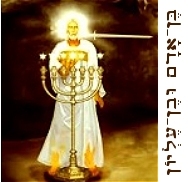
- The ascension of Yeshua (i.e., aliyat Yeshua: עליית ישוע) demonstrates that he is now glorified at "the right hand of God" (יושב לימינו של אלוהים), the place of supreme honor, ever making intercession for his people based on his resurrection victory over the power of sin and death (Mark 16:19; Eph. 1:20; Rom. 8:34; Heb. 1:1-3; Heb. 7:25; Heb. 9:24; Col. 3:1). Yeshua is the Ascended LORD, El Elyon (אֵל עֶלְיוֹן) and the great High Priest (הכהן הגדול הגדול) of the New Covenant of God. His ascension to heaven indicates his exclusive role as the sole Mediator between mankind and God (מֵתוֹוֵךְ בֵּין אלהים אֱנוֹשׁוּת). ῾Ο ἔχων τὸν υἱὸν ἔχει τὴν ζωήν· ὁ μὴ ἔχων τὸν υἱὸν τοῦ θεοῦ τὴν ζωὴν οὐκ ἔχει (1 John 5:12). "Whoever does not honor the Son does not honor the Father who sent him" (John 5:23). Some people wonder where Yeshua is today. The ascension answers that question: He is presently in heaven making intercession for those who are trusting in Him, and he is also giving humanity further time to turn to him for life before he returns to earth to judge the world in fulfillment of his promise.
- The ascension moreover reveals the success of Yeshua's earthly ministry as the only true Redeemer of humanity (Acts 4:12, 1 Tim. 2:5). He alone is the way, the truth, and the life of God (John 14:6). ישוע הוא הדרך היחידה לחיים Everything that Yeshua had come to do he had accomplished, and the ascension signifies the perfection of his victorious redemption. He finished the work that the Father send him to do. Upon His ascension, Yeshua commisioned the Holy Spirit (רוּחַ הַקּדֶשׁ), the "Comforter" or "Advocate" (παράκλητος), who would give his followers divine counsel and guidance until He returns for his people at the end of the age (John 16:7).
- The ascension of Yeshua establishes his everlasting enthronement as the one and only King of Glory (מֶלֶךְ הַכָּבוֹד). His dominion is forever established as "an everlasting dominion, which shall not pass away, and his kingdom one that shall not be destroyed" (Dan. 7:13-14; Rev. 5:6-13). God's moral authority is eternally sure.
- The ascension of our Lord Yeshua foreshadows the final event in salvation history: Yeshua's personal, physical, glorious return (Acts 1:11). This is what we ask for when we pray, "Thy kingdom come, Thy will be done, on earth as it is in heaven" (Matt. 6:10). El Elyon (אֵל עֶלְיוֹן), the Ascended God, will return as the true Judge and King over all the earth. He will establish universal justice, end suffering, and destroy the power of death as he sets up the promised Kingdom of Zion (מַמְלֶכֶת צִיּוֹן) in fulfillment of the words of the Hebrew prophets. Yeshua is coming to vindicate Israel and to heal the nations by establishing truth, righteousness and love in the world. Amen.
- Theology is about the issues of life. The resurrection and ascension make us "alive together" with the Messiah. Because of Yeshua, we are able to live on a different level of reality, free from the "law of sin and death" (Rom. 7:4, 8:2). We now have a new and living relationship with God - based on the freedom and intimate revelation given by the Holy Spirit - all because of our ascended Lord Yeshua, blessed be He.
- Yeshua told His followers that it was good that he would leave them, so that the Holy Spirit (רוּחַ הַקּדֶשׁ), the "Comforter" or "Advocate," would be given to them. "But I tell you the truth, it is for your advantage that I am going away. For if I do not go away, the Advocate (ὁ παράκλητος) will not come to you, but if I go, I will send him to you" (John 16:7). Notice that the word translated as "advantage" here is the Greek word συμφέρω (from σύν, "with" and φέρω, "to carry"), which suggests that we would be given power that "carries us" with the Lord during the trials of this life...
The ascension of Yeshua (עליית ישוע) was foreshadowed by Moses and the receiving of the Torah at Sinai: Just as Moses had waited 40 days before the Torah was given to Israel, so the disciples waited 40 days before the promise of the Holy Spirit was given (Exod. 24:18; John 16:7, Acts 2:1-4). In both cases, at the appointed time revelation was given -- first in the form of "the Voice of the Living God speaking from the midst of the fire" at Sinai (Deut. 5:26), and later in the form of "tongues of fire" given in glory and power. Yeshua's Voice is now heard from the midst of the fire given at Zion...
O friends, how we need the Spirit of God to strengthen us! During this season, may our hearts cry out: בו רוח אלהים - bo, Ruach Elohim: "Come, Holy Spirit." Help us, O God, be your witnesses in this end-times generation. Amen.
Hebrew Lesson:
Psalm 110:1 reading (click):
Note: For more information, see "Mem B'Omer and the Ascension of Yeshua."
Parashat Behar:
Shemittah and "Jubilee" Years...
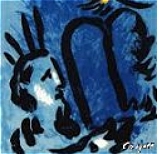
05.18.25 (Iyyar 20, 5785) This week we have another "double portion" of Torah, friends. Our first Torah portion is called parashat Behar (פרשׁת בהר) which begins with the commandment that an Israelite farmer must let his land rest by remaining fallow every seventh year. This is called the "Sabbatical year" (i.e., shemittah: שְׁמִטָּה, "release") and the inhabitants of the land were permitted to glean whatever the farmland produced naturally.
In addition, the people were told to count seven cycles of seven years – a total of 49 years – and to mark the arrival of the fiftieth year with blasts of the shofar on the Day of Atonement (Yom Kippur). This fiftieth year would be a time of "Jubilee" (i.e., yovel: יוֹבֵל) – a year of "release" for the land and all its inhabitants. All slaves would be set free, debts would be canceled, and the stewardship of the land would revert to its original titleholders.
In this connection, you might wonder how to determine whether a given year is a Sabbatical year (i.e., shemittah). The procedure is simple: Take the current Jewish year and divide by seven; if there is no remainder, it is a shemittah year; otherwise it is not. For example year 5784 is not a Sabbatical Year, whereas year 5789 is a Sabbatical Year (note that the Jewish year begins on Rosh Hashanah, on Tishri 1, in the fall). The Jubilee year (yovel) of course follows the seventh of the seven year cycles (i.e., 7 x 7 + 1), though there are some questions about which iteration (1st, 2nd, 3rd... 99th) is currently active. According to some authorities, the last Jubilee year was on Yom Kippur 5776, that is, Tues. Oct. 11th, 2016, so the next would be 50 years later (i.e., in the year 5826).
Parashat Bechukotai:
The Question of Obedience...
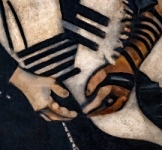
05.18.25 (Iyyar 20, 5785) Our second Torah reading for this week, called parashat Bechukotai (פרשׁת בחקתי), is the final portion of the central book of the Torah (i.e, Leviticus), and it begins with the promise that if the Israelites would walk in the LORD's statutes (chukkot) and commandments (mitzvot) and perform them, then they would enjoy material blessings and dwell securely in the promised land. Moreover the LORD Himself would make His dwelling with them and would walk among them as their God. The people of Israel would then truly be am segulah (עַם סְגֻלָּה) - a treasured people among all the nations of the earth.
On the other hand, if the people disobeyed God and disregarded His commandments, then they would be considered covenant-breakers, and they would experience all manner of distress and tribulation in their lives. They would experience panic attacks, diseases, heartache, and all manner of tsuris (vexation, trouble); their enemies would eat their increase, and those who hate them would rule over them; they would flee at the rustle of a leaf, and their lives would be full of terror and misery – all because they refused to put the LORD God first in their lives. And if after all this trouble the people would still refuse to return to the LORD, the worst punishment of all would befall them: exile from the promised land and banishment from the Presence of the LORD Himself.
Nonetheless, despite their disobedience, God's love and mercy for Israel would never fully depart, for "if they confess their iniquity and the iniquity of their fathers in their treachery that they committed against me, and also in walking contrary to me, so that I walked contrary to them and brought them into the land of their enemies – if then their uncircumcised heart is humbled and they make amends for their iniquity, then I will remember my covenant with Jacob, and I will remember my covenant with Isaac and my covenant with Abraham, and I will remember the land" (Lev. 26:40-42). Moreover, even while they are in exile, in the land of their enemies, God vowed: "I will not cast them away; nor will I ever abhor them to destroy them and to break My covenant with them; for I am the LORD their God" (Lev. 26:44).
The portion (and the Book of Leviticus) ends with a discussion of various laws pertaining to vows and tithes that a person may make to contribute towards the upkeep of the Sanctuary. These include dedications of persons, animals, houses, and lands. The scroll of Leviticus ends with the emphatic statement: "These are the commandments that the LORD commanded Moses for the people of Israel on Mount Sinai" (Lev. 27:34).
Unsupposed Blessedness...
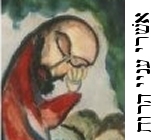
"The first shall be last and the last shall be first..."
05.16.25 (Iyyar 18, 5785) Yeshua began his great "Sermon on the Mount" with what have been called the "Beatitudes," that is, a series of pronouncements about what constitutes the good or blessed life from God's perspective (Matt. 5:1-12; Luke 6:20-26). What is noteworthy about this litany of blessedness is the "transposition" or reversal of the ideals of humanism that assumed by worldy culture. Contrary to such thinking Yeshua extols the "poor in spirit," those who know themselves as "afar va'efer" (עפר ואפר) - dust and ashes - and who are conscious of their need for deliverance from themselves. This is the starting point, the awareness of their poverty and sickness of heart, for without this confession, they cannot know God's unconditional goodness.
"My eye grows dim through sorrow; every day I call upon you, O LORD; I spread out my hands to you... Help me, O LORD my God; save me according to your love" (Psalm 88:9; 109:26). Such words pierce through the clichés and chatter about religion, theology, and so on, voicing the lament of a soul in trouble, desperately crying out to God for help...
The language of prayer is quickened by affliction and trouble, for the heart senses it must find God or die. "The troubles of my heart are enlarged..." (Psalm 25:17). "Heal me, O LORD, and I will be healed..." for if you will not help, O Lord, then I will perish; I will be consumed in my grief, I will waste away in the void of darkness... "Why is my pain unceasing, my wound incurable, refusing to be healed? Will you be to me like a deceitful brook, like waters that fail?" (Jer. 15:18). O Lord, "I am poor and needy; my heart is pierced within me" (Psalm 109:22).
During hours of pain or mental anguish prayer becomes spontaneous, raw, unscripted and devoid of empty words. Anguish moves us right to the point, bypassing other concerns, distilling the heart's cry for God's help. If you feel overwhelmed, pour out your heart in prayer... It is not the words of the prayer that matter as much as it is the fervor, the intensity of the heart, and the passion that yields itself before God. "Blessed are they that mourn, for they shall be comforted" (Matt. 5:4). "The LORD is near to the broken of heart and saves the contrite of spirit" (Psalm 34:18).
צָרוֹת לְבָבִי הִרְחִיבוּ
מִמְּצוּקוֹתַי הוֹצִיאֵנִי
tza-roht · le-va-vee · heer-chee'-voo
mee-me-tzoo-ko-tai · ho-tzee-ei'-nee

"The troubles of my heart are enlarged;
O bring me out of my distresses."
(Psalm 25:17)

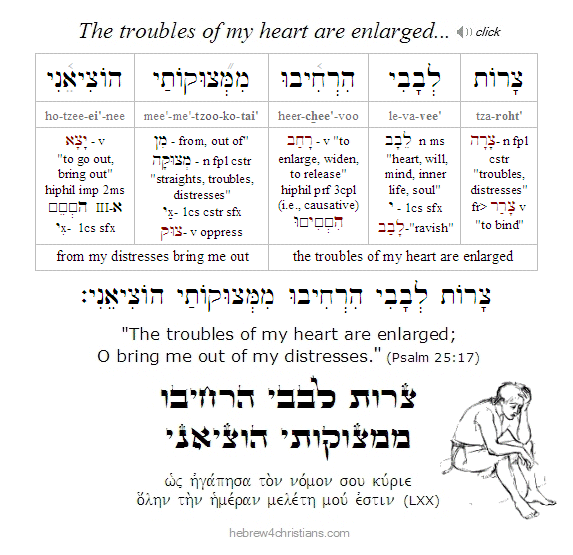 |
There is a "transposition" of values, a "holy irony," in the realm of the Spirit. From God's perspective that which considered great in the eyes of men is considered of little account, and that which is considered insignificant in the eyes of men is considered of great importance (Luke 9:48). The wisdom of this world (i.e., pragmatic, self-promoting egotism, etc.) is regarded as folly before God (1 Cor. 1:20, 3:19). Therefore Yeshua "made himself nothing" and disguised himself in the form of a lowly servant (ἀλλὰ ἑαυτὸν ἐκένωσεν μορφὴν δούλου λαβών). Unlike various systems of religion that attach merit and status to those who have attained "respectable levels" of personal sanctity, those who are called "great" in the Kingdom of Heaven will be identified as the servants of all (Mark 9:35; 10:44). Like the hidden light of the menorah in the Tabernacle, the deeds of the humble are beheld inwardly, where the Heavenly Father sees in secret (Matt. 6:4). As Yeshua Himself said, כִּי מַלְכוּת הָאֱלהִים בְּקִרְבְּכֶם / "The Kingdom of God is within you" (Luke 17:21).
"Blessed are those who weep while the world is laughing, for theirs is the kingdom of heaven; blessed are the meek, for they shall overcome; blessed are those who realize they know little, for they shall find treasure; blessed are those who realize they are unrighteous, for they shall find healing; blessed are the misfits who are disowned by the world as fools, for they shall find mansions in heaven; blessed are the weak, for they shall be made strong; blessed are those who weep, for they shall obtain eternal consolation; blessed are those who refuse to assimilate into this world and its idols, for they shall be called victors in the world to come..."
God turns everything "upside down," for what is esteemed in this world is regarded as vanity in the world to come, and vice-versa. The Scriptures teach, "Light is sown for the righteous (tzaddikim), and joy for the upright (yashar) in heart" (Psalm 97:11). May it please the LORD God to renew our courage to live wholeheartedly according to His truth, and to resist the pressure to conform to the idolatry of this world. Shabbat shalom chaverim...
Sanity and Spiritual Warfare...

"We do not wrestle against flesh and blood ... but against spiritual forces of evil." (Eph. 6:12)
05.16.25 (Iyyar 18, 5785) Though the Scriptures teach that the realm of the demonic exists, we usually encounter its presence in thoughts and feelings that seduce and ultimately torment us. That is where the battle begins. In the mind. The monster that tempted Eve in the Garden got into her head before she bit into the fruit from the forbidden tree. And unless we are on guard against insinuations of godless insanity, we are liable to be under its influence as well...
You might think that demonic oppression is something flamboyant or that requires the ministrations of an exorcist, but long before such intervention may be necessary, the mind has been captivated by evil and deranged thinking. Such thinking may have its origins with a demons named "worry," or "shame," or "unworthiness" or "envy." But a common strategy of the devil is to supply "plausible" ideas that are designed to deceive us and lead us astray.
Everyone is a theologian of sorts. The difference, however, is whether you are a good theologian or one who is swamped with muddled thinking about the issues. As C.S. Lewis once said, "Good philosophy must exist, if for no other reason, because bad philosophy needs to be answered. The cool intellect must work not only against cool intellect on the other side, but against the muddy heathen mysticisms which deny intellect altogether. Most of all, perhaps we need intimate knowledge of the past."
The devil doesn't care if it is a "holier-than-thou" theology, a murky mysticism of "absolute tolerance," or a smarmy disavowal of faith in God altogether --- he is equally pleased with the sensualist as well as the atheist, indeed, he is content with any distortion of the truth, for this enables him to "feed" his deluded ego as the "Prince of Darkness."
In a way, dealing with evil thinking is commonplace and rather unremarkable. After all, the airwaves of mass media continually disseminate lies, disinformation, and damnable thinking in countless formats and by various diabolical stratagems. Whenever we encounter the demonic affecting us, then, we should not panic or be scandalized, but instead reaffirm the truth of God and resolutely submit to his will (James 4:7). Sometimes this means contradicting the lies by quoting Scripture, offering praise to the Lord, and asking our Heavenly Father for deliverance. In extreme cases, it may be necessary to command the evil spirits to silence their blasphemies and to cease their intrusions.
If we find ourselves going out of control emotionally, we are giving ground to the devil. The best tactic is to stay calm and re-center our focus on the Lord who is always present (Psalm 16:8). Let us be sober and awake for the battle (1 Pet. 5:8); let us put on the "whole armor of God" (Eph. 6:11). Remember that "salvation" (σωτηρία) means attaining a "safe" (σάος) mind, set free from deception and insanity.
There is shalom - that is, healing, wholeness, and soundness of mind - as we retain awareness of the greatness and the beauty and the glory of our God. Think on these things. "My brethren, be strong in the Lord, and in the power of his might." Amen.
Hebrew Lesson
Psalm 3:3 Hebrew reading (click):
The Seeking Heart...
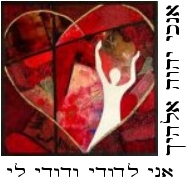
Seek first God's Kingdom, that is, become like the lilies and the birds, become perfectly silent — then shall the rest be added unto you." - Kierkegaard
05.16.25 (Iyyar 18, 5785) Some people think of "purity of heart" in moral terms, such as not looking with lust on others, not coveting, etc., though these are really symptoms of disordered love... Genuine purity is a matter of focus, making a decision to believe the miracle in order to find the "good portion" and the "one thing necessary" (Luke 10:42). We "believe to see" (Psalm 27:13). Purity of heart therefore realizes that all that you've ever longed for is found in God alone. "There is but one good; that is God. Everything else is good when it looks to Him and bad when it turns from Him" (C.S. Lewis). It is a great, great gift from heaven to know God as your heart's true desire - to fully understand that your relationship with Him is the ultimate concern and very treasure of your existence.
It is the Spirit that gives life (John 6:63). The Holy Spirit imparts the "pulse" of the Divine Life, and we gain newness of life when we trust God for purification from our sins through Yeshua our LORD. As King David further attested: Lev tahor bara li Elohim – "Create in me a clean heart, O God" and renew a spirit of 'yes' within me (Psalm 51:10). Only the new heart (lev chadash) created by the agency of God's Spirit can possibly yield the life of the Spirit within us. The miracle of a new heart transforms your whole inner nature - with the impartation of new appetites, new passions, new desires, and the rebirth of your will.
If you struggle with being inwardly divided, conflicted, or lacking in courage, ask the LORD to give you true purity of heart, a heart that wholeheartedly wills the highest... As Yeshua attested: "Blessed are the pure in heart, for they shall see God" (Matt. 5:8).
Hebrew Lesson:
Matthew 5:8 reading (click):
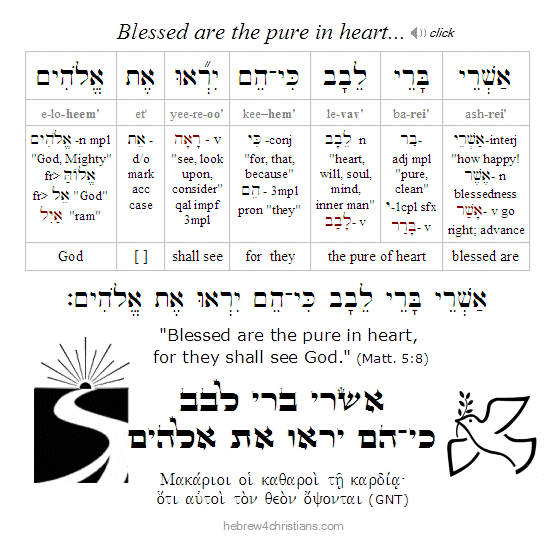 |
The Eyes of the LORD...
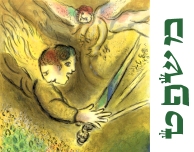
05.15.25 (Iyyar 17, 5785) There is a story about how the Baal Shem Tov once hired a wagon driver to take him to a nearby village. On the way, the two men passed by a field laden with luscious produce. The driver stopped the wagon, turned to the Baal Shem Tov - whose identity he did not know - and said with a wicked grin, "I'm going to fetch us some good vegetables from that field now. You be on the lookout. Call out if you see anyone!"
Just as the driver bent down to pick some vegetables, the Baal Shem Tov screamed, "We're seen! We're seen!" The frightened man then ran back to the wagon and raced away. After traveling some distance he turned around and realized that no one was following them. "Why did you call out like that?" he chided the rabbi. "There was nobody watching." The Baal Shem Tov then pointed upward and said: "God was watching; God is always watching, as it's written: 'The eyes of the LORD are in every place, observing the evil and the good.'"
Hebrew Lesson
Proverbs 15:3 reading (click for audio):
Healing the Outsider...
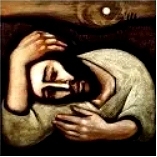
05.14.25 (Iyyar 16, 5785) Our Torah portion this week (Emor) tells the disturbing story of a man who was executed for blasphemy (see Lev. 24:10-16). We are told that two people, one of whom was described generally as "an Israelite man," and the other as the "son of an Israelite woman" named Shelomit (שְׁלמִית), who was apparently married to an Egyptian man, got into a fight in the middle of the camp. Sometime during the fight, the son of the Israelite woman "blasphemed" God's Name and cursed. As a result, the man was brought to Moses who then asked God what was to be done. The LORD answered by commanding that those who heard the man blaspheme should personally lay their hands on his head and then the entire community was to stone the man to death...
The sages wonder what might have drove this man to revile God's Name, and they first note that since he was a son of an Egyptian man and an Israelite woman, he was essentially a Jew without a tribe. Moreover, since the right to inherit derived from the father, this man would have had no hope of inheritance in the promised land, no "place" among the people of God... Shelomit was from the tribe of Dan, and the midrash says that her son had appealed to the tribal leaders to provide him with a sense of identity and belonging. Sadly, he was refused, and his hurt and anger at being treated as an outsider eventually led to the fight "in the middle of the camp." Some of the sages place the blame for this man's death on those who refused to help him, since they refused to make him feel like a "member of the tribe." These people should have welcomed him as a brother and remembered their hardship as slaves and strangers in Egypt. Because of their hardness of heart, however, the man was abandoned, and this eventually led to his self-destructive actions. The sages note that the LORD required that the accusers were to first lay hands on this "unnamed man" to make them confront the fact that they were also responsible for his death.
Did you know that one of the most frequently occurring commandments is for the Jew to love the stranger? The commandment is repeated in various forms over 30 times in the Jewish Scriptures, for instance "You shall love your neighbor as yourself: I am the LORD" (Lev. 19:18); "You shall treat the stranger who sojourns with you as the native among you, and you shall love him as yourself, for you were strangers in the land of Egypt: I am the LORD your God" (Lev. 19:34); "Love the stranger, therefore, for you were sojourners in the land of Egypt" (Deut. 10:19); "You shall not wrong a sojourner or oppress him, for you were sojourners in the land of Egypt" (Exod. 22:21); "When a stranger sojourns with you in your land, you shall not do him wrong" (Lev. 19:33); "Do not oppress the stranger" (Zech. 7:10); "Cursed be anyone who perverts the justice due the stranger" (Deut. 24:19); "The stranger shall be as the native born children of Israel among you" (Ezek. 47:22), and so on. Clearly the LORD does not want people to feel ostracized, excluded, out of place, or otherwise left out of His providential and loving plans... Indeed, the message of the universal love of God is at the heart of the gospel itself, harkening back to God's earliest promises to redeem humanity and restore paradise lost. "Religion," tribalism, prejudice, ethnic pride, and so on, are anathema to the Kingdom of God.
Jewish tradition says that King David was born on Shavuot, the holiday of shtei ha-lechem, the "two loaves" that prophetically foretold of the advent of the "one new man" (Eph. 2:14-22) and of the mysterious inclusion of the Gentiles into the covenant promises of God (Eph. 3:6). God has a great compassion for the outsider, for the lost, and for those who are without inheritance in this world. During Shavuot it is customary to read the Book of Ruth which tells the story about redeeming love and the advent of King David. Recall that King David was a direct descendant of Ruth, who as a Moabitess was an outsider and "stranger" to the promises of God (Ruth 4:17). Despite being part of an despised and rejected group of people (see Deut. 23:3), Ruth overcame the law's demand by believing in the love and acceptance of a redeemer of Israel (Ruth 3:9). Ruth's great grandson was named David (דָוִד), meaning "beloved," which has the same numerical value as the word "hand" (יָד). It is no wonder that the LORD chose David to represent God's extended hand of love for the stranger, for the convert, for the outsider, the leper, and the lost, since his descendant Yeshua the Messiah came to love and redeem the entire world by means of His outstretched hand. "Blessed be the Name of the LORD."
"I was a stranger and you welcomed me" (Matt. 25:35). We are commanded (i.e., blessed) to practice ahavat ha'geir (אהבת הגר), the "love of the stranger." This means showing compassion and empathy to an "outsider" who may question their worth and place in your midst... On a somewhat deeper level, the duty to "love the stranger" applies not only to someone whom we regard as an "outsider," but more radically to the "stranger within ourselves," that is, to those aspects of ourselves we censor, deny, or reject. Self-hatred is a spiritual dead-end, chaverim.... Like the prodigal son, we have to "come to ourselves" to return home (Luke 15:17), yet we can't know that we are unconditionally loved until we venture complete disclosure and seek acceptance - despite the mess of our lives. That is the great risk of trusting in God's love for your soul. Those parts of ourselves that we "hide" need to be brought to the light, healed, and reconciled. After all, if we don't find healing for our self-rejection and pain, how can we hope to love and accept others? Dear Lord, deliver us from the torment of self-hatred, in the Name and passion of your love, amen.
Hebrew Lesson
Exodus 12:49 reading (click):
Addendum
The first time the word "Torah" (תּוֹרָה) occurs in the Bible refers to the faith of Abraham (see Gen. 26:5), and the second time refers to the law of Passover: "There shall be one teaching (Torah) for the native and for the stranger" (Exod. 12:49). There is a link here. Abraham lived before the time of the Exodus, of course, and therefore he observed Passover by offering the lamb in place of his son (Gen. 26:5). Abraham revealed that the inner meaning of Torah is that the "righteous shall live by faith" (Hab. 2:4, Rom. 1:17) and that God justifies the sinner who trusts in him (Heb. 11:17-19; Rom. 4:5). During the Exodus from Egypt, Moses declared that the blood of the Passover lamb would be a "sign" of imputed righteousness secured by faith - with no "leaven," or human works, added. This is the "life-for-life" principle that underlies the sacrificial system of the Tabernacle revealed at Sinai as well. Ultimately all true Torah points to Yeshua, the Lamb of God (שֵׂה הָאֱלהִים), who died upon the cross for our offenses and was raised again for our justification (Rom. 4:25).
 |
Consolation in Grief...
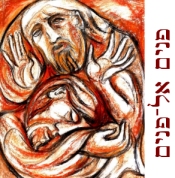
05.14.25 (Iyyar 16, 5785) Just a quick personal update, friends. I've been living in an emotional fog the last year or so, grieving, soul-searching, feeling strong one day, the next day like I am falling to pieces... The holidays have been especially hard. I don't sleep much; I am riddled with various pains. I sometimes review the past to understand what has happened but find no resolution. Despite the ambiguity and heartache, I nevertheless "remember the future" and the precious promises of God. In my tears there is hope.
Is the Lord present in the midst of the messiness of my life? Is he teaching me through godly sorrow to more fully surrender to Him? I know Him to be patient and kind, merciful and gracious, despite my omnipresent shortcomings and smallness of faith. I seek His consolations as am covered with sadness like a shroud. When I get exhausted over myself, I pray silence; my heart is renewed as I know he always at my right hand.
"Blessed be the God and Father of our Lord Yeshua the Messiah, who is the Father of Mercies (אַב הָרַחֲמִים) and God of all Comfort (וֵאלֹהֵי כָּל נֶחָמָה), the One who comforts us in all our affliction, so that we may be able to comfort those who are in any affliction, with the comfort with which we ourselves are comforted by God" (2 Cor. 1:3-4). Amen.
Thank you for your prayers and support as I continue to press on in ministry, trusting in God's healing love and grace, and eagerly awaiting the day we shall all see Him face to face. May that day come soon! Amen. - John
Faith without Fear...

He said unto me, "My grace is sufficient for thee (דַּי לְ חַסְדִּי), for my strength is made perfect in weakness." Therefore I will boast all the more gladly of my weaknesses, so that the power of Messiah may rest upon me... for when I am weak, then I am strong. - 2 Cor. 12:9-10
05.14.25 (Iyyar 16, 5785) The Spirit of the LORD speaks to the heart of faith: "Fear not, for I have redeemed you; I have called you by name, and you are mine" (Isa. 43:1). God has personally redeemed you, friend; he calls you by name, and you belong to Him. The Lord loves you with an everlasting love (אהבת עולם) and draws you close (Jer. 31:3). He will never leave nor forsake you, even if you might face waters that seem to overwhelm or fires that seem to devour (Isa. 43:2). The will of your Heavenly Father will never lead you to a place where his love will not there sustain you. Faith finds its place in God's heart.
Worry is a place of exile and pain. We are commanded, al tira, "fear not," because fear was behind the original sin in the garden, just as mistrust lies behind our own hiding and self-imposed exile from God... Since sin expresses a heart of fear (Rom. 14:23), the way of healing is to courageously turn back to God, despite our uncertainties. We can trust God's love for us because of the cross of Yeshua our Lord. If we haven't received God's love and acceptance, we are still enslaved to fear and abide in a state of exile. The love of God casts out our fear because it casts out all our sins (1 John 4:18).
It is written, "God has not given us the spirit of fear, but of power and of love, and of a "sound mind" (2 Tim. 1:7). Memorize that verse. The Greek word for "sound mind" means "safe" because of the power and grace of the Living God... If you sense fearful oppression within your heart, turn to the Lord and offer him focused praise. Lift up your soul to him and thank him for your trouble. This has the double benefit of confessing your trust in God's care, as well as vexing the enemy of your soul. Come boldly to the throne of grace to find your help (Heb. 4:16); cast all your anxiety on him, for he cares for you (1 Pet. 5:7).
The Name of the LORD (יהוה) means "Presence" and "Love" (Exod. 3:14; 34:6-7). Yeshua said, "I go to prepare a place for you," which means that his presence and love are waiting for you in whatever lies ahead (John 14:1-3; Rom. 8:35-39). To worry is to "practice the absence" of God instead of to practice His Presence... Trust the word of the Holy Spirit: "For I know the plans I have for you, declares the LORD, plans for healing peace and not for evil, to give you a future and a hope (Jer. 29:11).
Take comfort that your Heavenly Father sees when the sparrow falls; he arrays the flower in its hidden valley; and he calls each star by name. More importantly, the Lord sees you and understands your struggle with fear... Come to him with your needy heart and trust him to deliver you from the burdens of your soul (Matt. 11:28).
Hebrew Lesson
Isa. 43:1b reading (click):
Inner Transformation...

05.14.25 (Iyyar 16, 5785) The fact that God knows the number of hairs on your head is just to say that he knows you better than you know yourself... Your heavenly Father "sees in secret," and that also means that he can and will save you from whatever is hidden within you that still resists his love and touch... We have to trust in God's power to heal us, even when it seems that healing is not forthcoming, even when we still find ourselves divided, troubled, and anxious. We have to believe that God's help is always present. "Be strong, and let your heart take courage, all you who hope for the LORD."
God sees what He does within us, His "it-is-finished" work, the effect of His great salvation within our hearts, even if at this present hour this may be hidden from our eyes... There is appearance, and there is reality; and only God sees what is ultimately real. We have to trust in His promise to be transformed into the divine nature, even if today we find ourselves sinful, needy, and in disrepair... By God's grace we are what we are. So don't give up. We are saved by hope (ἐλπίδι ἐσώθημεν, Rom. 8:24), a hope for you today.
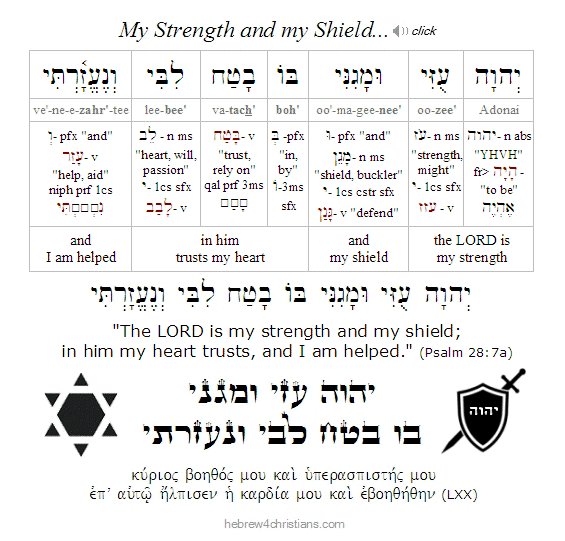 |
Made Whole by Faith...

05.13.25 (Iyyar 15, 5785) It is written in our Scriptures: "A double-minded man is unstable in all his ways" (James 1:8). Many people may have acquaintance with the teachings of Yeshua but hesitate when it comes to making the decision to believe in him... They may show some interest in matters of faith; they may even read the Bible and occasionally pray, and yet they continue on as before, even growing old without resolving whether or not to embrace the Lord. Sadly many remain unresolved as long as they live...
It is not easy to trust God in the midst of affliction, temptation, and sorrow. It may be easy to "profess" faith, but it's quite another to truly live it. On the other hand, it's harder still to be skeptical, to withhold the decision to believe, and to live in the chaos of being "two-souled" (δίψυχος) - a life of contradiction and instability. Indeed the "double-minded" person is lost to himself, uncertain of who he really is, why he was created, where he is going, and whether he is ultimately to find peace at the end of his wandering. Such a life is never at rest, "ever learning but unable to come to the full knowledge of the truth." As Soren Kierkegaard once wrote: "There are two ways to be fooled. One is to believe what isn't true; the other is to refuse to believe what is true."
God is near; he is not far from each one of us. "Draw near to God and he will draw near to you; purify your hearts, you double-minded" (James 4:8). Amen. Take hope. "The LORD is near to all who call on Him, to all who call on Him in truth" (Psalm 145:18).
Hebrew Lesson
Psalm 145:18 Hebrew reading (click):
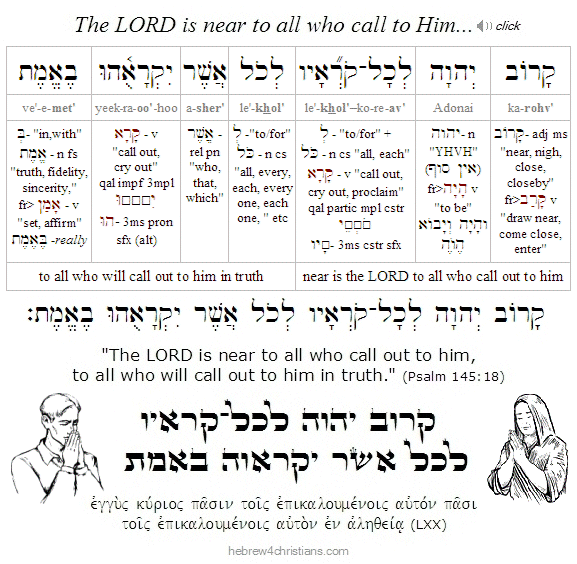 |
Sanctifying God's Name...

05.13.25 (Iyyar 15, 5785) From our Torah this week (Emor) we read: "You shall not profane my holy Name, that I may be made sacred among the people of Israel" (Lev. 22:32), which the early sages said provides the basis for "kiddush HaShem" (קידוש השם), or the duty to always honor God, even if that might mean enduring martyrdom for your faith....
Jewish halakhah (law) furthermore says we are to think of kiddush hashem whenever we recite the Shema, and that our inmost intent should be self-sacrifice (mesirat nefesh), or the willingness to give up our lives to God in complete surrender. After all, if we are not willing to give up our lives for God, how can we be willing to genuinely live for him? The purpose or goal of our very existence is to know and love God, to be sanctified in truth, but if we value our carnal lives on earth as more important, we exist in a state of contradiction. Therefore people obsessed with their own physical safety, health, pleasure, happiness, well-being, etc., do not know the true meaning of life...
Our lives on this earth were not meant to be an end in themselves, but rather a means to the greater end of knowing and loving the Eternal God. Indeed, God's love is better than any sort of life this present world can afford. As Jim Elliot once said, "He is no fool who gives what he cannot keep to gain what he cannot lose."
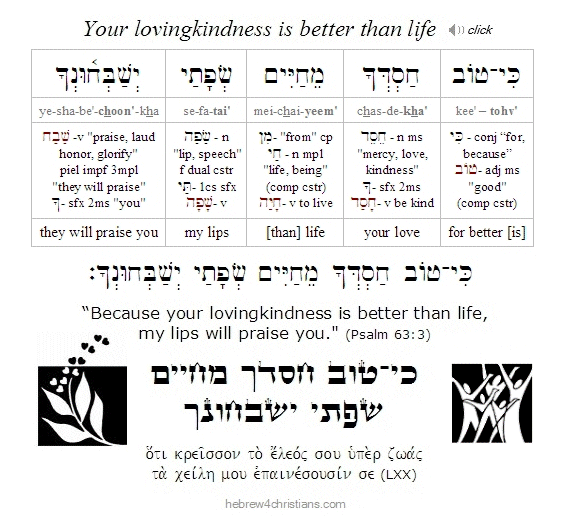 |
Sanctifying God's Name means that we regard our relationship to God to be an end in itself - our ultimate concern - and there is nothing higher that may challenge our duty before heaven. "Seek first the kingdom of God and his righteousness" (Matt. 6:33). Our mortal life in this fleeting world is a means to the end of reaching our eternal destiny (Psalm 16:11), and esteeming the means above the end is therefore idolatry (Rom. 1:25). This is called chillul HaShem (חילול השם), or profaning the Name of God...
Faith in the LORD may lead us into collision with the world and its spurious power structures, however "we ought to obey God rather than men" (Acts 5:29). Taking a stand for the truth of God will make you an outsider to the "crowd" and its endless idols and vanities. Indeed a person of genuine moral conviction may be labeled an "enemy of the state," may be persecuted as a "terrorist," and may even suffer martyrdom.
Shadrach, Meshach, and Abednego rightfully defied the king's decree to bow down before the "golden image," and confessed that they were willing to die rather than betray the truth of the LORD of Israel (see Dan 3). This is a prime example of kiddush HaShem, honoring the truth of God even at the risk of losing our lives. For many Jews, reciting the Shema is a solemn declaration that we esteem the truth of God above all things, that God alone is our ultimate good, and that we must be willing to surrender our lives rather than to deny the greatness and glory of His Name. Many tzaddikim have died with the Shema on their lips...
Kiddush HaShem may be understand both literally and metaphorically. Literally understood, kiddush HaShem (i.e., martyrdom) is a possibility, one of the severest tests that may be given to the soul, and the temptation is to shrink back from the threat of death by denying the faith... Metaphorically understood, kiddush HaShem is a necessity, an essential act of the will that decides to "take up the cross" and follow Yeshua, and the temptation is to minimize the truth, to compromise the faith, and thereby to slowly fade away...
In this connection Yeshua asks, "What will it profit a person if he gains the whole world and forfeits his soul?" (Mark 8:36). Indeed, finding your life, value, and "place" here is to exile yourself from the promise of heaven. As Yeshua said, "Whoever finds his life will lose it, and whoever loses his life for my sake will find it" (Matt. 10:39). What is required, in other words, is categorically everything, with nothing left over. As Dietrich Bonhoeffer reminds us: "Salvation is free, but discipleship will cost you your life."
We see an example of both chillul HaShem and kiddush HaShem in the life of the Apostle Peter. On the one hand, though he had boldly professed that he would be willing to die for Yeshua, he later denied that he knew his Savior (Luke 22:33-34). After doing teshuvah (i.e., repentance) however, Peter became wholehearted and fearless, and Christian tradition says he eventually died as a martyr under the tyranny of wicked Emperor Nero...
Likewise, in our effort to relate to people of different faith, we may be tempted to downplay the demands of the gospel or to minimize the full deity of Messiah. Sadly I've seen this happen among Gentiles so enamored with the Jewish roots of the faith that they begin to question, then to deny the central truth of our Messiah (the deeper law of mercy). We must not confuse the covenants of God, for this leads to double-mindedness which is regarded as "spiritual adultery" (see Rom. 7:1-4). It is chillul HaShem - the desecration of the Name of God - to turn away from the meaning and message of the cross of Messiah (Gal. 6:14; 1 Cor. 2:2). The price of being loyal to Messiah is mesirut nefesh (מְסִירוּת נֶפֶשׁ) -- surrendering your life by "taking up the cross." The cross is a scandal to religion and all other attempts to whitewash the truth about the human condition (Gal. 5:11).
In the Kaddish we read: "yitgadal ve'yitkadash shemei rabba," meaning "may God's great Name be magnified and sanctified." Amen, and may we honor and sanctify the presence of the LORD by turning to Him with all our heart, soul, and strength, knowing Him in all our ways. He is faithful and will help us sanctify His Name...
Hebrew Lesson
Deut. 6:4 reading with comments (5 min audio):
Transformed by Love...
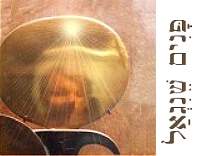
05.12.25 (Iyyar 14, 5785) How do we change? How are we made new? Is it through self-effort? making resolutions? changing our diet or wardrobe? going into counselling? joining a "religion" and practicing its sacraments? Or do we change by the miracle of God's compassionate intervention in our lives? When Yeshua invites us to turn and come to Him, he wants us to awaken to something so valuable that we would be willing to give up everything in the world to take hold of it (Matt. 13:45-46). True spiritual transformation is not just about leaving your sin behind you (as good as that is), but is rather about discovering the glory of true and infinite life. It's about being the beloved...
God's love sees the hidden beauty, worth, and value of your life. "Again, the kingdom of heaven is like a merchant in search of fine pearls, who, on finding one pearl of great value, went and sold all that he had and bought it" (Matt. 13:45-46). You may be tempted to identify with the merchant and regard this parable as a challenge to give up everything to obtain the surpassing worth of the kingdom of heaven, but another way to understand it is to see God as the Merchant, the central character of the story.... Instead of you paying the great price for the pearl, turn the story around: God pays the price - and you are regarded as His choice pearl! You are a treasured possession, the "apple of God's eye..."
Hebrew Lesson
Psalm 17:15 Hebrew reading (click):
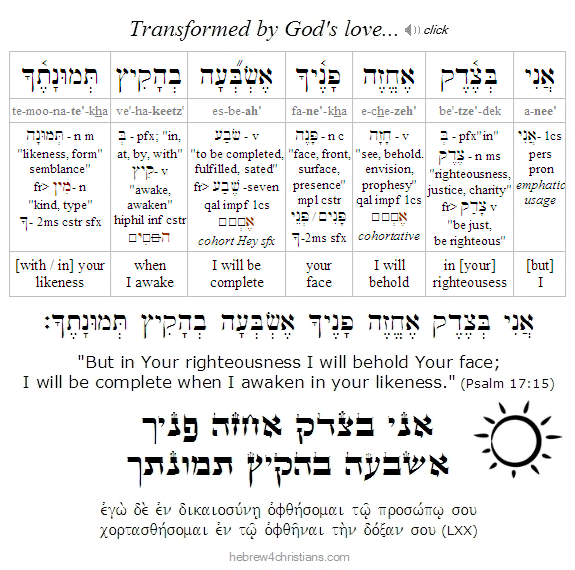
We are changed by the power of God's love, but this means that we must allow ourselves to be loved without attempting to earn it (Rom. 4). If we are willing to receive love only if we regard ourselves as worthy or deserving of it, then we will reinforce the illusion that love can be bought, explained, or owed to us based on our merit...
Have you discovered the glory and wonder of God's unconditional love, despite the many sins and the shame of your life? Do you know "in your gut" that his love means no longer having to defend or explain yourself? God's love enables you to quit hiding what you really are from Him; you can give up the pretense of being something you're not. When you turn to the Lord in the transparency of your brokenness, weakness, and neediness, you will find Him there, accepting you for who you really are...
That's the message of gospel, after all. The cross of Yeshua is the end of "self improvement" projects, and that includes the "end of the law" as the means of attempting to find our acceptance before God (Rom. 10:4). We come to know God's love and acceptance "apart from the law," that is, despite our repeated failures, pain, and loss of the false self. We are truly changed as we disclose more and more of what we really are to God, that is, when we come "out of the shadows" to be made visible and healed before His glorious Presence. Then we discover the "lightness" of being united to the risen Messiah and the "law of the Spirit of life in Yeshua (תּוֹרַת רוּחַ הַחַיִּים בְּיֵשׁוּעַ). May God work within us all such a miracle!
Perfection and Holiness...
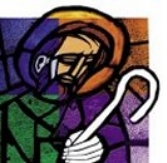
05.12.25 (Iyyar 14, 5785) Our Torah portion this week (i.e., parashat Emor) begins by explaining special requirements for Israel's priests, and then goes on to list the yearly cycle of Sabbaths and the seasonal festivals. First of all the priests (kohanim) were required to be "perfect," without any physical defect or uncleanness that might render them unfit for service. Everything about the priests – their clothing, hair style, skin condition, and especially their adherence to the meticulous steps required to offer the daily sacrifice (לֶחֶם אֱלהָיו) - was to be "defect free," and any deviation might incur the penalty of death itself (see Lev. 10:2; Num. 4:15, 2 Sam. 6:6-7). On the other hand, what sometimes disqualified a priest were things beyond his control, for instance, a variety of physical disabilities such as blindness, having a limp or disfigured limb, and so on (see Lev. 21:16-21).
Thinking about these requirements raises some provocative questions concerning the meaning of "perfection" in our lives, and particularly how we, as a deeply flawed people, can possibly be "perfect." The question is radical and affects how we are to understand practical holiness or the idea of "sanctification": Are we to seek to be perfect people, and if so, how do we understand what this means? Is our spirituality bound up with perfectionism, with flawless performance, and with always being and doing what is right?
In the Sermon on the Mount Yeshua warned that our righteousness should exceed that of the religious leaders of his day (Matt. 5:20), and he went on to say: "be perfect, as your heavenly Father is perfect" (Matt. 5:48). Here we note that the Greek word translated "perfect" (τέλειος) may mean "mature" or "fully developed" more than morally flawless, though regarding moral and spiritual practice this distinction is not clear cut, especially if by "mature" we mean godly in character, as the context of Yeshua's statement clearly implies (see Matt. 5:1-48). The Hebrew word translated as "perfect" (תָּמִים) can also mean "complete," but it can connote being "wholehearted," "sound," or even healed (שָׁלֵם). So the question arises, does the word "perfect" mean "flawless" or "healed" -- or perhaps both?
Of course we understand that only God alone is truly perfect (Deut. 32:4; Psalm 18:30), completely good (Matt. 19:17), flawlessly righteous (Psalm 145:17), entirely holy (Isa. 6:3; Rev. 15:4), and peerlessly unique (Exod. 15:11; Jer. 10:6-7), but how can we relate to God's overmastering perfection in the midst of our daily flaws and chronic imperfections? How dare we approach "to offer the bread of God" (Lev. 21:17)?
Followers of the LORD are called to be a nation of priests, a "select people," set apart to serve God in holiness (Exod. 19:5-6; 1 Pet. 2:9; Lev. 11:45), but it is clear we are blemished, imperfect, blind, halt, needy, and unclean... This is common to the human condition: all of us, Jew or non-Jew alike, are broken, flawed, and in the midst of the inevitable flow of life that leads to death and decay (Rom. 3:23). We are sick with sin and unable to heal ourselves, and therefore we need a radical transformation - "deliverance from ourselves" – that must come through divine intervention and the miracle of spiritual rebirth (John 3:3,7).
Nevertheless in this world the paradox still remains: we are finite yet long for the undying, the infinite; we are in flux yet anchored in hope; we are a "new creation" yet still saddled with the old nature; we are made holy yet we live in the midst of the profane; we are purified yet still need cleansing; we are healed yet are still wounded; we are redeemed of God yet still need to turn to God in teshuvah; we die daily yet have eternal life. Our hearts are to be a divine sanctuary, yet we are powerless to make God appear in our midst...
Perfection haunts us; we often defile the ideal with the real. Our romantic visions fail us; all of us are strangers, wanderers, in lonely exile. And the question then becomes – how do we embrace the "already-not-yet," the process, the fleeting days with their poignant moments – within the context of real hope, a vision that heals and brings us real comfort? How do we make peace with our imperfections, our present darkness, and our hunger for deliverance? How do we envision healing in the midst of our brokenness?
Ironically those defects that disqualify us as priests can be transformed (by grace) into compassion for others, and this can enable us to reach out to God in the midst of our flawed existence... After all, the deepest role of the priest is to draw others near to God, but this requires empathy and awareness of the needs of others. Therefore God clothed himself with our frailty, our infirmities, and the brokenness of our sin in order to redeem us in Yeshua. As it is written, we have a high priest who is able to sympathize (συμπαθέω) with our weaknesses (Heb. 4:15). The priest of the New Covenant is a mediator through through poverty of spirit and mourning (Matt. 5:3-8). Just as Joshua the high priest was graciously given robes of righteousness in exchange for his filthy garments (Zech 3), so we are given an imputed righteousness that comes through trusting in "the One who justifies the ungodly" (Rom. 4:5). "For our sake God made Him (i.e., Yeshua) to be sin who knew no sin, so that in him we might become the righteousness of God" (2 Cor. 5:21). This is a righteousness that is "apart from the law, though the law and prophets testified of it; namely, the righteousness of God given through the faithfulness of Yeshua the Messiah" (Rom. 3:21-22). Our present groaning for the complete deliverance is a gift given by the Spirit of God crying out within our hearts (Rom. 8:22-23).
C.S. Lewis once remarked, "God doesn't love you because you are good, but He will make you good because He loves you." This goodness is the miraculous inner working of an imparted godliness, the divine gift of a new heart and spirit (Ezek. 36:26). Awaken to your eternal perfection in the world to come: "You shall be perfect even as your heavenly Father is perfect" can be read as a prophecy.
Do not give up, friends; do not succumb to despair. We must learn to endure ourselves and believe in the healing to come. "Do not lose heart. Though our outer self is wasting away, our inner self is being renewed day by day. For this light momentary affliction is preparing for us an eternal weight of glory beyond all comparison, as we look not to the things that are seen but to the things that are unseen. For the things that are seen are transient, but the things that are unseen are eternal" (2 Cor. 4:16-18). And may God help us walk in perfect faith in His unfailing love (Phil. 3:14).
Hebrew Lesson
Ezekiel 36:26a reading (click):
Note: This topic was meant to provoke us to do some hard thinking and to raise some questions... Yeshua is our perfect "inner priest" who mediates God's love and holiness for us, of course. In Him alone we find peace with God and a place for perfection. Shalom.
Parashat Emor - פּרשׁת אמר
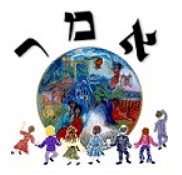
05.11.25 (Iyyar 13, 5785) Shalom chaverim. Our Torah portion for this week (parashat Emor) lists the eight main holidays revealed in the Jewish Scriptures. In the Torah, these "holidays" are called "appointed times" (i.e., mo'edim: מוֹעֲדִים), a word which comes from the Hebrew root meaning witness (עֵד). Other words formed from this root include edah (עֵדָה), a congregation, edut (עֵדוּת), a testimony, and so on. The related verb ya'ad (יָעַד) means to meet, assemble, or even to betroth. The significance of the holy days, then, is for the covenant people of the LORD to bear ongoing witness to God's love and faithfulness, as it is written in the Psalms, "All the paths of the Lord are compassion and truth to those keeping his covenant and his testimonies" (Psalm 25:10).
Hebrew Lesson
Psalm 25:10 reading (click):
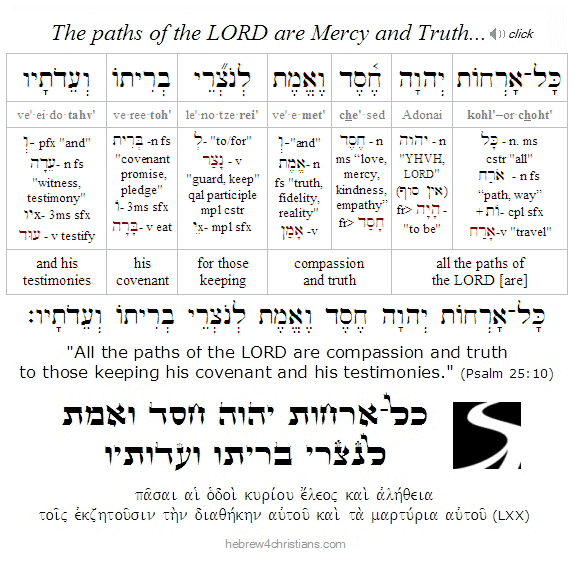 |
Metaphorically the "paths of the Lord" (i.e., orechot Adonai: ארחות יהוה) are likened to "ruts" or grooves created by the wheels of a caravan (i.e., orechah: ארְחָה) passing repeatedly over the same ground. These paths signify the Divine Presence journeying with God's children in this world. In temporal terms, we are able to discern the path by means of the divine calendar. God's love and faithfulness attend to His covenant (brit) and to the commemorations of the yearly "appointed times" that testify of God's faithful love. Keeping God's testimonies, then, means that we will be careful to observe the holidays in order to witness to God's truth...
The key verse in our reading focuses on the holidays of the calendar: "Speak to the people of Israel and say to them, 'These are the appointed times of the LORD (מוֹעֲדֵי יְהוָה) that you shall proclaim as holy convocations (מִקְרָאֵי קדֶשׁ); they are My appointed times'" (Lev. 23:2). Note that these hallowed times - the very first of which is the weekly Sabbath - are "of the LORD," and that means they should be regarded as appointments given by God Himself to help draw us closer to Him, to reveal His prophetic truth, and to remind ourselves of His great plan for our lives. God did not give us the Torah in vain, friends, neither does He speak out of two sides of his his mouth... Yeshua was the Voice of the LORD speaking the words of Torah to Israel at Sinai, and therefore every "jot and tittle" (קוֹצוֹ שֶׁל יוֹד) is indeed relevant to our lives as his followers (Matt. 5:18-19).
Note: May 2025 updates continue here.
Follow the site's progress:
Site Updates for 2025
Site Updates for 2024
Site Updates for 2023
Site Updates for 2022
Site Updates for 2021
Site Updates for 2020
Site Updates for 2019
Site Updates for 2018
Site Updates for 2017
Site Updates for 2016
Site Updates for 2015
Site Updates for 2014
Site Updates for 2013
Site Updates for 2012
Site Updates for 2011
Site Updates for 2010
Site Updates for 2009
Site Updates for 2008
Site Updates for 2007
Site Updates for 2006
Site Updates for 2005
Site Updates for 2004
Hebrew4Christians Forum
|



















































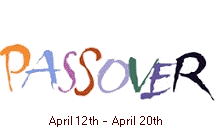

![Spring Holiday Timeline (H4C]](../../About_HFC/Site_News/roshchodeshim-line.gif)

